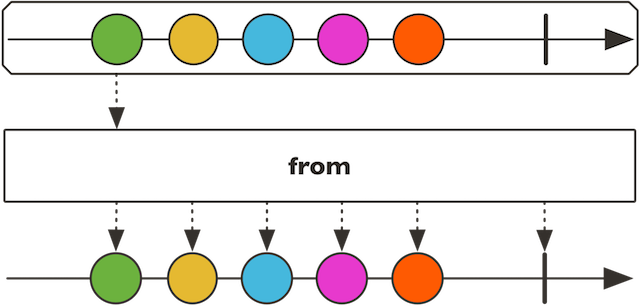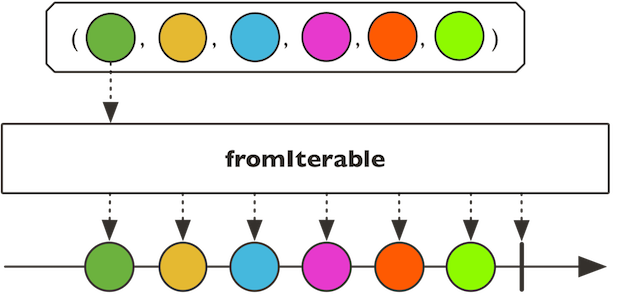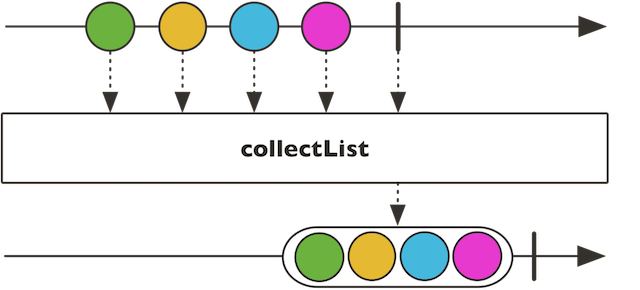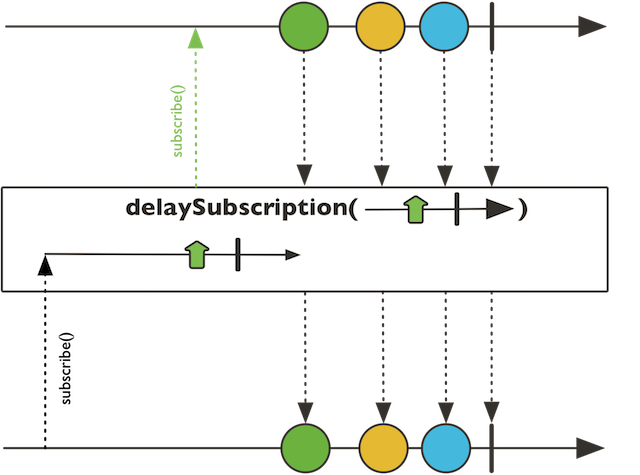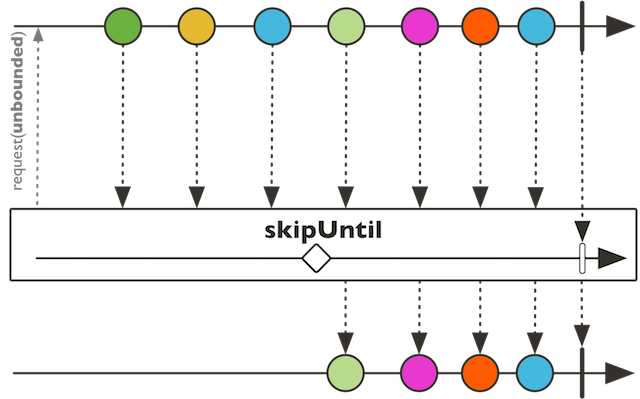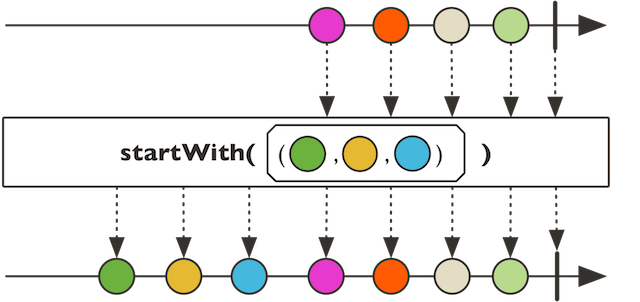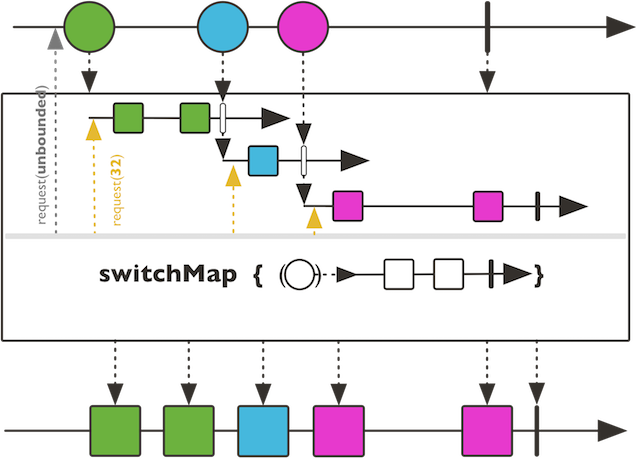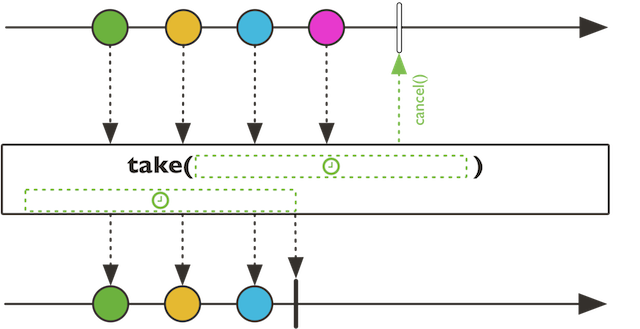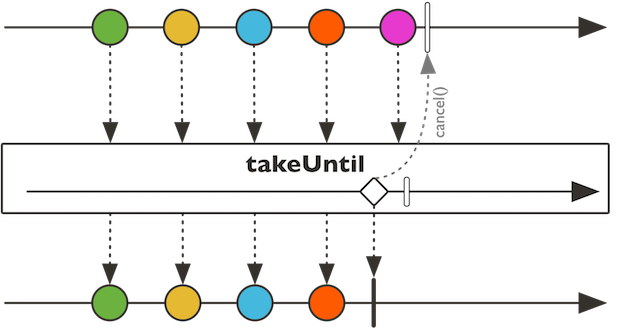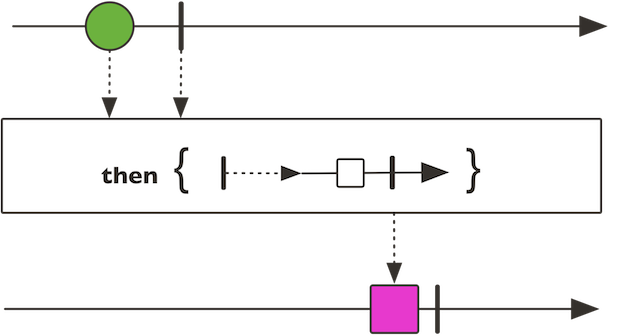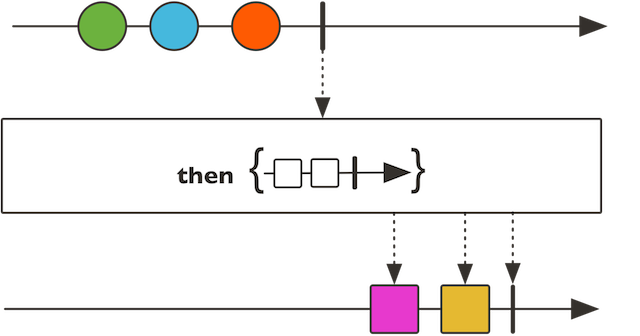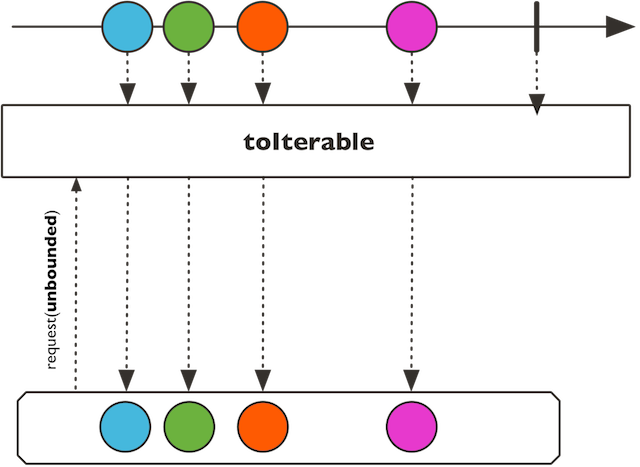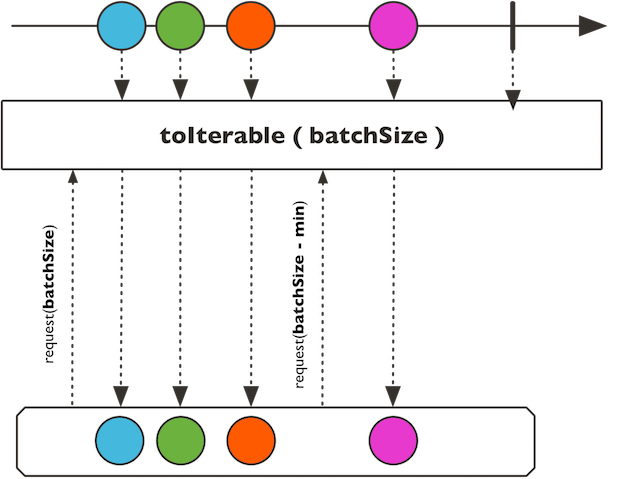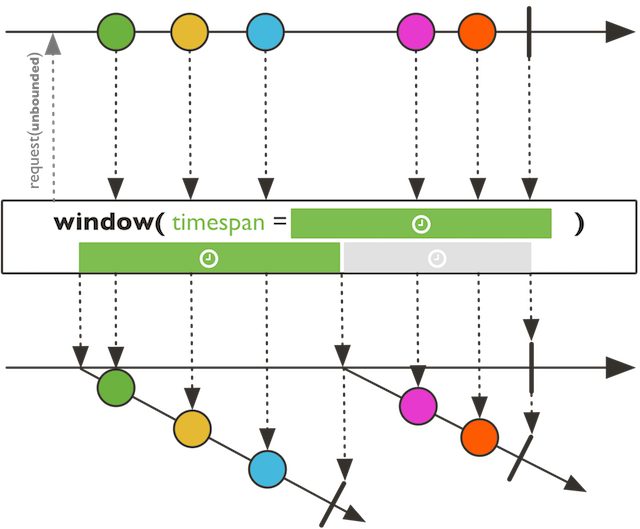- java.lang.Object
-
- reactor.core.publisher.Flux<T>
-
- Type Parameters:
T- the element type of this Reactive StreamsPublisher
- All Implemented Interfaces:
- Publisher<T>
- Direct Known Subclasses:
- ConnectableFlux, FluxOperator, FluxProcessor, GroupedFlux
public abstract class Flux<T> extends Object implements Publisher<T>
A Reactive StreamsPublisherwith rx operators that emits 0 to N elements, and then completes (successfully or with an error).
It is intended to be used in implementations and return types. Input parameters should keep using raw
Publisheras much as possible.If it is known that the underlying
Publisherwill emit 0 or 1 element,Monoshould be used instead.Note that using state in the
java.util.function/ lambdas used within Flux operators should be avoided, as these may be shared between severalSubscribers.subscribe(CoreSubscriber)is an internal extension tosubscribe(Subscriber)used internally forContextpassing. User providedSubscribermay be passed to this "subscribe" extension but will loose the available per-subscribe @link Hooks#onLastOperator}.- Author:
- Sebastien Deleuze, Stephane Maldini, David Karnok, Simon Baslé
- See Also:
Mono
-
-
Constructor Summary
Constructors Constructor and Description Flux()
-
Method Summary
All Methods Static Methods Instance Methods Abstract Methods Concrete Methods Modifier and Type Method and Description Mono<Boolean>all(Predicate<? super T> predicate)Emit a single boolean true if all values of this sequence match thePredicate.Mono<Boolean>any(Predicate<? super T> predicate)Emit a single boolean true if any of the values of thisFluxsequence match the predicate.<P> Pas(Function<? super Flux<T>,P> transformer)Transform thisFluxinto a target type.TblockFirst()Subscribe to thisFluxand block indefinitely until the upstream signals its first value or completes.TblockFirst(Duration timeout)Subscribe to thisFluxand block until the upstream signals its first value, completes or a timeout expires.TblockLast()Subscribe to thisFluxand block indefinitely until the upstream signals its last value or completes.TblockLast(Duration timeout)Subscribe to thisFluxand block until the upstream signals its last value, completes or a timeout expires.Flux<List<T>>buffer()Flux<List<T>>buffer(Duration timespan)Flux<List<T>>buffer(Duration timespan, Duration timeshift)Collect incoming values into multipleListbuffers created at a giventimeshiftperiod.Flux<List<T>>buffer(Duration timespan, Duration timeshift, Scheduler timer)Flux<List<T>>buffer(Duration timespan, Scheduler timer)Flux<List<T>>buffer(int maxSize)Flux<List<T>>buffer(int maxSize, int skip)<C extends Collection<? super T>>
Flux<C>buffer(int maxSize, int skip, Supplier<C> bufferSupplier)Collect incoming values into multiple user-definedCollectionbuffers that will be emitted by the returnedFluxeach time the given max size is reached or once this Flux completes.<C extends Collection<? super T>>
Flux<C>buffer(int maxSize, Supplier<C> bufferSupplier)Collect incoming values into multiple user-definedCollectionbuffers that will be emitted by the returnedFluxeach time the given max size is reached or once this Flux completes.Flux<List<T>>buffer(Publisher<?> other)<C extends Collection<? super T>>
Flux<C>buffer(Publisher<?> other, Supplier<C> bufferSupplier)Collect incoming values into multiple user-definedCollectionbuffers, as delimited by the signals of a companionPublisherthis operator will subscribe to.Flux<List<T>>bufferTimeout(int maxSize, Duration timespan)Flux<List<T>>bufferTimeout(int maxSize, Duration timespan, Scheduler timer)<C extends Collection<? super T>>
Flux<C>bufferTimeout(int maxSize, Duration timespan, Scheduler timer, Supplier<C> bufferSupplier)Collect incoming values into multiple user-definedCollectionbuffers that will be emitted by the returnedFluxeach time the buffer reaches a maximum size OR the timespanDurationelapses, as measured on the providedScheduler.<C extends Collection<? super T>>
Flux<C>bufferTimeout(int maxSize, Duration timespan, Supplier<C> bufferSupplier)Collect incoming values into multiple user-definedCollectionbuffers that will be emitted by the returnedFluxeach time the buffer reaches a maximum size OR the timespanDurationelapses.Flux<List<T>>bufferUntil(Predicate<? super T> predicate)Flux<List<T>>bufferUntil(Predicate<? super T> predicate, boolean cutBefore)<U,V> Flux<List<T>>bufferWhen(Publisher<U> bucketOpening, Function<? super U,? extends Publisher<V>> closeSelector)<U,V,C extends Collection<? super T>>
Flux<C>bufferWhen(Publisher<U> bucketOpening, Function<? super U,? extends Publisher<V>> closeSelector, Supplier<C> bufferSupplier)Collect incoming values into multiple user-definedCollectionbuffers started each time an opening companionPublisheremits.Flux<List<T>>bufferWhile(Predicate<? super T> predicate)Flux<T>cache()Turn thisFluxinto a hot source and cache last emitted signals for furtherSubscriber.Flux<T>cache(Duration ttl)Turn thisFluxinto a hot source and cache last emitted signals for furtherSubscriber.Flux<T>cache(int history)Turn thisFluxinto a hot source and cache last emitted signals for furtherSubscriber.Flux<T>cache(int history, Duration ttl)Turn thisFluxinto a hot source and cache last emitted signals for furtherSubscriber.Flux<T>cancelOn(Scheduler scheduler)<E> Flux<E>cast(Class<E> clazz)Cast the currentFluxproduced type into a target produced type.Flux<T>checkpoint()Activate assembly tracing for this particularFlux, in case of an error upstream of the checkpoint.Flux<T>checkpoint(String description)Activate assembly marker for this particularFluxby giving it a description that will be reflected in the assembly traceback in case of an error upstream of the checkpoint.Flux<T>checkpoint(String description, boolean forceStackTrace)Activate assembly tracing or the lighter assembly marking depending on theforceStackTraceoption.<R,A> Mono<R>collect(Collector<? super T,A,? extends R> collector)<E> Mono<E>collect(Supplier<E> containerSupplier, BiConsumer<E,? super T> collector)Collect all elements emitted by thisFluxinto a user-defined container, by applying a collectorBiConsumertaking the container and each element.Mono<List<T>>collectList()<K> Mono<Map<K,T>>collectMap(Function<? super T,? extends K> keyExtractor)<K,V> Mono<Map<K,V>>collectMap(Function<? super T,? extends K> keyExtractor, Function<? super T,? extends V> valueExtractor)<K,V> Mono<Map<K,V>>collectMap(Function<? super T,? extends K> keyExtractor, Function<? super T,? extends V> valueExtractor, Supplier<Map<K,V>> mapSupplier)<K> Mono<Map<K,Collection<T>>>collectMultimap(Function<? super T,? extends K> keyExtractor)<K,V> Mono<Map<K,Collection<V>>>collectMultimap(Function<? super T,? extends K> keyExtractor, Function<? super T,? extends V> valueExtractor)<K,V> Mono<Map<K,Collection<V>>>collectMultimap(Function<? super T,? extends K> keyExtractor, Function<? super T,? extends V> valueExtractor, Supplier<Map<K,Collection<V>>> mapSupplier)Mono<List<T>>collectSortedList()Mono<List<T>>collectSortedList(Comparator<? super T> comparator)Collect all elements emitted by thisFluxuntil this sequence completes, and then sort them using aComparatorinto aListthat is emitted by the resultingMono.static <T,V> Flux<V>combineLatest(Function<Object[],V> combinator, int prefetch, Publisher<? extends T>... sources)static <T,V> Flux<V>combineLatest(Function<Object[],V> combinator, Publisher<? extends T>... sources)static <T,V> Flux<V>combineLatest(Iterable<? extends Publisher<? extends T>> sources, Function<Object[],V> combinator)static <T,V> Flux<V>combineLatest(Iterable<? extends Publisher<? extends T>> sources, int prefetch, Function<Object[],V> combinator)static <T1,T2,V> Flux<V>combineLatest(Publisher<? extends T1> source1, Publisher<? extends T2> source2, BiFunction<? super T1,? super T2,? extends V> combinator)static <T1,T2,T3,V>
Flux<V>combineLatest(Publisher<? extends T1> source1, Publisher<? extends T2> source2, Publisher<? extends T3> source3, Function<Object[],V> combinator)static <T1,T2,T3,T4,V>
Flux<V>combineLatest(Publisher<? extends T1> source1, Publisher<? extends T2> source2, Publisher<? extends T3> source3, Publisher<? extends T4> source4, Function<Object[],V> combinator)static <T1,T2,T3,T4,T5,V>
Flux<V>combineLatest(Publisher<? extends T1> source1, Publisher<? extends T2> source2, Publisher<? extends T3> source3, Publisher<? extends T4> source4, Publisher<? extends T5> source5, Function<Object[],V> combinator)static <T1,T2,T3,T4,T5,T6,V>
Flux<V>combineLatest(Publisher<? extends T1> source1, Publisher<? extends T2> source2, Publisher<? extends T3> source3, Publisher<? extends T4> source4, Publisher<? extends T5> source5, Publisher<? extends T6> source6, Function<Object[],V> combinator)<V> Flux<V>compose(Function<? super Flux<T>,? extends Publisher<V>> transformer)static <T> Flux<T>concat(Iterable<? extends Publisher<? extends T>> sources)Concatenate all sources provided in anIterable, forwarding elements emitted by the sources downstream.static <T> Flux<T>concat(Publisher<? extends Publisher<? extends T>> sources)Concatenate all sources emitted as an onNext signal from a parentPublisher, forwarding elements emitted by the sources downstream.static <T> Flux<T>concat(Publisher<? extends Publisher<? extends T>> sources, int prefetch)Concatenate all sources emitted as an onNext signal from a parentPublisher, forwarding elements emitted by the sources downstream.static <T> Flux<T>concat(Publisher<? extends T>... sources)Concatenate all sources provided as a vararg, forwarding elements emitted by the sources downstream.static <T> Flux<T>concatDelayError(Publisher<? extends Publisher<? extends T>> sources)Concatenate all sources emitted as an onNext signal from a parentPublisher, forwarding elements emitted by the sources downstream.static <T> Flux<T>concatDelayError(Publisher<? extends Publisher<? extends T>> sources, boolean delayUntilEnd, int prefetch)Concatenate all sources emitted as an onNext signal from a parentPublisher, forwarding elements emitted by the sources downstream.static <T> Flux<T>concatDelayError(Publisher<? extends Publisher<? extends T>> sources, int prefetch)Concatenate all sources emitted as an onNext signal from a parentPublisher, forwarding elements emitted by the sources downstream.static <T> Flux<T>concatDelayError(Publisher<? extends T>... sources)Concatenate all sources provided as a vararg, forwarding elements emitted by the sources downstream.<V> Flux<V>concatMap(Function<? super T,? extends Publisher<? extends V>> mapper)<V> Flux<V>concatMap(Function<? super T,? extends Publisher<? extends V>> mapper, int prefetch)<V> Flux<V>concatMapDelayError(Function<? super T,? extends Publisher<? extends V>> mapper, boolean delayUntilEnd, int prefetch)<V> Flux<V>concatMapDelayError(Function<? super T,? extends Publisher<? extends V>> mapper, int prefetch)<V> Flux<V>concatMapDelayError(Function<? super T,Publisher<? extends V>> mapper)<R> Flux<R>concatMapIterable(Function<? super T,? extends Iterable<? extends R>> mapper)<R> Flux<R>concatMapIterable(Function<? super T,? extends Iterable<? extends R>> mapper, int prefetch)Flux<T>concatWith(Publisher<? extends T> other)Flux<T>concatWithValues(T... values)Concatenates the values to the end of theFluxMono<Long>count()Counts the number of values in thisFlux.static <T> Flux<T>create(Consumer<? super FluxSink<T>> emitter)static <T> Flux<T>create(Consumer<? super FluxSink<T>> emitter, FluxSink.OverflowStrategy backpressure)Flux<T>defaultIfEmpty(T defaultV)Provide a default unique value if this sequence is completed without any datastatic <T> Flux<T>defer(Supplier<? extends Publisher<T>> supplier)Lazily supply aPublisherevery time aSubscriptionis made on the resultingFlux, so the actual source instantiation is deferred until each subscribe and theSuppliercan create a subscriber-specific instance.Flux<T>delayElements(Duration delay)Flux<T>delayElements(Duration delay, Scheduler timer)Flux<T>delaySequence(Duration delay)Flux<T>delaySequence(Duration delay, Scheduler timer)Flux<T>delaySubscription(Duration delay)Delay thesubscriptionto thisFluxsource until the given period elapses.Flux<T>delaySubscription(Duration delay, Scheduler timer)Delay thesubscriptionto thisFluxsource until the given period elapses, as measured on the user-providedScheduler.<U> Flux<T>delaySubscription(Publisher<U> subscriptionDelay)Flux<T>delayUntil(Function<? super T,? extends Publisher<?>> triggerProvider)<X> Flux<X>dematerialize()An operator working only if thisFluxemits onNext, onError or onCompleteSignalinstances, transforming thesematerializedsignals into real signals on theSubscriber.Flux<T>distinct()For eachSubscriber, track elements from thisFluxthat have been seen and filter out duplicates.<V> Flux<T>distinct(Function<? super T,? extends V> keySelector)For eachSubscriber, track elements from thisFluxthat have been seen and filter out duplicates, as compared by a key extracted through the user providedFunction.<V,C extends Collection<? super V>>
Flux<T>distinct(Function<? super T,? extends V> keySelector, Supplier<C> distinctCollectionSupplier)For eachSubscriber, track elements from thisFluxthat have been seen and filter out duplicates, as compared by a key extracted through the user providedFunctionand by theadd methodof theCollectionsupplied (typically aSet).<V,C> Flux<T>distinct(Function<? super T,? extends V> keySelector, Supplier<C> distinctStoreSupplier, BiPredicate<C,V> distinctPredicate, Consumer<C> cleanup)For eachSubscriber, track elements from thisFluxthat have been seen and filter out duplicates, as compared by applying aBiPredicateon an arbitrary user-supplied<C>store and a key extracted through the user providedFunction.Flux<T>distinctUntilChanged()Filter out subsequent repetitions of an element (that is, if they arrive right after one another).<V> Flux<T>distinctUntilChanged(Function<? super T,? extends V> keySelector)Filter out subsequent repetitions of an element (that is, if they arrive right after one another), as compared by a key extracted through the user providedFunctionusing equality.<V> Flux<T>distinctUntilChanged(Function<? super T,? extends V> keySelector, BiPredicate<? super V,? super V> keyComparator)Filter out subsequent repetitions of an element (that is, if they arrive right after one another), as compared by a key extracted through the user providedFunctionand then comparing keys with the suppliedBiPredicate.Flux<T>doAfterTerminate(Runnable afterTerminate)Add behavior (side-effect) triggered after theFluxterminates, either by completing downstream successfully or with an error.Flux<T>doFinally(Consumer<SignalType> onFinally)Add behavior (side-effect) triggered after theFluxterminates for any reason, including cancellation.Flux<T>doOnCancel(Runnable onCancel)Add behavior (side-effect) triggered when theFluxis cancelled.Flux<T>doOnComplete(Runnable onComplete)Add behavior (side-effect) triggered when theFluxcompletes successfully.Flux<T>doOnEach(Consumer<? super Signal<T>> signalConsumer)Add behavior (side-effects) triggered when theFluxemits an item, fails with an error or completes successfully.<E extends Throwable>
Flux<T>doOnError(Class<E> exceptionType, Consumer<? super E> onError)Add behavior (side-effect) triggered when theFluxcompletes with an error matching the given exception type.Flux<T>doOnError(Consumer<? super Throwable> onError)Add behavior (side-effect) triggered when theFluxcompletes with an error.Flux<T>doOnError(Predicate<? super Throwable> predicate, Consumer<? super Throwable> onError)Add behavior (side-effect) triggered when theFluxcompletes with an error matching the given exception.Flux<T>doOnNext(Consumer<? super T> onNext)Add behavior (side-effect) triggered when theFluxemits an item.Flux<T>doOnRequest(LongConsumer consumer)Add behavior (side-effect) triggering aLongConsumerwhen thisFluxreceives any request.Flux<T>doOnSubscribe(Consumer<? super Subscription> onSubscribe)Add behavior (side-effect) triggered when theFluxis subscribed.Flux<T>doOnTerminate(Runnable onTerminate)Add behavior (side-effect) triggered when theFluxterminates, either by completing successfully or with an error.Flux<Tuple2<Long,T>>elapsed()Map thisFluxintoTuple2<Long, T>of timemillis and source data.Flux<Tuple2<Long,T>>elapsed(Scheduler scheduler)Map thisFluxintoTuple2<Long, T>of timemillis and source data.Mono<T>elementAt(int index)Emit only the element at the given index position orIndexOutOfBoundsExceptionif the sequence is shorter.Mono<T>elementAt(int index, T defaultValue)Emit only the element at the given index position or fall back to a default value if the sequence is shorter.static <T> Flux<T>empty()Create aFluxthat completes without emitting any item.static <T> Flux<T>error(Throwable error)Create aFluxthat terminates with the specified error immediately after being subscribed to.static <O> Flux<O>error(Throwable throwable, boolean whenRequested)Create aFluxthat terminates with the specified error, either immediately after being subscribed to or after being first requested.Flux<T>expand(Function<? super T,? extends Publisher<? extends T>> expander)Recursively expand elements into a graph and emit all the resulting element using a breadth-first traversal strategy.Flux<T>expand(Function<? super T,? extends Publisher<? extends T>> expander, int capacityHint)Recursively expand elements into a graph and emit all the resulting element using a breadth-first traversal strategy.Flux<T>expandDeep(Function<? super T,? extends Publisher<? extends T>> expander)Recursively expand elements into a graph and emit all the resulting element, in a depth-first traversal order.Flux<T>expandDeep(Function<? super T,? extends Publisher<? extends T>> expander, int capacityHint)Recursively expand elements into a graph and emit all the resulting element, in a depth-first traversal order.Flux<T>filter(Predicate<? super T> p)Evaluate each source value against the givenPredicate.Flux<T>filterWhen(Function<? super T,? extends Publisher<Boolean>> asyncPredicate)Test each value emitted by thisFluxasynchronously using a generatedPublisher<Boolean>test.Flux<T>filterWhen(Function<? super T,? extends Publisher<Boolean>> asyncPredicate, int bufferSize)Test each value emitted by thisFluxasynchronously using a generatedPublisher<Boolean>test.static <I> Flux<I>first(Iterable<? extends Publisher<? extends I>> sources)static <I> Flux<I>first(Publisher<? extends I>... sources)<R> Flux<R>flatMap(Function<? super T,? extends Publisher<? extends R>> mapper)<R> Flux<R>flatMap(Function<? super T,? extends Publisher<? extends R>> mapperOnNext, Function<? super Throwable,? extends Publisher<? extends R>> mapperOnError, Supplier<? extends Publisher<? extends R>> mapperOnComplete)<V> Flux<V>flatMap(Function<? super T,? extends Publisher<? extends V>> mapper, int concurrency)<V> Flux<V>flatMap(Function<? super T,? extends Publisher<? extends V>> mapper, int concurrency, int prefetch)<V> Flux<V>flatMapDelayError(Function<? super T,? extends Publisher<? extends V>> mapper, int concurrency, int prefetch)<R> Flux<R>flatMapIterable(Function<? super T,? extends Iterable<? extends R>> mapper)<R> Flux<R>flatMapIterable(Function<? super T,? extends Iterable<? extends R>> mapper, int prefetch)<R> Flux<R>flatMapSequential(Function<? super T,? extends Publisher<? extends R>> mapper)<R> Flux<R>flatMapSequential(Function<? super T,? extends Publisher<? extends R>> mapper, int maxConcurrency)<R> Flux<R>flatMapSequential(Function<? super T,? extends Publisher<? extends R>> mapper, int maxConcurrency, int prefetch)<R> Flux<R>flatMapSequentialDelayError(Function<? super T,? extends Publisher<? extends R>> mapper, int maxConcurrency, int prefetch)static <T> Flux<T>from(Publisher<? extends T> source)static <T> Flux<T>fromArray(T[] array)Create aFluxthat emits the items contained in the provided array.static <T> Flux<T>fromIterable(Iterable<? extends T> it)static <T> Flux<T>fromStream(Stream<? extends T> s)static <T> Flux<T>fromStream(Supplier<Stream<? extends T>> streamSupplier)static <T,S> Flux<T>generate(Callable<S> stateSupplier, BiFunction<S,SynchronousSink<T>,S> generator)Programmatically create aFluxby generating signals one-by-one via a consumer callback and some state.static <T,S> Flux<T>generate(Callable<S> stateSupplier, BiFunction<S,SynchronousSink<T>,S> generator, Consumer<? super S> stateConsumer)Programmatically create aFluxby generating signals one-by-one via a consumer callback and some state, with a final cleanup callback.static <T> Flux<T>generate(Consumer<SynchronousSink<T>> generator)Programmatically create aFluxby generating signals one-by-one via a consumer callback.intgetPrefetch()The prefetch configuration of theFlux<K> Flux<GroupedFlux<K,T>>groupBy(Function<? super T,? extends K> keyMapper)<K,V> Flux<GroupedFlux<K,V>>groupBy(Function<? super T,? extends K> keyMapper, Function<? super T,? extends V> valueMapper)<K,V> Flux<GroupedFlux<K,V>>groupBy(Function<? super T,? extends K> keyMapper, Function<? super T,? extends V> valueMapper, int prefetch)<K> Flux<GroupedFlux<K,T>>groupBy(Function<? super T,? extends K> keyMapper, int prefetch)<TRight,TLeftEnd,TRightEnd,R>
Flux<R>groupJoin(Publisher<? extends TRight> other, Function<? super T,? extends Publisher<TLeftEnd>> leftEnd, Function<? super TRight,? extends Publisher<TRightEnd>> rightEnd, BiFunction<? super T,? super Flux<TRight>,? extends R> resultSelector)Map values from two Publishers into time windows and emit combination of values in case their windows overlap.<R> Flux<R>handle(BiConsumer<? super T,SynchronousSink<R>> handler)Handle the items emitted by thisFluxby calling a biconsumer with the output sink for each onNext.Mono<Boolean>hasElement(T value)Emit a single boolean true if any of the elements of thisFluxsequence is equal to the provided value.Mono<Boolean>hasElements()Emit a single boolean true if thisFluxsequence has at least one element.Flux<T>hide()Hides the identities of thisFluxinstance.Mono<T>ignoreElements()Ignores onNext signals (dropping them) and only propagate termination events.Flux<Tuple2<Long,T>>index()Keep information about the order in which source values were received by indexing them with a 0-based incrementing long, returning aFluxofTuple2<(index, value)>.<I> Flux<I>index(BiFunction<? super Long,? super T,? extends I> indexMapper)Keep information about the order in which source values were received by indexing them internally with a 0-based incrementing long then combining this information with the source value into aIusing the providedBiFunction, returning aFlux<I>.static Flux<Long>interval(Duration period)Create aFluxthat emits long values starting with 0 and incrementing at specified time intervals on the global timer.static Flux<Long>interval(Duration delay, Duration period)Create aFluxthat emits long values starting with 0 and incrementing at specified time intervals, after an initial delay, on the global timer.static Flux<Long>interval(Duration delay, Duration period, Scheduler timer)static Flux<Long>interval(Duration period, Scheduler timer)<TRight,TLeftEnd,TRightEnd,R>
Flux<R>join(Publisher<? extends TRight> other, Function<? super T,? extends Publisher<TLeftEnd>> leftEnd, Function<? super TRight,? extends Publisher<TRightEnd>> rightEnd, BiFunction<? super T,? super TRight,? extends R> resultSelector)Map values from two Publishers into time windows and emit combination of values in case their windows overlap.static <T> Flux<T>just(T... data)Create aFluxthat emits the provided elements and then completes.static <T> Flux<T>just(T data)Create a newFluxthat will only emit a single element then onComplete.Mono<T>last()Emit the last element observed before complete signal as aMono, or emitNoSuchElementExceptionerror if the source was empty.Mono<T>last(T defaultValue)Emit the last element observed before complete signal as aMono, or emit thedefaultValueif the source was empty.Flux<T>limitRate(int prefetchRate)Ensure that backpressure signals from downstream subscribers are split into batches capped at the providedprefetchRatewhen propagated upstream, effectively rate limiting the upstreamPublisher.Flux<T>limitRate(int highTide, int lowTide)Ensure that backpressure signals from downstream subscribers are split into batches capped at the providedhighTidefirst, then replenishing at the providedlowTide, effectively rate limiting the upstreamPublisher.Flux<T>limitRequest(long requestCap)Ensure that the total amount requested upstream is capped atcap.Flux<T>log()Observe all Reactive Streams signals and trace them usingLoggersupport.Flux<T>log(Logger logger)Observe Reactive Streams signals matching the passed filteroptionsand trace them using a specific user-providedLogger, atLevel.INFOlevel.Flux<T>log(Logger logger, Level level, boolean showOperatorLine, SignalType... options)Flux<T>log(String category)Observe all Reactive Streams signals and trace them usingLoggersupport.Flux<T>log(String category, Level level, boolean showOperatorLine, SignalType... options)Observe Reactive Streams signals matching the passed filteroptionsand trace them usingLoggersupport.Flux<T>log(String category, Level level, SignalType... options)Observe Reactive Streams signals matching the passed filteroptionsand trace them usingLoggersupport.<V> Flux<V>map(Function<? super T,? extends V> mapper)Transform the items emitted by thisFluxby applying a synchronous function to each item.Flux<Signal<T>>materialize()Transform incoming onNext, onError and onComplete signals intoSignalinstances, materializing these signals.static <I> Flux<I>merge(int prefetch, Publisher<? extends I>... sources)Merge data fromPublishersequences contained in an array / vararg into an interleaved merged sequence.static <I> Flux<I>merge(Iterable<? extends Publisher<? extends I>> sources)static <I> Flux<I>merge(Publisher<? extends I>... sources)Merge data fromPublishersequences contained in an array / vararg into an interleaved merged sequence.static <T> Flux<T>merge(Publisher<? extends Publisher<? extends T>> source)static <T> Flux<T>merge(Publisher<? extends Publisher<? extends T>> source, int concurrency)static <T> Flux<T>merge(Publisher<? extends Publisher<? extends T>> source, int concurrency, int prefetch)static <I> Flux<I>mergeDelayError(int prefetch, Publisher<? extends I>... sources)Merge data fromPublishersequences contained in an array / vararg into an interleaved merged sequence.static <T> Flux<T>mergeOrdered(Comparator<? super T> comparator, Publisher<? extends T>... sources)Merge data from providedPublishersequences into an ordered merged sequence, by picking the smallest values from each source (as defined by the providedComparator).static <T> Flux<T>mergeOrdered(int prefetch, Comparator<? super T> comparator, Publisher<? extends T>... sources)Merge data from providedPublishersequences into an ordered merged sequence, by picking the smallest values from each source (as defined by the providedComparator).static <I extends Comparable<? super I>>
Flux<I>mergeOrdered(Publisher<? extends I>... sources)Merge data from providedPublishersequences into an ordered merged sequence, by picking the smallest values from each source (as defined by their natural order).Flux<T>mergeOrderedWith(Publisher<? extends T> other, Comparator<? super T> otherComparator)Merge data from thisFluxand aPublisherinto a reordered merge sequence, by picking the smallest value from each sequence as defined by a providedComparator.static <I> Flux<I>mergeSequential(int prefetch, Publisher<? extends I>... sources)Merge data fromPublishersequences provided in an array/vararg into an ordered merged sequence.static <I> Flux<I>mergeSequential(Iterable<? extends Publisher<? extends I>> sources)static <I> Flux<I>mergeSequential(Iterable<? extends Publisher<? extends I>> sources, int maxConcurrency, int prefetch)static <I> Flux<I>mergeSequential(Publisher<? extends I>... sources)Merge data fromPublishersequences provided in an array/vararg into an ordered merged sequence.static <T> Flux<T>mergeSequential(Publisher<? extends Publisher<? extends T>> sources)static <T> Flux<T>mergeSequential(Publisher<? extends Publisher<? extends T>> sources, int maxConcurrency, int prefetch)static <I> Flux<I>mergeSequentialDelayError(int prefetch, Publisher<? extends I>... sources)Merge data fromPublishersequences provided in an array/vararg into an ordered merged sequence.static <I> Flux<I>mergeSequentialDelayError(Iterable<? extends Publisher<? extends I>> sources, int maxConcurrency, int prefetch)static <T> Flux<T>mergeSequentialDelayError(Publisher<? extends Publisher<? extends T>> sources, int maxConcurrency, int prefetch)Flux<T>mergeWith(Publisher<? extends T> other)Flux<T>name(String name)Give a name to this sequence, which can be retrieved usingScannable.name()as long as this is the first reachableScannable.parents().static <T> Flux<T>never()Create aFluxthat will never signal any data, error or completion signal.Mono<T>next()<U> Flux<U>ofType(Class<U> clazz)Evaluate each accepted value against the givenClasstype.protected static <T> ConnectableFlux<T>onAssembly(ConnectableFlux<T> source)To be used by custom operators: invokes assemblyHookspointcut given aConnectableFlux, potentially returning a newConnectableFlux.protected static <T> Flux<T>onAssembly(Flux<T> source)Flux<T>onBackpressureBuffer()Request an unbounded demand and push to the returnedFlux, or park the observed elements if not enough demand is requested downstream.Flux<T>onBackpressureBuffer(Duration ttl, int maxSize, Consumer<? super T> onBufferEviction)Request an unbounded demand and push to the returnedFlux, or park the observed elements if not enough demand is requested downstream, within amaxSizelimit and for a maximumDurationofttl(as measured on theelastic Scheduler).Flux<T>onBackpressureBuffer(Duration ttl, int maxSize, Consumer<? super T> onBufferEviction, Scheduler scheduler)Flux<T>onBackpressureBuffer(int maxSize)Request an unbounded demand and push to the returnedFlux, or park the observed elements if not enough demand is requested downstream.Flux<T>onBackpressureBuffer(int maxSize, BufferOverflowStrategy bufferOverflowStrategy)Request an unbounded demand and push to the returnedFlux, or park the observed elements if not enough demand is requested downstream, within amaxSizelimit.Flux<T>onBackpressureBuffer(int maxSize, Consumer<? super T> onOverflow)Request an unbounded demand and push to the returnedFlux, or park the observed elements if not enough demand is requested downstream.Flux<T>onBackpressureBuffer(int maxSize, Consumer<? super T> onBufferOverflow, BufferOverflowStrategy bufferOverflowStrategy)Request an unbounded demand and push to the returnedFlux, or park the observed elements if not enough demand is requested downstream, within amaxSizelimit.Flux<T>onBackpressureDrop()Request an unbounded demand and push to the returnedFlux, or drop the observed elements if not enough demand is requested downstream.Flux<T>onBackpressureDrop(Consumer<? super T> onDropped)Flux<T>onBackpressureError()Request an unbounded demand and push to the returnedFlux, or emit onError fomExceptions.failWithOverflow()if not enough demand is requested downstream.Flux<T>onBackpressureLatest()Request an unbounded demand and push to the returnedFlux, or only keep the most recent observed item if not enough demand is requested downstream.<E extends Throwable>
Flux<T>onErrorMap(Class<E> type, Function<? super E,? extends Throwable> mapper)Transform an error emitted by thisFluxby synchronously applying a function to it if the error matches the given type.Flux<T>onErrorMap(Function<? super Throwable,? extends Throwable> mapper)Transform any error emitted by thisFluxby synchronously applying a function to it.Flux<T>onErrorMap(Predicate<? super Throwable> predicate, Function<? super Throwable,? extends Throwable> mapper)Transform an error emitted by thisFluxby synchronously applying a function to it if the error matches the given predicate.<E extends Throwable>
Flux<T>onErrorResume(Class<E> type, Function<? super E,? extends Publisher<? extends T>> fallback)Subscribe to a fallback publisher when an error matching the given type occurs, using a function to choose the fallback depending on the error.Flux<T>onErrorResume(Function<? super Throwable,? extends Publisher<? extends T>> fallback)Subscribe to a returned fallback publisher when any error occurs, using a function to choose the fallback depending on the error.Flux<T>onErrorResume(Predicate<? super Throwable> predicate, Function<? super Throwable,? extends Publisher<? extends T>> fallback)Subscribe to a fallback publisher when an error matching a given predicate occurs.<E extends Throwable>
Flux<T>onErrorReturn(Class<E> type, T fallbackValue)Simply emit a captured fallback value when an error of the specified type is observed on thisFlux.Flux<T>onErrorReturn(Predicate<? super Throwable> predicate, T fallbackValue)Simply emit a captured fallback value when an error matching the given predicate is observed on thisFlux.Flux<T>onErrorReturn(T fallbackValue)Simply emit a captured fallback value when any error is observed on thisFlux.protected static <T> Flux<T>onLastAssembly(Flux<T> source)Flux<T>onTerminateDetach()Detaches both the childSubscriberand theSubscriptionon termination or cancellation.Flux<T>or(Publisher<? extends T> other)ParallelFlux<T>parallel()Prepare thisFluxby dividing data on a number of 'rails' matching the number of CPU cores, in a round-robin fashion.ParallelFlux<T>parallel(int parallelism)Prepare thisFluxby dividing data on a number of 'rails' matching the providedparallelismparameter, in a round-robin fashion.ParallelFlux<T>parallel(int parallelism, int prefetch)ConnectableFlux<T>publish()Prepare aConnectableFluxwhich shares thisFluxsequence and dispatches values to subscribers in a backpressure-aware manner.<R> Flux<R>publish(Function<? super Flux<T>,? extends Publisher<? extends R>> transform)Shares a sequence for the duration of a function that may transform it and consume it as many times as necessary without causing multiple subscriptions to the upstream.<R> Flux<R>publish(Function<? super Flux<T>,? extends Publisher<? extends R>> transform, int prefetch)Shares a sequence for the duration of a function that may transform it and consume it as many times as necessary without causing multiple subscriptions to the upstream.ConnectableFlux<T>publish(int prefetch)Prepare aConnectableFluxwhich shares thisFluxsequence and dispatches values to subscribers in a backpressure-aware manner.Mono<T>publishNext()Flux<T>publishOn(Scheduler scheduler)Flux<T>publishOn(Scheduler scheduler, boolean delayError, int prefetch)Run onNext, onComplete and onError on a suppliedSchedulerScheduler.Worker.Flux<T>publishOn(Scheduler scheduler, int prefetch)Run onNext, onComplete and onError on a suppliedSchedulerScheduler.Worker.static <T> Flux<T>push(Consumer<? super FluxSink<T>> emitter)static <T> Flux<T>push(Consumer<? super FluxSink<T>> emitter, FluxSink.OverflowStrategy backpressure)static Flux<Integer>range(int start, int count)<A> Mono<A>reduce(A initial, BiFunction<A,? super T,A> accumulator)Reduce the values from thisFluxsequence into an single object matching the type of a seed value.Mono<T>reduce(BiFunction<T,T,T> aggregator)Reduce the values from thisFluxsequence into an single object of the same type than the emitted items.<A> Mono<A>reduceWith(Supplier<A> initial, BiFunction<A,? super T,A> accumulator)Reduce the values from thisFluxsequence into an single object matching the type of a lazily supplied seed value.Flux<T>repeat()Repeatedly and indefinitely subscribe to the source upon completion of the previous subscription.Flux<T>repeat(BooleanSupplier predicate)Repeatedly subscribe to the source if the predicate returns true after completion of the previous subscription.Flux<T>repeat(long numRepeat)Repeatedly subscribe to the source numRepeat times.Flux<T>repeat(long numRepeat, BooleanSupplier predicate)Repeatedly subscribe to the source if the predicate returns true after completion of the previous subscription.Flux<T>repeatWhen(Function<Flux<Long>,? extends Publisher<?>> repeatFactory)Repeatedly subscribe to thisFluxwhen a companion sequence emits elements in response to the flux completion signal.ConnectableFlux<T>replay()Turn thisFluxinto a hot source and cache last emitted signals for furtherSubscriber.ConnectableFlux<T>replay(Duration ttl)Turn thisFluxinto a connectable hot source and cache last emitted signals for furtherSubscriber.ConnectableFlux<T>replay(Duration ttl, Scheduler timer)Turn thisFluxinto a connectable hot source and cache last emitted signals for furtherSubscriber.ConnectableFlux<T>replay(int history)Turn thisFluxinto a connectable hot source and cache last emitted signals for furtherSubscriber.ConnectableFlux<T>replay(int history, Duration ttl)Turn thisFluxinto a connectable hot source and cache last emitted signals for furtherSubscriber.ConnectableFlux<T>replay(int history, Duration ttl, Scheduler timer)Turn thisFluxinto a connectable hot source and cache last emitted signals for furtherSubscriber.Flux<T>retry()Re-subscribes to thisFluxsequence if it signals any error, indefinitely.Flux<T>retry(long numRetries)Re-subscribes to thisFluxsequence if it signals any error, for a fixed number of times.Flux<T>retry(long numRetries, Predicate<? super Throwable> retryMatcher)Flux<T>retry(Predicate<? super Throwable> retryMatcher)Flux<T>retryWhen(Function<Flux<Throwable>,? extends Publisher<?>> whenFactory)Flux<T>sample(Duration timespan)<U> Flux<T>sample(Publisher<U> sampler)Flux<T>sampleFirst(Duration timespan)Repeatedly take a value from thisFluxthen skip the values that follow within a given duration.<U> Flux<T>sampleFirst(Function<? super T,? extends Publisher<U>> samplerFactory)<U> Flux<T>sampleTimeout(Function<? super T,? extends Publisher<U>> throttlerFactory)<U> Flux<T>sampleTimeout(Function<? super T,? extends Publisher<U>> throttlerFactory, int maxConcurrency)<A> Flux<A>scan(A initial, BiFunction<A,? super T,A> accumulator)Reduce thisFluxvalues with an accumulatorBiFunctionand also emit the intermediate results of this function.Flux<T>scan(BiFunction<T,T,T> accumulator)Reduce thisFluxvalues with an accumulatorBiFunctionand also emit the intermediate results of this function.<A> Flux<A>scanWith(Supplier<A> initial, BiFunction<A,? super T,A> accumulator)Reduce thisFluxvalues with the help of an accumulatorBiFunctionand also emits the intermediate results.Flux<T>share()Mono<T>single()Expect and emit a single item from thisFluxsource or signalNoSuchElementExceptionfor an empty source, orIndexOutOfBoundsExceptionfor a source with more than one element.Mono<T>single(T defaultValue)Expect and emit a single item from thisFluxsource and emit a default value for an empty source, but signal anIndexOutOfBoundsExceptionfor a source with more than one element.Mono<T>singleOrEmpty()Expect and emit a single item from thisFluxsource, and accept an empty source but signal anIndexOutOfBoundsExceptionfor a source with more than one element.Flux<T>skip(Duration timespan)Skip elements from thisFluxemitted within the specified initial duration.Flux<T>skip(Duration timespan, Scheduler timer)Flux<T>skip(long skipped)Skip the specified number of elements from the beginning of thisFluxthen emit the remaining elements.Flux<T>skipLast(int n)Skip a specified number of elements at the end of thisFluxsequence.Flux<T>skipUntil(Predicate<? super T> untilPredicate)Flux<T>skipUntilOther(Publisher<?> other)Flux<T>skipWhile(Predicate<? super T> skipPredicate)Flux<T>sort()Sort elements from thisFluxby collecting and sorting them in the background then emitting the sorted sequence once this sequence completes.Flux<T>sort(Comparator<? super T> sortFunction)Sort elements from thisFluxusing aComparatorfunction, by collecting and sorting elements in the background then emitting the sorted sequence once this sequence completes.Flux<T>startWith(Iterable<? extends T> iterable)Flux<T>startWith(Publisher<? extends T> publisher)Flux<T>startWith(T... values)Prepend the given values before thisFluxsequence.Disposablesubscribe()Subscribe to thisFluxand request unbounded demand.Disposablesubscribe(Consumer<? super T> consumer)Disposablesubscribe(Consumer<? super T> consumer, Consumer<? super Throwable> errorConsumer)Disposablesubscribe(Consumer<? super T> consumer, Consumer<? super Throwable> errorConsumer, Runnable completeConsumer)Disposablesubscribe(Consumer<? super T> consumer, Consumer<? super Throwable> errorConsumer, Runnable completeConsumer, Consumer<? super Subscription> subscriptionConsumer)abstract voidsubscribe(CoreSubscriber<? super T> actual)An internalPublisher.subscribe(Subscriber)that will bypassHooks.onLastOperator(Function)pointcut.voidsubscribe(Subscriber<? super T> actual)Flux<T>subscribeOn(Scheduler scheduler)Run subscribe, onSubscribe and request on a specifiedScheduler'sScheduler.Worker.Flux<T>subscribeOn(Scheduler scheduler, boolean requestOnSeparateThread)Run subscribe and onSubscribe on a specifiedScheduler'sScheduler.Worker.Flux<T>subscriberContext(Context mergeContext)Flux<T>subscriberContext(Function<Context,Context> doOnContext)<E extends Subscriber<? super T>>
EsubscribeWith(E subscriber)Flux<T>switchIfEmpty(Publisher<? extends T> alternate)Switch to an alternativePublisherif this sequence is completed without any data.<V> Flux<V>switchMap(Function<? super T,Publisher<? extends V>> fn)<V> Flux<V>switchMap(Function<? super T,Publisher<? extends V>> fn, int prefetch)static <T> Flux<T>switchOnNext(Publisher<? extends Publisher<? extends T>> mergedPublishers)static <T> Flux<T>switchOnNext(Publisher<? extends Publisher<? extends T>> mergedPublishers, int prefetch)Flux<T>tag(String key, String value)Tag this flux with a key/value pair.Flux<T>take(Duration timespan)Flux<T>take(Duration timespan, Scheduler timer)Flux<T>take(long n)Take only the first N values from thisFlux, if available.Flux<T>takeLast(int n)Emit the last N values thisFluxemitted before its completion.Flux<T>takeUntil(Predicate<? super T> predicate)Flux<T>takeUntilOther(Publisher<?> other)Flux<T>takeWhile(Predicate<? super T> continuePredicate)Relay values from thisFluxwhile a predicate returns TRUE for the values (checked before each value is delivered).Mono<Void>then()Return aMono<Void>that completes when thisFluxcompletes.<V> Mono<V>then(Mono<V> other)Mono<Void>thenEmpty(Publisher<Void> other)Return aMono<Void>that waits for thisFluxto complete then for a suppliedPublisher<Void>to also complete.<V> Flux<V>thenMany(Publisher<V> other)Flux<T>timeout(Duration timeout)Propagate aTimeoutExceptionas soon as no item is emitted within the givenDurationfrom the previous emission (or the subscription for the first item).Flux<T>timeout(Duration timeout, Publisher<? extends T> fallback)Flux<T>timeout(Duration timeout, Publisher<? extends T> fallback, Scheduler timer)Flux<T>timeout(Duration timeout, Scheduler timer)Propagate aTimeoutExceptionas soon as no item is emitted within the givenDurationfrom the previous emission (or the subscription for the first item), as measured by the specifiedScheduler.<U> Flux<T>timeout(Publisher<U> firstTimeout)Signal aTimeoutExceptionin case the first item from thisFluxhas not been emitted before the givenPublisheremits.<U,V> Flux<T>timeout(Publisher<U> firstTimeout, Function<? super T,? extends Publisher<V>> nextTimeoutFactory)Signal aTimeoutExceptionin case the first item from thisFluxhas not been emitted before thefirstTimeoutPublisheremits, and whenever each subsequent elements is not emitted before aPublishergenerated from the latest element signals.<U,V> Flux<T>timeout(Publisher<U> firstTimeout, Function<? super T,? extends Publisher<V>> nextTimeoutFactory, Publisher<? extends T> fallback)Flux<Tuple2<Long,T>>timestamp()Flux<Tuple2<Long,T>>timestamp(Scheduler scheduler)Iterable<T>toIterable()Iterable<T>toIterable(int batchSize)Iterable<T>toIterable(int batchSize, Supplier<Queue<T>> queueProvider)Stream<T>toStream()Stream<T>toStream(int batchSize)StringtoString()<V> Flux<V>transform(Function<? super Flux<T>,? extends Publisher<V>> transformer)static <T,D> Flux<T>using(Callable<? extends D> resourceSupplier, Function<? super D,? extends Publisher<? extends T>> sourceSupplier, Consumer<? super D> resourceCleanup)Uses a resource, generated by a supplier for each individual Subscriber, while streaming the values from a Publisher derived from the same resource and makes sure the resource is released if the sequence terminates or the Subscriber cancels.static <T,D> Flux<T>using(Callable<? extends D> resourceSupplier, Function<? super D,? extends Publisher<? extends T>> sourceSupplier, Consumer<? super D> resourceCleanup, boolean eager)Uses a resource, generated by a supplier for each individual Subscriber, while streaming the values from a Publisher derived from the same resource and makes sure the resource is released if the sequence terminates or the Subscriber cancels.Flux<Flux<T>>window(Duration timespan)Flux<Flux<T>>window(Duration timespan, Duration timeshift)Flux<Flux<T>>window(Duration timespan, Duration timeshift, Scheduler timer)Flux<Flux<T>>window(Duration timespan, Scheduler timer)Flux<Flux<T>>window(int maxSize)Flux<Flux<T>>window(int maxSize, int skip)Flux<Flux<T>>window(Publisher<?> boundary)Flux<Flux<T>>windowTimeout(int maxSize, Duration timespan)Flux<Flux<T>>windowTimeout(int maxSize, Duration timespan, Scheduler timer)Flux<Flux<T>>windowUntil(Predicate<T> boundaryTrigger)Flux<Flux<T>>windowUntil(Predicate<T> boundaryTrigger, boolean cutBefore)Flux<Flux<T>>windowUntil(Predicate<T> boundaryTrigger, boolean cutBefore, int prefetch)<U,V> Flux<Flux<T>>windowWhen(Publisher<U> bucketOpening, Function<? super U,? extends Publisher<V>> closeSelector)Flux<Flux<T>>windowWhile(Predicate<T> inclusionPredicate)Flux<Flux<T>>windowWhile(Predicate<T> inclusionPredicate, int prefetch)<U,R> Flux<R>withLatestFrom(Publisher<? extends U> other, BiFunction<? super T,? super U,? extends R> resultSelector)Combine the most recently emitted values from both thisFluxand anotherPublisherthrough aBiFunctionand emits the result.static <I,O> Flux<O>zip(Function<? super Object[],? extends O> combinator, int prefetch, Publisher<? extends I>... sources)Zip multiple sources together, that is to say wait for all the sources to emit one element and combine these elements once into an output value (constructed by the provided combinator).static <I,O> Flux<O>zip(Function<? super Object[],? extends O> combinator, Publisher<? extends I>... sources)Zip multiple sources together, that is to say wait for all the sources to emit one element and combine these elements once into an output value (constructed by the provided combinator).static <O> Flux<O>zip(Iterable<? extends Publisher<?>> sources, Function<? super Object[],? extends O> combinator)Zip multiple sources together, that is to say wait for all the sources to emit one element and combine these elements once into an output value (constructed by the provided combinator).static <O> Flux<O>zip(Iterable<? extends Publisher<?>> sources, int prefetch, Function<? super Object[],? extends O> combinator)Zip multiple sources together, that is to say wait for all the sources to emit one element and combine these elements once into an output value (constructed by the provided combinator).static <TUPLE extends Tuple2,V>
Flux<V>zip(Publisher<? extends Publisher<?>> sources, Function<? super TUPLE,? extends V> combinator)Zip multiple sources together, that is to say wait for all the sources to emit one element and combine these elements once into an output value (constructed by the provided combinator).static <T1,T2> Flux<Tuple2<T1,T2>>zip(Publisher<? extends T1> source1, Publisher<? extends T2> source2)Zip two sources together, that is to say wait for all the sources to emit one element and combine these elements once into aTuple2.static <T1,T2,O> Flux<O>zip(Publisher<? extends T1> source1, Publisher<? extends T2> source2, BiFunction<? super T1,? super T2,? extends O> combinator)Zip two sources together, that is to say wait for all the sources to emit one element and combine these elements once into an output value (constructed by the provided combinator).static <T1,T2,T3> Flux<Tuple3<T1,T2,T3>>zip(Publisher<? extends T1> source1, Publisher<? extends T2> source2, Publisher<? extends T3> source3)Zip three sources together, that is to say wait for all the sources to emit one element and combine these elements once into aTuple3.static <T1,T2,T3,T4>
Flux<Tuple4<T1,T2,T3,T4>>zip(Publisher<? extends T1> source1, Publisher<? extends T2> source2, Publisher<? extends T3> source3, Publisher<? extends T4> source4)Zip four sources together, that is to say wait for all the sources to emit one element and combine these elements once into aTuple4.static <T1,T2,T3,T4,T5>
Flux<Tuple5<T1,T2,T3,T4,T5>>zip(Publisher<? extends T1> source1, Publisher<? extends T2> source2, Publisher<? extends T3> source3, Publisher<? extends T4> source4, Publisher<? extends T5> source5)Zip five sources together, that is to say wait for all the sources to emit one element and combine these elements once into aTuple5.static <T1,T2,T3,T4,T5,T6>
Flux<Tuple6<T1,T2,T3,T4,T5,T6>>zip(Publisher<? extends T1> source1, Publisher<? extends T2> source2, Publisher<? extends T3> source3, Publisher<? extends T4> source4, Publisher<? extends T5> source5, Publisher<? extends T6> source6)Zip six sources together, that is to say wait for all the sources to emit one element and combine these elements once into aTuple6.<T2> Flux<Tuple2<T,T2>>zipWith(Publisher<? extends T2> source2)<T2,V> Flux<V>zipWith(Publisher<? extends T2> source2, BiFunction<? super T,? super T2,? extends V> combinator)Zip thisFluxwith anotherPublishersource, that is to say wait for both to emit one element and combine these elements using acombinatorBiFunctionThe operator will continue doing so until any of the sources completes.<T2> Flux<Tuple2<T,T2>>zipWith(Publisher<? extends T2> source2, int prefetch)<T2,V> Flux<V>zipWith(Publisher<? extends T2> source2, int prefetch, BiFunction<? super T,? super T2,? extends V> combinator)Zip thisFluxwith anotherPublishersource, that is to say wait for both to emit one element and combine these elements using acombinatorBiFunctionThe operator will continue doing so until any of the sources completes.<T2> Flux<Tuple2<T,T2>>zipWithIterable(Iterable<? extends T2> iterable)<T2,V> Flux<V>zipWithIterable(Iterable<? extends T2> iterable, BiFunction<? super T,? super T2,? extends V> zipper)Zip elements from thisFluxwith the content of anIterable, that is to say combine one element from each, pairwise, using the given zipperBiFunction.
-
-
-
Method Detail
-
combineLatest
@SafeVarargs public static <T,V> Flux<V> combineLatest(Function<Object[],V> combinator, Publisher<? extends T>... sources)
Build aFluxwhose data are generated by the combination of the most recently published value from each of thePublishersources.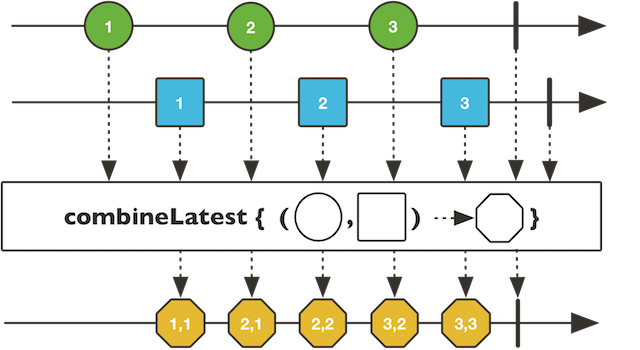
- Type Parameters:
T- type of the value from sourcesV- The produced output after transformation by the given combinator- Parameters:
sources- ThePublishersources to combine values fromcombinator- The aggregate function that will receive the latest value from each upstream and return the value to signal downstream- Returns:
- a
Fluxbased on the produced combinations
-
combineLatest
@SafeVarargs public static <T,V> Flux<V> combineLatest(Function<Object[],V> combinator, int prefetch, Publisher<? extends T>... sources)
Build aFluxwhose data are generated by the combination of the most recently published value from each of thePublishersources.
- Type Parameters:
T- type of the value from sourcesV- The produced output after transformation by the given combinator- Parameters:
sources- ThePublishersources to combine values fromprefetch- The demand sent to each combined sourcePublishercombinator- The aggregate function that will receive the latest value from each upstream and return the value to signal downstream- Returns:
- a
Fluxbased on the produced combinations
-
combineLatest
public static <T1,T2,V> Flux<V> combineLatest(Publisher<? extends T1> source1, Publisher<? extends T2> source2, BiFunction<? super T1,? super T2,? extends V> combinator)
Build aFluxwhose data are generated by the combination of the most recently published value from each of twoPublishersources.
- Type Parameters:
T1- type of the value from source1T2- type of the value from source2V- The produced output after transformation by the given combinator- Parameters:
source1- The firstPublishersource to combine values fromsource2- The secondPublishersource to combine values fromcombinator- The aggregate function that will receive the latest value from each upstream and return the value to signal downstream- Returns:
- a
Fluxbased on the produced combinations
-
combineLatest
public static <T1,T2,T3,V> Flux<V> combineLatest(Publisher<? extends T1> source1, Publisher<? extends T2> source2, Publisher<? extends T3> source3, Function<Object[],V> combinator)
Build aFluxwhose data are generated by the combination of the most recently published value from each of threePublishersources.
- Type Parameters:
T1- type of the value from source1T2- type of the value from source2T3- type of the value from source3V- The produced output after transformation by the given combinator- Parameters:
source1- The firstPublishersource to combine values fromsource2- The secondPublishersource to combine values fromsource3- The thirdPublishersource to combine values fromcombinator- The aggregate function that will receive the latest value from each upstream and return the value to signal downstream- Returns:
- a
Fluxbased on the produced combinations
-
combineLatest
public static <T1,T2,T3,T4,V> Flux<V> combineLatest(Publisher<? extends T1> source1, Publisher<? extends T2> source2, Publisher<? extends T3> source3, Publisher<? extends T4> source4, Function<Object[],V> combinator)
Build aFluxwhose data are generated by the combination of the most recently published value from each of fourPublishersources.
- Type Parameters:
T1- type of the value from source1T2- type of the value from source2T3- type of the value from source3T4- type of the value from source4V- The produced output after transformation by the given combinator- Parameters:
source1- The firstPublishersource to combine values fromsource2- The secondPublishersource to combine values fromsource3- The thirdPublishersource to combine values fromsource4- The fourthPublishersource to combine values fromcombinator- The aggregate function that will receive the latest value from each upstream and return the value to signal downstream- Returns:
- a
Fluxbased on the produced combinations
-
combineLatest
public static <T1,T2,T3,T4,T5,V> Flux<V> combineLatest(Publisher<? extends T1> source1, Publisher<? extends T2> source2, Publisher<? extends T3> source3, Publisher<? extends T4> source4, Publisher<? extends T5> source5, Function<Object[],V> combinator)
Build aFluxwhose data are generated by the combination of the most recently published value from each of fivePublishersources.
- Type Parameters:
T1- type of the value from source1T2- type of the value from source2T3- type of the value from source3T4- type of the value from source4T5- type of the value from source5V- The produced output after transformation by the given combinator- Parameters:
source1- The firstPublishersource to combine values fromsource2- The secondPublishersource to combine values fromsource3- The thirdPublishersource to combine values fromsource4- The fourthPublishersource to combine values fromsource5- The fifthPublishersource to combine values fromcombinator- The aggregate function that will receive the latest value from each upstream and return the value to signal downstream- Returns:
- a
Fluxbased on the produced combinations
-
combineLatest
public static <T1,T2,T3,T4,T5,T6,V> Flux<V> combineLatest(Publisher<? extends T1> source1, Publisher<? extends T2> source2, Publisher<? extends T3> source3, Publisher<? extends T4> source4, Publisher<? extends T5> source5, Publisher<? extends T6> source6, Function<Object[],V> combinator)
Build aFluxwhose data are generated by the combination of the most recently published value from each of sixPublishersources.
- Type Parameters:
T1- type of the value from source1T2- type of the value from source2T3- type of the value from source3T4- type of the value from source4T5- type of the value from source5T6- type of the value from source6V- The produced output after transformation by the given combinator- Parameters:
source1- The firstPublishersource to combine values fromsource2- The secondPublishersource to combine values fromsource3- The thirdPublishersource to combine values fromsource4- The fourthPublishersource to combine values fromsource5- The fifthPublishersource to combine values fromsource6- The sixthPublishersource to combine values fromcombinator- The aggregate function that will receive the latest value from each upstream and return the value to signal downstream- Returns:
- a
Fluxbased on the produced combinations
-
combineLatest
public static <T,V> Flux<V> combineLatest(Iterable<? extends Publisher<? extends T>> sources, Function<Object[],V> combinator)
Build aFluxwhose data are generated by the combination of the most recently published value from each of thePublishersources provided in anIterable.
- Type Parameters:
T- The common base type of the values from sourcesV- The produced output after transformation by the given combinator- Parameters:
sources- The list ofPublishersources to combine values fromcombinator- The aggregate function that will receive the latest value from each upstream and return the value to signal downstream- Returns:
- a
Fluxbased on the produced combinations
-
combineLatest
public static <T,V> Flux<V> combineLatest(Iterable<? extends Publisher<? extends T>> sources, int prefetch, Function<Object[],V> combinator)
Build aFluxwhose data are generated by the combination of the most recently published value from each of thePublishersources provided in anIterable.
- Type Parameters:
T- The common base type of the values from sourcesV- The produced output after transformation by the given combinator- Parameters:
sources- The list ofPublishersources to combine values fromprefetch- demand produced to each combined sourcePublishercombinator- The aggregate function that will receive the latest value from each upstream and return the value to signal downstream- Returns:
- a
Fluxbased on the produced combinations
-
concat
public static <T> Flux<T> concat(Iterable<? extends Publisher<? extends T>> sources)
Concatenate all sources provided in anIterable, forwarding elements emitted by the sources downstream.Concatenation is achieved by sequentially subscribing to the first source then waiting for it to complete before subscribing to the next, and so on until the last source completes. Any error interrupts the sequence immediately and is forwarded downstream.
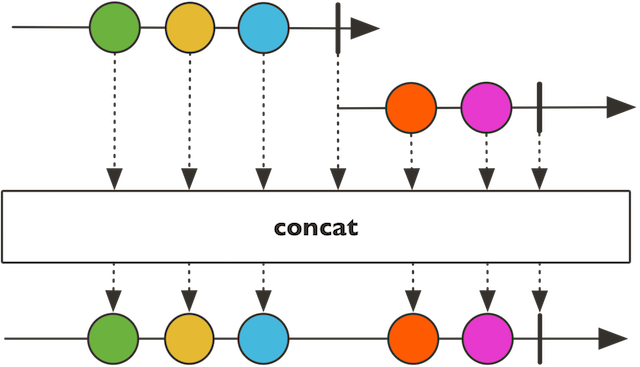
-
concatWithValues
@SafeVarargs public final Flux<T> concatWithValues(T... values)
Concatenates the values to the end of theFlux- Parameters:
values- The values to concatenate- Returns:
- a new
Fluxconcatenating all source sequences
-
concat
public static <T> Flux<T> concat(Publisher<? extends Publisher<? extends T>> sources)
Concatenate all sources emitted as an onNext signal from a parentPublisher, forwarding elements emitted by the sources downstream.Concatenation is achieved by sequentially subscribing to the first source then waiting for it to complete before subscribing to the next, and so on until the last source completes. Any error interrupts the sequence immediately and is forwarded downstream.
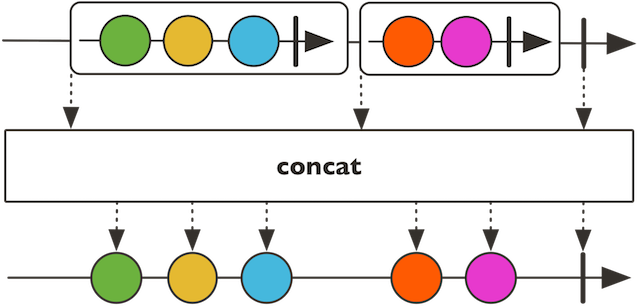
-
concat
public static <T> Flux<T> concat(Publisher<? extends Publisher<? extends T>> sources, int prefetch)
Concatenate all sources emitted as an onNext signal from a parentPublisher, forwarding elements emitted by the sources downstream.Concatenation is achieved by sequentially subscribing to the first source then waiting for it to complete before subscribing to the next, and so on until the last source completes. Any error interrupts the sequence immediately and is forwarded downstream.

-
concat
@SafeVarargs public static <T> Flux<T> concat(Publisher<? extends T>... sources)
Concatenate all sources provided as a vararg, forwarding elements emitted by the sources downstream.Concatenation is achieved by sequentially subscribing to the first source then waiting for it to complete before subscribing to the next, and so on until the last source completes. Any error interrupts the sequence immediately and is forwarded downstream.

-
concatDelayError
public static <T> Flux<T> concatDelayError(Publisher<? extends Publisher<? extends T>> sources)
Concatenate all sources emitted as an onNext signal from a parentPublisher, forwarding elements emitted by the sources downstream.Concatenation is achieved by sequentially subscribing to the first source then waiting for it to complete before subscribing to the next, and so on until the last source completes. Errors do not interrupt the main sequence but are propagated after the rest of the sources have had a chance to be concatenated.

-
concatDelayError
public static <T> Flux<T> concatDelayError(Publisher<? extends Publisher<? extends T>> sources, int prefetch)
Concatenate all sources emitted as an onNext signal from a parentPublisher, forwarding elements emitted by the sources downstream.Concatenation is achieved by sequentially subscribing to the first source then waiting for it to complete before subscribing to the next, and so on until the last source completes. Errors do not interrupt the main sequence but are propagated after the rest of the sources have had a chance to be concatenated.

-
concatDelayError
public static <T> Flux<T> concatDelayError(Publisher<? extends Publisher<? extends T>> sources, boolean delayUntilEnd, int prefetch)
Concatenate all sources emitted as an onNext signal from a parentPublisher, forwarding elements emitted by the sources downstream.Concatenation is achieved by sequentially subscribing to the first source then waiting for it to complete before subscribing to the next, and so on until the last source completes.
Errors do not interrupt the main sequence but are propagated after the current concat backlog if
delayUntilEndis false or after all sources have had a chance to be concatenated ifdelayUntilEndis true.
- Type Parameters:
T- The type of values in both source and output sequences- Parameters:
sources- ThePublisherofPublisherto concatenatedelayUntilEnd- delay error until all sources have been consumed instead of after the current sourceprefetch- the inner source request size- Returns:
- a new
Fluxconcatenating all inner sources sequences until complete or error
-
concatDelayError
@SafeVarargs public static <T> Flux<T> concatDelayError(Publisher<? extends T>... sources)
Concatenate all sources provided as a vararg, forwarding elements emitted by the sources downstream.Concatenation is achieved by sequentially subscribing to the first source then waiting for it to complete before subscribing to the next, and so on until the last source completes. Errors do not interrupt the main sequence but are propagated after the rest of the sources have had a chance to be concatenated.

-
create
public static <T> Flux<T> create(Consumer<? super FluxSink<T>> emitter)
Programmatically create aFluxwith the capability of emitting multiple elements in a synchronous or asynchronous manner through theFluxSinkAPI.This Flux factory is useful if one wants to adapt some other multi-valued async API and not worry about cancellation and backpressure (which is handled by buffering all signals if the downstream can't keep up).
For example:
Flux.<String>create(emitter -> { ActionListener al = e -> { emitter.next(textField.getText()); }; // without cleanup support: button.addActionListener(al); // with cleanup support: button.addActionListener(al); emitter.onDispose(() -> { button.removeListener(al); }); });
-
create
public static <T> Flux<T> create(Consumer<? super FluxSink<T>> emitter, FluxSink.OverflowStrategy backpressure)
Programmatically create aFluxwith the capability of emitting multiple elements in a synchronous or asynchronous manner through theFluxSinkAPI.This Flux factory is useful if one wants to adapt some other multi-valued async API and not worry about cancellation and backpressure (which is handled by buffering all signals if the downstream can't keep up).
For example:
Flux.<String>create(emitter -> { ActionListener al = e -> { emitter.next(textField.getText()); }; // without cleanup support: button.addActionListener(al); // with cleanup support: button.addActionListener(al); emitter.onDispose(() -> { button.removeListener(al); }); }, FluxSink.OverflowStrategy.LATEST);- Type Parameters:
T- The type of values in the sequence- Parameters:
backpressure- the backpressure mode, seeFluxSink.OverflowStrategyfor the available backpressure modesemitter- Consume theFluxSinkprovided per-subscriber by Reactor to generate signals.- Returns:
- a
Flux
-
push
public static <T> Flux<T> push(Consumer<? super FluxSink<T>> emitter)
Programmatically create aFluxwith the capability of emitting multiple elements from a single-threaded producer through theFluxSinkAPI.This Flux factory is useful if one wants to adapt some other single-threaded multi-valued async API and not worry about cancellation and backpressure (which is handled by buffering all signals if the downstream can't keep up).
For example:
Flux.<String>push(emitter -> { ActionListener al = e -> { emitter.next(textField.getText()); }; // without cleanup support: button.addActionListener(al); // with cleanup support: button.addActionListener(al); emitter.onDispose(() -> { button.removeListener(al); }); }, FluxSink.OverflowStrategy.LATEST);
-
push
public static <T> Flux<T> push(Consumer<? super FluxSink<T>> emitter, FluxSink.OverflowStrategy backpressure)
Programmatically create aFluxwith the capability of emitting multiple elements from a single-threaded producer through theFluxSinkAPI.This Flux factory is useful if one wants to adapt some other single-threaded multi-valued async API and not worry about cancellation and backpressure (which is handled by buffering all signals if the downstream can't keep up).
For example:
Flux.<String>push(emitter -> { ActionListener al = e -> { emitter.next(textField.getText()); }; // without cleanup support: button.addActionListener(al); // with cleanup support: button.addActionListener(al); emitter.onDispose(() -> { button.removeListener(al); }); }, FluxSink.OverflowStrategy.LATEST);- Type Parameters:
T- The type of values in the sequence- Parameters:
backpressure- the backpressure mode, seeFluxSink.OverflowStrategyfor the available backpressure modesemitter- Consume theFluxSinkprovided per-subscriber by Reactor to generate signals.- Returns:
- a
Flux
-
defer
public static <T> Flux<T> defer(Supplier<? extends Publisher<T>> supplier)
Lazily supply aPublisherevery time aSubscriptionis made on the resultingFlux, so the actual source instantiation is deferred until each subscribe and theSuppliercan create a subscriber-specific instance. If the supplier doesn't generate a new instance however, this operator will effectively behave likefrom(Publisher).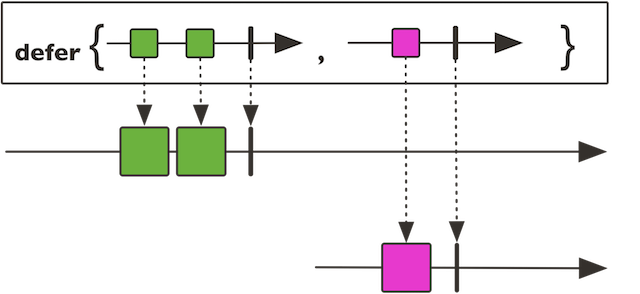
-
empty
public static <T> Flux<T> empty()
Create aFluxthat completes without emitting any item.
- Type Parameters:
T- the reified type of the targetSubscriber- Returns:
- an empty
Flux
-
error
public static <T> Flux<T> error(Throwable error)
Create aFluxthat terminates with the specified error immediately after being subscribed to.
- Type Parameters:
T- the reified type of the targetSubscriber- Parameters:
error- the error to signal to eachSubscriber- Returns:
- a new failed
Flux
-
error
public static <O> Flux<O> error(Throwable throwable, boolean whenRequested)
Create aFluxthat terminates with the specified error, either immediately after being subscribed to or after being first requested.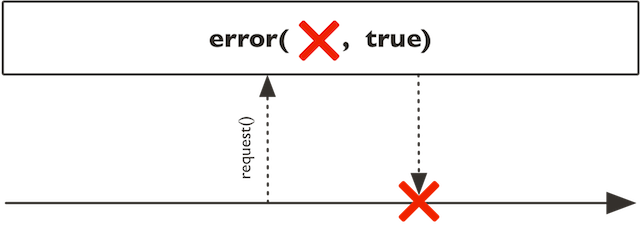
- Type Parameters:
O- the reified type of the targetSubscriber- Parameters:
throwable- the error to signal to eachSubscriberwhenRequested- if true, will onError on the first request instead of subscribe().- Returns:
- a new failed
Flux
-
first
@SafeVarargs public static <I> Flux<I> first(Publisher<? extends I>... sources)
Pick the firstPublisherto emit any signal (onNext/onError/onComplete) and replay all signals from thatPublisher, effectively behaving like the fastest of these competing sources.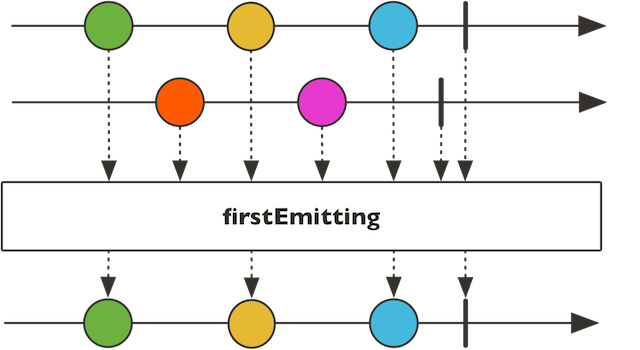
- Type Parameters:
I- The type of values in both source and output sequences- Parameters:
sources- The competing source publishers- Returns:
- a new
Fluxbehaving like the fastest of its sources
-
first
public static <I> Flux<I> first(Iterable<? extends Publisher<? extends I>> sources)
Pick the firstPublisherto emit any signal (onNext/onError/onComplete) and replay all signals from thatPublisher, effectively behaving like the fastest of these competing sources.
- Type Parameters:
I- The type of values in both source and output sequences- Parameters:
sources- The competing source publishers- Returns:
- a new
Fluxbehaving like the fastest of its sources
-
from
public static <T> Flux<T> from(Publisher<? extends T> source)
- Type Parameters:
T- The type of values in both source and output sequences- Parameters:
source- the source to decorate- Returns:
- a new
Flux
-
fromArray
public static <T> Flux<T> fromArray(T[] array)
Create aFluxthat emits the items contained in the provided array.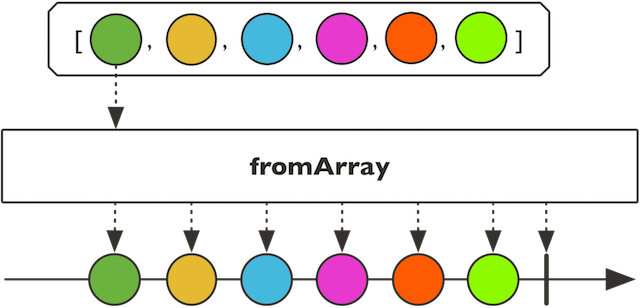
- Type Parameters:
T- The type of values in the source array and resulting Flux- Parameters:
array- the array to read data from- Returns:
- a new
Flux
-
fromStream
public static <T> Flux<T> fromStream(Stream<? extends T> s)
Create aFluxthat emits the items contained in the providedStream. Keep in mind that aStreamcannot be re-used, which can be problematic in case of multiple subscriptions or re-subscription (like withrepeat()orretry()). TheStreamisclosedautomatically by the operator on cancellation, error or completion.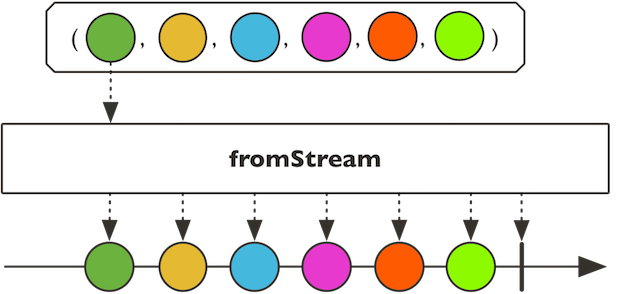
-
generate
public static <T> Flux<T> generate(Consumer<SynchronousSink<T>> generator)
Programmatically create aFluxby generating signals one-by-one via a consumer callback.
- Type Parameters:
T- the value type emitted- Parameters:
generator- Consume theSynchronousSinkprovided per-subscriber by Reactor to generate a single signal on each pass.- Returns:
- a
Flux
-
generate
public static <T,S> Flux<T> generate(Callable<S> stateSupplier, BiFunction<S,SynchronousSink<T>,S> generator)
Programmatically create aFluxby generating signals one-by-one via a consumer callback and some state. ThestateSuppliermay return null.
- Type Parameters:
T- the value type emittedS- the per-subscriber custom state type- Parameters:
stateSupplier- called for each incoming Subscriber to provide the initial state for the generator bifunctiongenerator- Consume theSynchronousSinkprovided per-subscriber by Reactor as well as the current state to generate a single signal on each pass and return a (new) state.- Returns:
- a
Flux
-
generate
public static <T,S> Flux<T> generate(Callable<S> stateSupplier, BiFunction<S,SynchronousSink<T>,S> generator, Consumer<? super S> stateConsumer)
Programmatically create aFluxby generating signals one-by-one via a consumer callback and some state, with a final cleanup callback. ThestateSuppliermay return null but your cleanupstateConsumerwill need to handle the null case.
- Type Parameters:
T- the value type emittedS- the per-subscriber custom state type- Parameters:
stateSupplier- called for each incoming Subscriber to provide the initial state for the generator bifunctiongenerator- Consume theSynchronousSinkprovided per-subscriber by Reactor as well as the current state to generate a single signal on each pass and return a (new) state.stateConsumer- called after the generator has terminated or the downstream cancelled, receiving the last state to be handled (i.e., release resources or do other cleanup).- Returns:
- a
Flux
-
interval
public static Flux<Long> interval(Duration period)
Create aFluxthat emits long values starting with 0 and incrementing at specified time intervals on the global timer. If demand is not produced in time, an onError will be signalled with anoverflowIllegalStateExceptiondetailing the tick that couldn't be emitted. In normal conditions, theFluxwill never complete.Runs on the
Schedulers.parallel()Scheduler.
-
interval
public static Flux<Long> interval(Duration delay, Duration period)
Create aFluxthat emits long values starting with 0 and incrementing at specified time intervals, after an initial delay, on the global timer. If demand is not produced in time, an onError will be signalled with anoverflowIllegalStateExceptiondetailing the tick that couldn't be emitted. In normal conditions, theFluxwill never complete.Runs on the
Schedulers.parallel()Scheduler.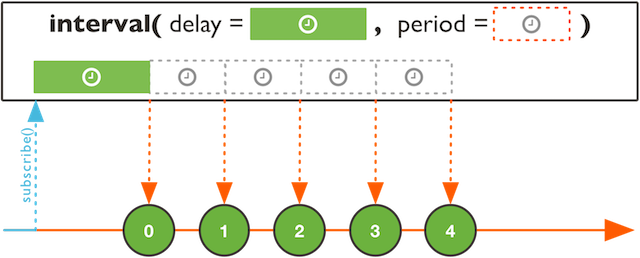
-
interval
public static Flux<Long> interval(Duration period, Scheduler timer)
Create aFluxthat emits long values starting with 0 and incrementing at specified time intervals, on the specifiedScheduler. If demand is not produced in time, an onError will be signalled with anoverflowIllegalStateExceptiondetailing the tick that couldn't be emitted. In normal conditions, theFluxwill never complete.
-
interval
public static Flux<Long> interval(Duration delay, Duration period, Scheduler timer)
Create aFluxthat emits long values starting with 0 and incrementing at specified time intervals, after an initial delay, on the specifiedScheduler. If demand is not produced in time, an onError will be signalled with anoverflowIllegalStateExceptiondetailing the tick that couldn't be emitted. In normal conditions, theFluxwill never complete.
-
just
@SafeVarargs public static <T> Flux<T> just(T... data)
Create aFluxthat emits the provided elements and then completes.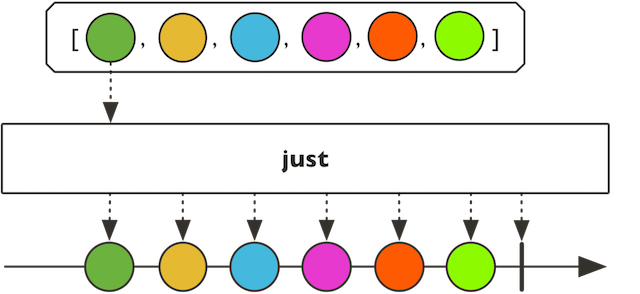
- Type Parameters:
T- the emitted data type- Parameters:
data- the elements to emit, as a vararg- Returns:
- a new
Flux
-
just
public static <T> Flux<T> just(T data)
Create a newFluxthat will only emit a single element then onComplete.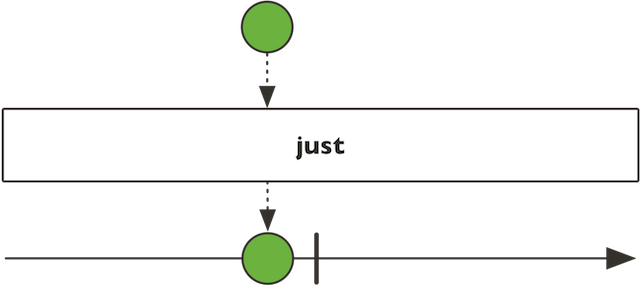
- Type Parameters:
T- the emitted data type- Parameters:
data- the single element to emit- Returns:
- a new
Flux
-
merge
public static <T> Flux<T> merge(Publisher<? extends Publisher<? extends T>> source)
Merge data fromPublishersequences emitted by the passedPublisherinto an interleaved merged sequence. Unlikeconcat, inner sources are subscribed to eagerly.
Note that merge is tailored to work with asynchronous sources or finite sources. When dealing with an infinite source that doesn't already publish on a dedicated Scheduler, you must isolate that source in its own Scheduler, as merge would otherwise attempt to drain it before subscribing to another source.
-
merge
public static <T> Flux<T> merge(Publisher<? extends Publisher<? extends T>> source, int concurrency)
Merge data fromPublishersequences emitted by the passedPublisherinto an interleaved merged sequence. Unlikeconcat, inner sources are subscribed to eagerly (but at mostconcurrencysources are subscribed to at the same time).
Note that merge is tailored to work with asynchronous sources or finite sources. When dealing with an infinite source that doesn't already publish on a dedicated Scheduler, you must isolate that source in its own Scheduler, as merge would otherwise attempt to drain it before subscribing to another source.
-
merge
public static <T> Flux<T> merge(Publisher<? extends Publisher<? extends T>> source, int concurrency, int prefetch)
Merge data fromPublishersequences emitted by the passedPublisherinto an interleaved merged sequence. Unlikeconcat, inner sources are subscribed to eagerly (but at mostconcurrencysources are subscribed to at the same time).
Note that merge is tailored to work with asynchronous sources or finite sources. When dealing with an infinite source that doesn't already publish on a dedicated Scheduler, you must isolate that source in its own Scheduler, as merge would otherwise attempt to drain it before subscribing to another source.
-
merge
public static <I> Flux<I> merge(Iterable<? extends Publisher<? extends I>> sources)
Merge data fromPublishersequences contained in anIterableinto an interleaved merged sequence. Unlikeconcat, inner sources are subscribed to eagerly. A newIteratorwill be created for each subscriber.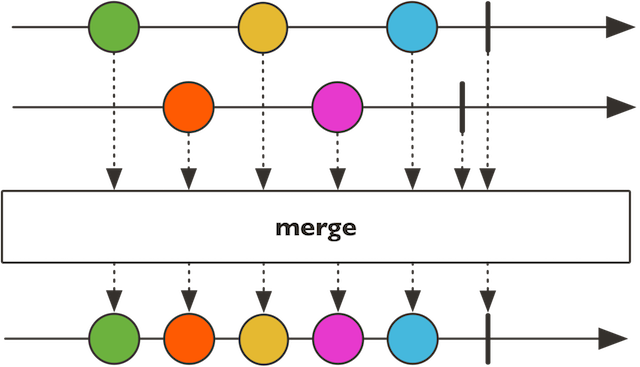
Note that merge is tailored to work with asynchronous sources or finite sources. When dealing with an infinite source that doesn't already publish on a dedicated Scheduler, you must isolate that source in its own Scheduler, as merge would otherwise attempt to drain it before subscribing to another source.
-
merge
@SafeVarargs public static <I> Flux<I> merge(Publisher<? extends I>... sources)
Merge data fromPublishersequences contained in an array / vararg into an interleaved merged sequence. Unlikeconcat, sources are subscribed to eagerly.
Note that merge is tailored to work with asynchronous sources or finite sources. When dealing with an infinite source that doesn't already publish on a dedicated Scheduler, you must isolate that source in its own Scheduler, as merge would otherwise attempt to drain it before subscribing to another source.
-
merge
@SafeVarargs public static <I> Flux<I> merge(int prefetch, Publisher<? extends I>... sources)
Merge data fromPublishersequences contained in an array / vararg into an interleaved merged sequence. Unlikeconcat, sources are subscribed to eagerly.
Note that merge is tailored to work with asynchronous sources or finite sources. When dealing with an infinite source that doesn't already publish on a dedicated Scheduler, you must isolate that source in its own Scheduler, as merge would otherwise attempt to drain it before subscribing to another source.
-
mergeDelayError
@SafeVarargs public static <I> Flux<I> mergeDelayError(int prefetch, Publisher<? extends I>... sources)
Merge data fromPublishersequences contained in an array / vararg into an interleaved merged sequence. Unlikeconcat, sources are subscribed to eagerly. This variant will delay any error until after the rest of the merge backlog has been processed.
Note that merge is tailored to work with asynchronous sources or finite sources. When dealing with an infinite source that doesn't already publish on a dedicated Scheduler, you must isolate that source in its own Scheduler, as merge would otherwise attempt to drain it before subscribing to another source.
-
mergeOrdered
@SafeVarargs public static <I extends Comparable<? super I>> Flux<I> mergeOrdered(Publisher<? extends I>... sources)
Merge data from providedPublishersequences into an ordered merged sequence, by picking the smallest values from each source (as defined by their natural order). This is not asort(), as it doesn't consider the whole of each sequences.Instead, this operator considers only one value from each source and picks the smallest of all these values, then replenishes the slot for that picked source.
- Type Parameters:
I- aComparablemerged type that has anatural order- Parameters:
sources-Publishersources ofComparableto merge- Returns:
- a merged
Fluxthat , subscribing early but keeping the original ordering
-
mergeOrdered
@SafeVarargs public static <T> Flux<T> mergeOrdered(Comparator<? super T> comparator, Publisher<? extends T>... sources)
Merge data from providedPublishersequences into an ordered merged sequence, by picking the smallest values from each source (as defined by the providedComparator). This is not asort(Comparator), as it doesn't consider the whole of each sequences.Instead, this operator considers only one value from each source and picks the smallest of all these values, then replenishes the slot for that picked source.
- Type Parameters:
T- the merged type- Parameters:
comparator- theComparatorto use to find the smallest valuesources-Publishersources to merge- Returns:
- a merged
Fluxthat , subscribing early but keeping the original ordering
-
mergeOrdered
@SafeVarargs public static <T> Flux<T> mergeOrdered(int prefetch, Comparator<? super T> comparator, Publisher<? extends T>... sources)
Merge data from providedPublishersequences into an ordered merged sequence, by picking the smallest values from each source (as defined by the providedComparator). This is not asort(Comparator), as it doesn't consider the whole of each sequences.Instead, this operator considers only one value from each source and picks the smallest of all these values, then replenishes the slot for that picked source.
- Type Parameters:
T- the merged type- Parameters:
prefetch- the number of elements to prefetch from each source (avoiding too many small requests to the source when picking)comparator- theComparatorto use to find the smallest valuesources-Publishersources to merge- Returns:
- a merged
Fluxthat , subscribing early but keeping the original ordering
-
mergeSequential
public static <T> Flux<T> mergeSequential(Publisher<? extends Publisher<? extends T>> sources)
-
mergeSequential
public static <T> Flux<T> mergeSequential(Publisher<? extends Publisher<? extends T>> sources, int maxConcurrency, int prefetch)
Merge data fromPublishersequences emitted by the passedPublisherinto an ordered merged sequence. Unlike concat, the inner publishers are subscribed to eagerly (but at mostmaxConcurrencysources at a time). Unlike merge, their emitted values are merged into the final sequence in subscription order.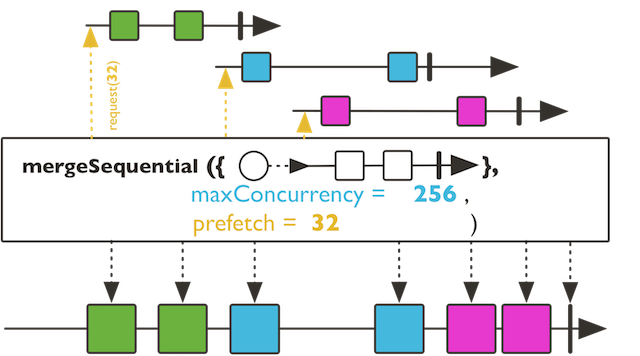
- Type Parameters:
T- the merged type- Parameters:
sources- aPublisherofPublishersources to mergeprefetch- the inner source request sizemaxConcurrency- the request produced to the main source thus limiting concurrent merge backlog- Returns:
- a merged
Flux, subscribing early but keeping the original ordering
-
mergeSequentialDelayError
public static <T> Flux<T> mergeSequentialDelayError(Publisher<? extends Publisher<? extends T>> sources, int maxConcurrency, int prefetch)
Merge data fromPublishersequences emitted by the passedPublisherinto an ordered merged sequence. Unlike concat, the inner publishers are subscribed to eagerly (but at mostmaxConcurrencysources at a time). Unlike merge, their emitted values are merged into the final sequence in subscription order. This variant will delay any error until after the rest of the mergeSequential backlog has been processed.
- Type Parameters:
T- the merged type- Parameters:
sources- aPublisherofPublishersources to mergeprefetch- the inner source request sizemaxConcurrency- the request produced to the main source thus limiting concurrent merge backlog- Returns:
- a merged
Flux, subscribing early but keeping the original ordering
-
mergeSequential
@SafeVarargs public static <I> Flux<I> mergeSequential(Publisher<? extends I>... sources)
Merge data fromPublishersequences provided in an array/vararg into an ordered merged sequence. Unlike concat, sources are subscribed to eagerly. Unlike merge, their emitted values are merged into the final sequence in subscription order.
-
mergeSequential
@SafeVarargs public static <I> Flux<I> mergeSequential(int prefetch, Publisher<? extends I>... sources)
Merge data fromPublishersequences provided in an array/vararg into an ordered merged sequence. Unlike concat, sources are subscribed to eagerly. Unlike merge, their emitted values are merged into the final sequence in subscription order.
-
mergeSequentialDelayError
@SafeVarargs public static <I> Flux<I> mergeSequentialDelayError(int prefetch, Publisher<? extends I>... sources)
Merge data fromPublishersequences provided in an array/vararg into an ordered merged sequence. Unlike concat, sources are subscribed to eagerly. Unlike merge, their emitted values are merged into the final sequence in subscription order. This variant will delay any error until after the rest of the mergeSequential backlog has been processed.
-
mergeSequential
public static <I> Flux<I> mergeSequential(Iterable<? extends Publisher<? extends I>> sources)
-
mergeSequential
public static <I> Flux<I> mergeSequential(Iterable<? extends Publisher<? extends I>> sources, int maxConcurrency, int prefetch)
Merge data fromPublishersequences provided in anIterableinto an ordered merged sequence. Unlike concat, sources are subscribed to eagerly (but at mostmaxConcurrencysources at a time). Unlike merge, their emitted values are merged into the final sequence in subscription order.
- Type Parameters:
I- the merged type- Parameters:
sources- anIterableofPublishersequences to mergemaxConcurrency- the request produced to the main source thus limiting concurrent merge backlogprefetch- the inner source request size- Returns:
- a merged
Flux, subscribing early but keeping the original ordering
-
mergeSequentialDelayError
public static <I> Flux<I> mergeSequentialDelayError(Iterable<? extends Publisher<? extends I>> sources, int maxConcurrency, int prefetch)
Merge data fromPublishersequences provided in anIterableinto an ordered merged sequence. Unlike concat, sources are subscribed to eagerly (but at mostmaxConcurrencysources at a time). Unlike merge, their emitted values are merged into the final sequence in subscription order. This variant will delay any error until after the rest of the mergeSequential backlog has been processed.
- Type Parameters:
I- the merged type- Parameters:
sources- anIterableofPublishersequences to mergemaxConcurrency- the request produced to the main source thus limiting concurrent merge backlogprefetch- the inner source request size- Returns:
- a merged
Flux, subscribing early but keeping the original ordering
-
never
public static <T> Flux<T> never()
Create aFluxthat will never signal any data, error or completion signal.
- Type Parameters:
T- theSubscribertype target- Returns:
- a never completing
Flux
-
range
public static Flux<Integer> range(int start, int count)
Build aFluxthat will only emit a sequence ofcountincrementing integers, starting fromstart. That is, emit integers betweenstart(included) andstart + count(excluded) then complete.
- Parameters:
start- the first integer to be emitcount- the total number of incrementing values to emit, including the first value- Returns:
- a ranged
Flux
-
switchOnNext
public static <T> Flux<T> switchOnNext(Publisher<? extends Publisher<? extends T>> mergedPublishers)
Creates aFluxthat mirrors the most recently emittedPublisher, forwarding its data until a newPublishercomes in in the source.The resulting
Fluxwill complete once there are no newPublisherin the source (source has completed) and the last mirroredPublisherhas also completed.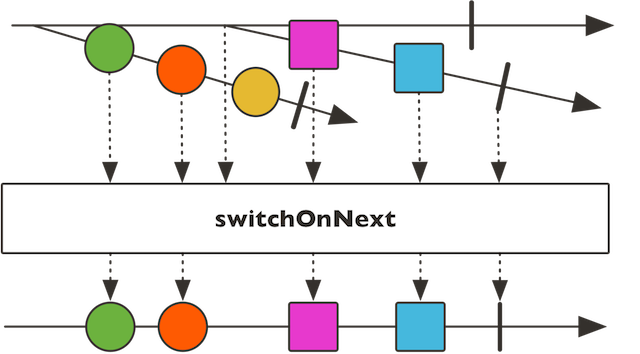
- Type Parameters:
T- the produced type- Parameters:
mergedPublishers- ThePublisherofPublisherto switch on and mirror.- Returns:
- a
FluxProcessoraccepting publishers and producing T
-
switchOnNext
public static <T> Flux<T> switchOnNext(Publisher<? extends Publisher<? extends T>> mergedPublishers, int prefetch)
Creates aFluxthat mirrors the most recently emittedPublisher, forwarding its data until a newPublishercomes in in the source.The resulting
Fluxwill complete once there are no newPublisherin the source (source has completed) and the last mirroredPublisherhas also completed.
- Type Parameters:
T- the produced type- Parameters:
mergedPublishers- ThePublisherofPublisherto switch on and mirror.prefetch- the inner source request size- Returns:
- a
FluxProcessoraccepting publishers and producing T
-
using
public static <T,D> Flux<T> using(Callable<? extends D> resourceSupplier, Function<? super D,? extends Publisher<? extends T>> sourceSupplier, Consumer<? super D> resourceCleanup)
Uses a resource, generated by a supplier for each individual Subscriber, while streaming the values from a Publisher derived from the same resource and makes sure the resource is released if the sequence terminates or the Subscriber cancels.Eager resource cleanup happens just before the source termination and exceptions raised by the cleanup Consumer may override the terminal even.
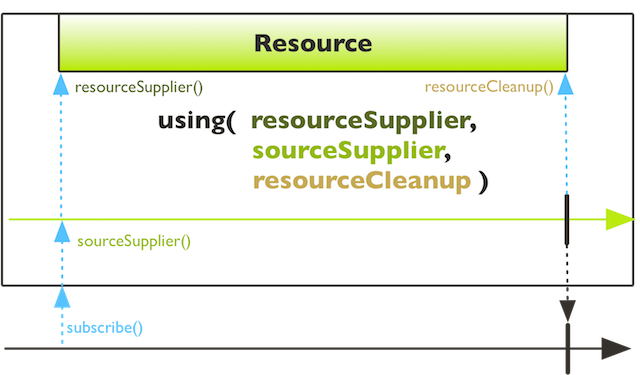
- Type Parameters:
T- emitted typeD- resource type- Parameters:
resourceSupplier- aCallablethat is called on subscribe to generate the resourcesourceSupplier- a factory to derive aPublisherfrom the supplied resourceresourceCleanup- a resource cleanup callback invoked on completion- Returns:
- a new
Fluxbuilt around a disposable resource
-
using
public static <T,D> Flux<T> using(Callable<? extends D> resourceSupplier, Function<? super D,? extends Publisher<? extends T>> sourceSupplier, Consumer<? super D> resourceCleanup, boolean eager)
Uses a resource, generated by a supplier for each individual Subscriber, while streaming the values from a Publisher derived from the same resource and makes sure the resource is released if the sequence terminates or the Subscriber cancels.- Eager resource cleanup happens just before the source termination and exceptions raised by the cleanup Consumer may override the terminal even.
- Non-eager cleanup will drop any exception.

- Type Parameters:
T- emitted typeD- resource type- Parameters:
resourceSupplier- aCallablethat is called on subscribe to generate the resourcesourceSupplier- a factory to derive aPublisherfrom the supplied resourceresourceCleanup- a resource cleanup callback invoked on completioneager- true to clean before terminating downstream subscribers- Returns:
- a new
Fluxbuilt around a disposable resource
-
zip
public static <T1,T2,O> Flux<O> zip(Publisher<? extends T1> source1, Publisher<? extends T2> source2, BiFunction<? super T1,? super T2,? extends O> combinator)
Zip two sources together, that is to say wait for all the sources to emit one element and combine these elements once into an output value (constructed by the provided combinator). The operator will continue doing so until any of the sources completes. Errors will immediately be forwarded. This "Step-Merge" processing is especially useful in Scatter-Gather scenarios.
- Type Parameters:
T1- type of the value from source1T2- type of the value from source2O- The produced output after transformation by the combinator- Parameters:
source1- The firstPublishersource to zip.source2- The secondPublishersource to zip.combinator- The aggregate function that will receive a unique value from each upstream and return the value to signal downstream- Returns:
- a zipped
Flux
-
zip
public static <T1,T2> Flux<Tuple2<T1,T2>> zip(Publisher<? extends T1> source1, Publisher<? extends T2> source2)
Zip two sources together, that is to say wait for all the sources to emit one element and combine these elements once into aTuple2. The operator will continue doing so until any of the sources completes. Errors will immediately be forwarded. This "Step-Merge" processing is especially useful in Scatter-Gather scenarios.
-
zip
public static <T1,T2,T3> Flux<Tuple3<T1,T2,T3>> zip(Publisher<? extends T1> source1, Publisher<? extends T2> source2, Publisher<? extends T3> source3)
Zip three sources together, that is to say wait for all the sources to emit one element and combine these elements once into aTuple3. The operator will continue doing so until any of the sources completes. Errors will immediately be forwarded. This "Step-Merge" processing is especially useful in Scatter-Gather scenarios.
- Type Parameters:
T1- type of the value from source1T2- type of the value from source2T3- type of the value from source3- Parameters:
source1- The first upstreamPublisherto subscribe to.source2- The second upstreamPublisherto subscribe to.source3- The third upstreamPublisherto subscribe to.- Returns:
- a zipped
Flux
-
zip
public static <T1,T2,T3,T4> Flux<Tuple4<T1,T2,T3,T4>> zip(Publisher<? extends T1> source1, Publisher<? extends T2> source2, Publisher<? extends T3> source3, Publisher<? extends T4> source4)
Zip four sources together, that is to say wait for all the sources to emit one element and combine these elements once into aTuple4. The operator will continue doing so until any of the sources completes. Errors will immediately be forwarded. This "Step-Merge" processing is especially useful in Scatter-Gather scenarios.
- Type Parameters:
T1- type of the value from source1T2- type of the value from source2T3- type of the value from source3T4- type of the value from source4- Parameters:
source1- The first upstreamPublisherto subscribe to.source2- The second upstreamPublisherto subscribe to.source3- The third upstreamPublisherto subscribe to.source4- The fourth upstreamPublisherto subscribe to.- Returns:
- a zipped
Flux
-
zip
public static <T1,T2,T3,T4,T5> Flux<Tuple5<T1,T2,T3,T4,T5>> zip(Publisher<? extends T1> source1, Publisher<? extends T2> source2, Publisher<? extends T3> source3, Publisher<? extends T4> source4, Publisher<? extends T5> source5)
Zip five sources together, that is to say wait for all the sources to emit one element and combine these elements once into aTuple5. The operator will continue doing so until any of the sources completes. Errors will immediately be forwarded. This "Step-Merge" processing is especially useful in Scatter-Gather scenarios.
- Type Parameters:
T1- type of the value from source1T2- type of the value from source2T3- type of the value from source3T4- type of the value from source4T5- type of the value from source5- Parameters:
source1- The first upstreamPublisherto subscribe to.source2- The second upstreamPublisherto subscribe to.source3- The third upstreamPublisherto subscribe to.source4- The fourth upstreamPublisherto subscribe to.source5- The fifth upstreamPublisherto subscribe to.- Returns:
- a zipped
Flux
-
zip
public static <T1,T2,T3,T4,T5,T6> Flux<Tuple6<T1,T2,T3,T4,T5,T6>> zip(Publisher<? extends T1> source1, Publisher<? extends T2> source2, Publisher<? extends T3> source3, Publisher<? extends T4> source4, Publisher<? extends T5> source5, Publisher<? extends T6> source6)
Zip six sources together, that is to say wait for all the sources to emit one element and combine these elements once into aTuple6. The operator will continue doing so until any of the sources completes. Errors will immediately be forwarded. This "Step-Merge" processing is especially useful in Scatter-Gather scenarios.
- Type Parameters:
T1- type of the value from source1T2- type of the value from source2T3- type of the value from source3T4- type of the value from source4T5- type of the value from source5T6- type of the value from source6- Parameters:
source1- The first upstreamPublisherto subscribe to.source2- The second upstreamPublisherto subscribe to.source3- The third upstreamPublisherto subscribe to.source4- The fourth upstreamPublisherto subscribe to.source5- The fifth upstreamPublisherto subscribe to.source6- The sixth upstreamPublisherto subscribe to.- Returns:
- a zipped
Flux
-
zip
public static <O> Flux<O> zip(Iterable<? extends Publisher<?>> sources, Function<? super Object[],? extends O> combinator)
Zip multiple sources together, that is to say wait for all the sources to emit one element and combine these elements once into an output value (constructed by the provided combinator). The operator will continue doing so until any of the sources completes. Errors will immediately be forwarded. This "Step-Merge" processing is especially useful in Scatter-Gather scenarios. TheIterable.iterator()will be called on eachPublisher.subscribe(Subscriber).
-
zip
public static <O> Flux<O> zip(Iterable<? extends Publisher<?>> sources, int prefetch, Function<? super Object[],? extends O> combinator)
Zip multiple sources together, that is to say wait for all the sources to emit one element and combine these elements once into an output value (constructed by the provided combinator). The operator will continue doing so until any of the sources completes. Errors will immediately be forwarded. This "Step-Merge" processing is especially useful in Scatter-Gather scenarios. TheIterable.iterator()will be called on eachPublisher.subscribe(Subscriber).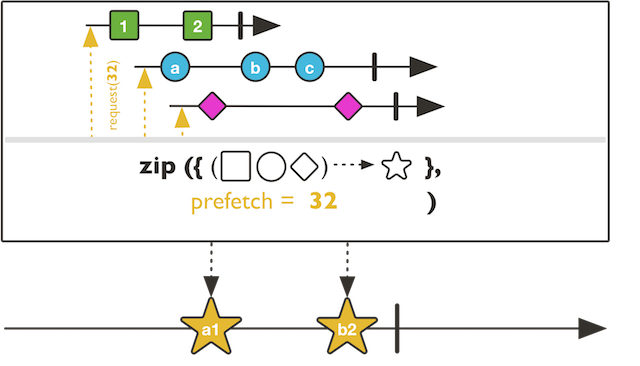
- Type Parameters:
O- the combined produced type- Parameters:
sources- theIterableproviding sources to zipprefetch- the inner source request sizecombinator- The aggregate function that will receive a unique value from each upstream and return the value to signal downstream- Returns:
- a zipped
Flux
-
zip
@SafeVarargs public static <I,O> Flux<O> zip(Function<? super Object[],? extends O> combinator, Publisher<? extends I>... sources)
Zip multiple sources together, that is to say wait for all the sources to emit one element and combine these elements once into an output value (constructed by the provided combinator). The operator will continue doing so until any of the sources completes. Errors will immediately be forwarded. This "Step-Merge" processing is especially useful in Scatter-Gather scenarios.
- Type Parameters:
I- the type of the input sourcesO- the combined produced type- Parameters:
combinator- The aggregate function that will receive a unique value from each upstream and return the value to signal downstreamsources- the array providing sources to zip- Returns:
- a zipped
Flux
-
zip
@SafeVarargs public static <I,O> Flux<O> zip(Function<? super Object[],? extends O> combinator, int prefetch, Publisher<? extends I>... sources)
Zip multiple sources together, that is to say wait for all the sources to emit one element and combine these elements once into an output value (constructed by the provided combinator). The operator will continue doing so until any of the sources completes. Errors will immediately be forwarded. This "Step-Merge" processing is especially useful in Scatter-Gather scenarios.
- Type Parameters:
I- the type of the input sourcesO- the combined produced type- Parameters:
combinator- The aggregate function that will receive a unique value from each upstream and return the value to signal downstreamprefetch- individual source request sizesources- the array providing sources to zip- Returns:
- a zipped
Flux
-
zip
public static <TUPLE extends Tuple2,V> Flux<V> zip(Publisher<? extends Publisher<?>> sources, Function<? super TUPLE,? extends V> combinator)
Zip multiple sources together, that is to say wait for all the sources to emit one element and combine these elements once into an output value (constructed by the provided combinator). The operator will continue doing so until any of the sources completes. Errors will immediately be forwarded. This "Step-Merge" processing is especially useful in Scatter-Gather scenarios.Note that the
Publishersources from the outerPublisherwill accumulate into an exhaustive list before starting zip operation.
- Type Parameters:
TUPLE- the raw tuple typeV- The produced output after transformation by the given combinator- Parameters:
sources- ThePublisherofPublishersources to zip. A finite publisher is required.combinator- The aggregate function that will receive a unique value from each upstream and return the value to signal downstream- Returns:
- a
Fluxbased on the produced value
-
all
public final Mono<Boolean> all(Predicate<? super T> predicate)
Emit a single boolean true if all values of this sequence match thePredicate.The implementation uses short-circuit logic and completes with false if the predicate doesn't match a value.

-
any
public final Mono<Boolean> any(Predicate<? super T> predicate)
Emit a single boolean true if any of the values of thisFluxsequence match the predicate.The implementation uses short-circuit logic and completes with false if any value doesn't match the predicate.
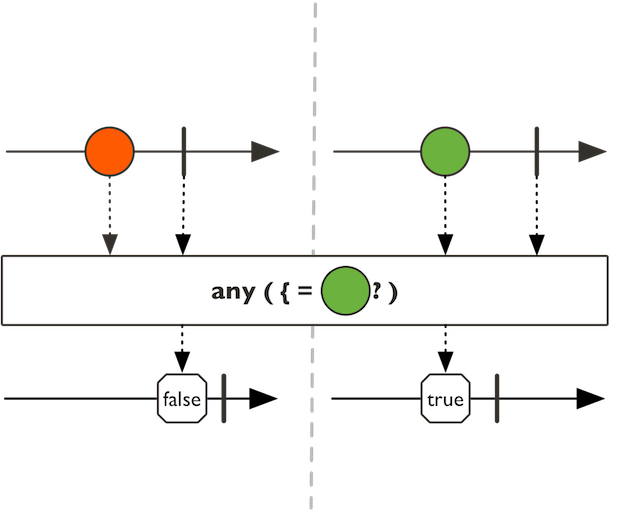
-
as
public final <P> P as(Function<? super Flux<T>,P> transformer)
Transform thisFluxinto a target type.flux.as(Mono::from).subscribe()- Type Parameters:
P- the returned instance type- Parameters:
transformer- theFunctionto immediately map thisFluxinto a target type instance.- Returns:
- the
Fluxtransformed to an instance of P - See Also:
for a bounded conversion to {@link Publisher}
-
blockFirst
@Nullable public final T blockFirst()
Subscribe to thisFluxand block indefinitely until the upstream signals its first value or completes. Returns that value, or null if the Flux completes empty. In case the Flux errors, the original exception is thrown (wrapped in aRuntimeExceptionif it was a checked exception).Note that each blockFirst() will trigger a new subscription: in other words, the result might miss signal from hot publishers.
- Returns:
- the first value or null
-
blockFirst
@Nullable public final T blockFirst(Duration timeout)
Subscribe to thisFluxand block until the upstream signals its first value, completes or a timeout expires. Returns that value, or null if the Flux completes empty. In case the Flux errors, the original exception is thrown (wrapped in aRuntimeExceptionif it was a checked exception). If the provided timeout expires,aRuntimeExceptionis thrown.Note that each blockFirst() will trigger a new subscription: in other words, the result might miss signal from hot publishers.
- Parameters:
timeout- maximum time period to wait for before raising aRuntimeException- Returns:
- the first value or null
-
blockLast
@Nullable public final T blockLast()
Subscribe to thisFluxand block indefinitely until the upstream signals its last value or completes. Returns that value, or null if the Flux completes empty. In case the Flux errors, the original exception is thrown (wrapped in aRuntimeExceptionif it was a checked exception).Note that each blockLast() will trigger a new subscription: in other words, the result might miss signal from hot publishers.
- Returns:
- the last value or null
-
blockLast
@Nullable public final T blockLast(Duration timeout)
Subscribe to thisFluxand block until the upstream signals its last value, completes or a timeout expires. Returns that value, or null if the Flux completes empty. In case the Flux errors, the original exception is thrown (wrapped in aRuntimeExceptionif it was a checked exception). If the provided timeout expires,aRuntimeExceptionis thrown.Note that each blockLast() will trigger a new subscription: in other words, the result might miss signal from hot publishers.
- Parameters:
timeout- maximum time period to wait for before raising aRuntimeException- Returns:
- the last value or null
-
buffer
public final Flux<List<T>> buffer()
Collect all incoming values into a singleListbuffer that will be emitted by the returnedFluxonce this Flux completes.
- Returns:
- a buffered
Fluxof at most oneList - See Also:
for an alternative collecting algorithm returning {@link Mono}
-
buffer
public final <C extends Collection<? super T>> Flux<C> buffer(int maxSize, Supplier<C> bufferSupplier)
Collect incoming values into multiple user-definedCollectionbuffers that will be emitted by the returnedFluxeach time the given max size is reached or once this Flux completes.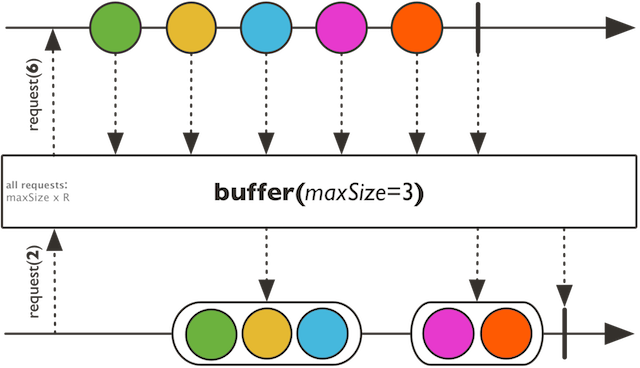
- Type Parameters:
C- theCollectionbuffer type- Parameters:
maxSize- the maximum collected sizebufferSupplier- aSupplierof the concreteCollectionto use for each buffer- Returns:
- a microbatched
FluxofCollection
-
buffer
public final Flux<List<T>> buffer(int maxSize, int skip)
Collect incoming values into multipleListbuffers that will be emitted by the returnedFluxeach time the given max size is reached or once this Flux completes. Buffers can be created with gaps, as a new buffer will be created every timeskipvalues have been emitted by the source.When maxSize < skip : dropping buffers
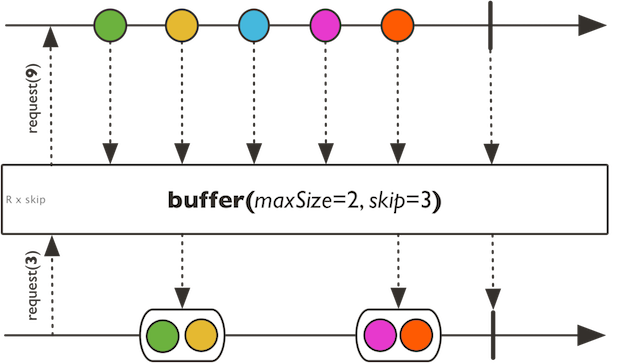
When maxSize > skip : overlapping buffers
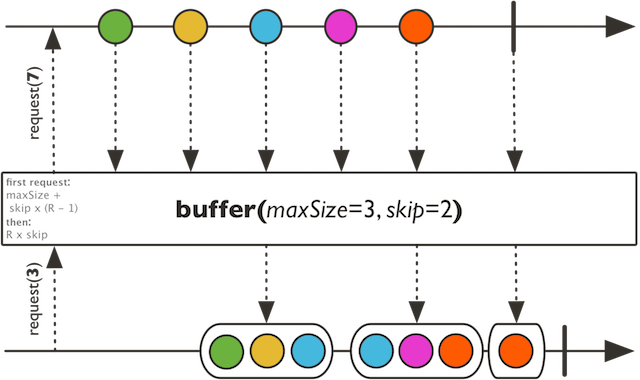
When maxSize == skip : exact buffers

-
buffer
public final <C extends Collection<? super T>> Flux<C> buffer(int maxSize, int skip, Supplier<C> bufferSupplier)
Collect incoming values into multiple user-definedCollectionbuffers that will be emitted by the returnedFluxeach time the given max size is reached or once this Flux completes. Buffers can be created with gaps, as a new buffer will be created every timeskipvalues have been emitted by the sourceWhen maxSize < skip : dropping buffers

When maxSize > skip : overlapping buffers

When maxSize == skip : exact buffers

- Type Parameters:
C- theCollectionbuffer type- Parameters:
skip- the number of items to count before creating a new buffermaxSize- the max collected sizebufferSupplier- aSupplierof the concreteCollectionto use for each buffer- Returns:
- a microbatched
Fluxof possibly overlapped or gappedCollection
-
buffer
public final <C extends Collection<? super T>> Flux<C> buffer(Publisher<?> other, Supplier<C> bufferSupplier)
Collect incoming values into multiple user-definedCollectionbuffers, as delimited by the signals of a companionPublisherthis operator will subscribe to.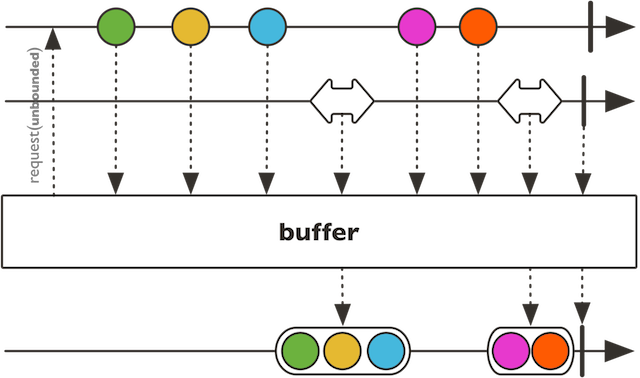
- Type Parameters:
C- theCollectionbuffer type- Parameters:
other- the companionPublisherwhose signals trigger new buffersbufferSupplier- aSupplierof the concreteCollectionto use for each buffer- Returns:
- a microbatched
FluxofCollectiondelimited by signals from aPublisher
-
buffer
public final Flux<List<T>> buffer(Duration timespan, Duration timeshift)
Collect incoming values into multipleListbuffers created at a giventimeshiftperiod. Each buffer will last until thetimespanhas elapsed, thus emitting the bucket in the resultingFlux.When timespan < timeshift : dropping buffers
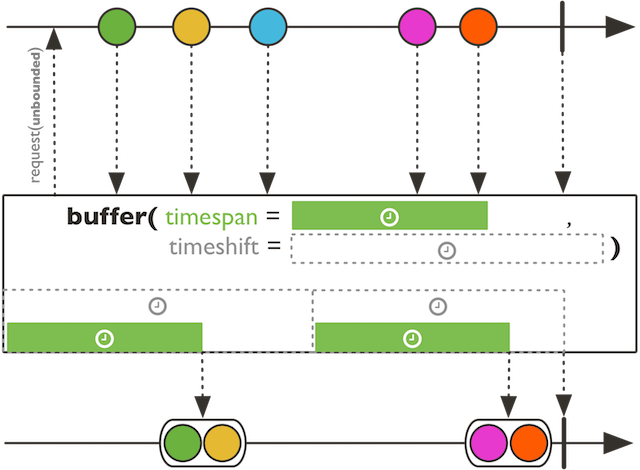
When timespan > timeshift : overlapping buffers
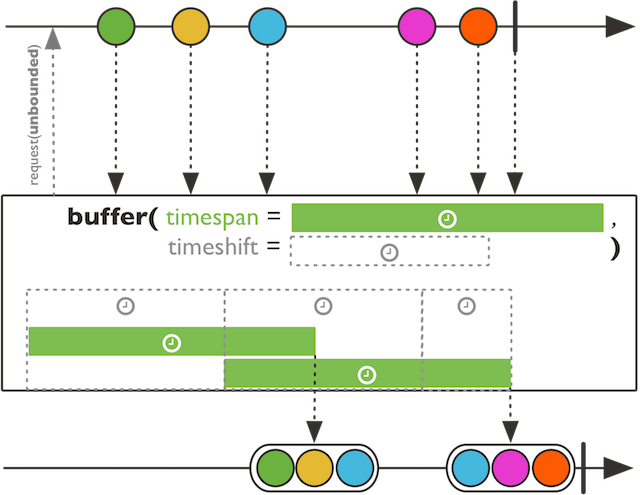
When timespan == timeshift : exact buffers
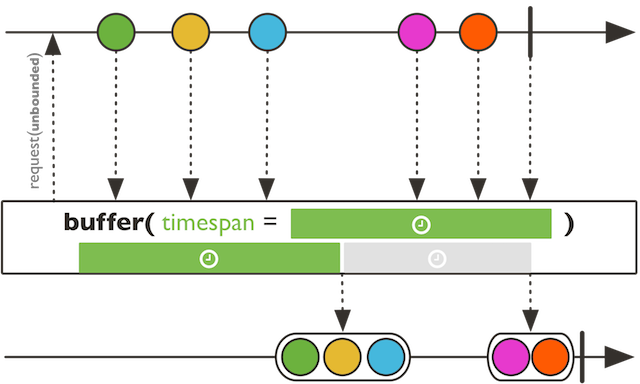
-
buffer
public final Flux<List<T>> buffer(Duration timespan, Duration timeshift, Scheduler timer)
Collect incoming values into multipleListbuffers created at a giventimeshiftperiod, as measured on the providedScheduler. Each buffer will last until thetimespanhas elapsed (also measured on the scheduler), thus emitting the bucket in the resultingFlux.When timespan < timeshift : dropping buffers

When timespan > timeshift : overlapping buffers

When timespan == timeshift : exact buffers

- Parameters:
timespan- the duration from buffer creation until a buffer is closed and emittedtimeshift- the interval at which to create a new buffertimer- a time-capableSchedulerinstance to run on- Returns:
- a microbatched
FluxofListdelimited by the given period timeshift and sized by timespan
-
bufferTimeout
public final <C extends Collection<? super T>> Flux<C> bufferTimeout(int maxSize, Duration timespan, Supplier<C> bufferSupplier)
Collect incoming values into multiple user-definedCollectionbuffers that will be emitted by the returnedFluxeach time the buffer reaches a maximum size OR the timespanDurationelapses.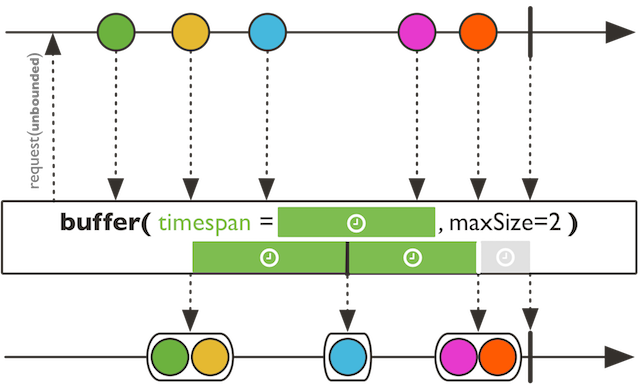
- Type Parameters:
C- theCollectionbuffer type- Parameters:
maxSize- the max collected sizetimespan- the timeout enforcing the release of a partial bufferbufferSupplier- aSupplierof the concreteCollectionto use for each buffer- Returns:
- a microbatched
FluxofCollectiondelimited by given size or a given period timeout
-
bufferTimeout
public final Flux<List<T>> bufferTimeout(int maxSize, Duration timespan, Scheduler timer)
-
bufferTimeout
public final <C extends Collection<? super T>> Flux<C> bufferTimeout(int maxSize, Duration timespan, Scheduler timer, Supplier<C> bufferSupplier)
Collect incoming values into multiple user-definedCollectionbuffers that will be emitted by the returnedFluxeach time the buffer reaches a maximum size OR the timespanDurationelapses, as measured on the providedScheduler.
- Type Parameters:
C- theCollectionbuffer type- Parameters:
maxSize- the max collected sizetimespan- the timeout enforcing the release of a partial buffertimer- a time-capableSchedulerinstance to run onbufferSupplier- aSupplierof the concreteCollectionto use for each buffer- Returns:
- a microbatched
FluxofCollectiondelimited by given size or a given period timeout
-
bufferUntil
public final Flux<List<T>> bufferUntil(Predicate<? super T> predicate)
Collect incoming values into multipleListbuffers that will be emitted by the resultingFluxeach time the given predicate returns true. Note that the element that triggers the predicate to return true (and thus closes a buffer) is included as last element in the emitted buffer.
On completion, if the latest buffer is non-empty and has not been closed it is emitted. However, such a "partial" buffer isn't emitted in case of onError termination.
-
bufferUntil
public final Flux<List<T>> bufferUntil(Predicate<? super T> predicate, boolean cutBefore)
Collect incoming values into multipleListbuffers that will be emitted by the resultingFluxeach time the given predicate returns true. Note that the buffer into which the element that triggers the predicate to return true (and thus closes a buffer) is included depends on thecutBeforeparameter: push it to true to include the boundary element in the newly opened buffer, false to include it in the closed buffer (as inbufferUntil(Predicate)).
On completion, if the latest buffer is non-empty and has not been closed it is emitted. However, such a "partial" buffer isn't emitted in case of onError termination.
-
bufferWhile
public final Flux<List<T>> bufferWhile(Predicate<? super T> predicate)
Collect incoming values into multipleListbuffers that will be emitted by the resultingFlux. Each buffer continues aggregating values while the given predicate returns true, and a new buffer is created as soon as the predicate returns false... Note that the element that triggers the predicate to return false (and thus closes a buffer) is NOT included in any emitted buffer.
On completion, if the latest buffer is non-empty and has not been closed it is emitted. However, such a "partial" buffer isn't emitted in case of onError termination.
-
bufferWhen
public final <U,V> Flux<List<T>> bufferWhen(Publisher<U> bucketOpening, Function<? super U,? extends Publisher<V>> closeSelector)
Collect incoming values into multipleListbuffers started each time an opening companionPublisheremits. Each buffer will last until the corresponding closing companionPublisheremits, thus releasing the buffer to the resultingFlux.When Open signal is strictly not overlapping Close signal : dropping buffers
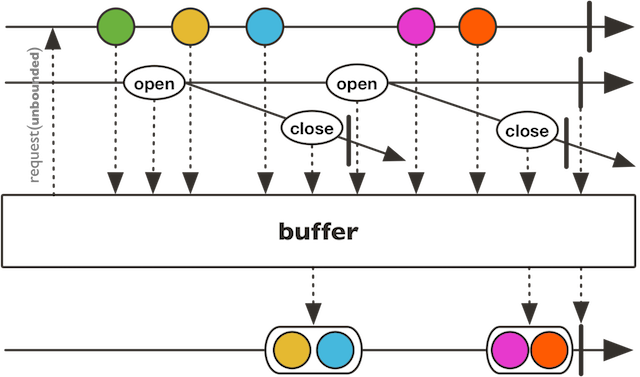
When Open signal is strictly more frequent than Close signal : overlapping buffers

When Open signal is exactly coordinated with Close signal : exact buffers

- Type Parameters:
U- the element type of the buffer-opening sequenceV- the element type of the buffer-closing sequence- Parameters:
bucketOpening- a companionPublisherto subscribe for buffer creation signals.closeSelector- a factory that, given a buffer opening signal, returns a companionPublisherto subscribe to for buffer closure and emission signals.- Returns:
- a microbatched
FluxofListdelimited by an openingPublisherand a relative closingPublisher
-
bufferWhen
public final <U,V,C extends Collection<? super T>> Flux<C> bufferWhen(Publisher<U> bucketOpening, Function<? super U,? extends Publisher<V>> closeSelector, Supplier<C> bufferSupplier)
Collect incoming values into multiple user-definedCollectionbuffers started each time an opening companionPublisheremits. Each buffer will last until the corresponding closing companionPublisheremits, thus releasing the buffer to the resultingFlux.When Open signal is strictly not overlapping Close signal : dropping buffers

When Open signal is strictly more frequent than Close signal : overlapping buffers

When Open signal is exactly coordinated with Close signal : exact buffers

- Type Parameters:
U- the element type of the buffer-opening sequenceV- the element type of the buffer-closing sequenceC- theCollectionbuffer type- Parameters:
bucketOpening- a companionPublisherto subscribe for buffer creation signals.closeSelector- a factory that, given a buffer opening signal, returns a companionPublisherto subscribe to for buffer closure and emission signals.bufferSupplier- aSupplierof the concreteCollectionto use for each buffer- Returns:
- a microbatched
FluxofCollectiondelimited by an openingPublisherand a relative closingPublisher
-
cache
public final Flux<T> cache()
Turn thisFluxinto a hot source and cache last emitted signals for furtherSubscriber. Will retain an unbounded volume of onNext signals. Completion and Error will also be replayed.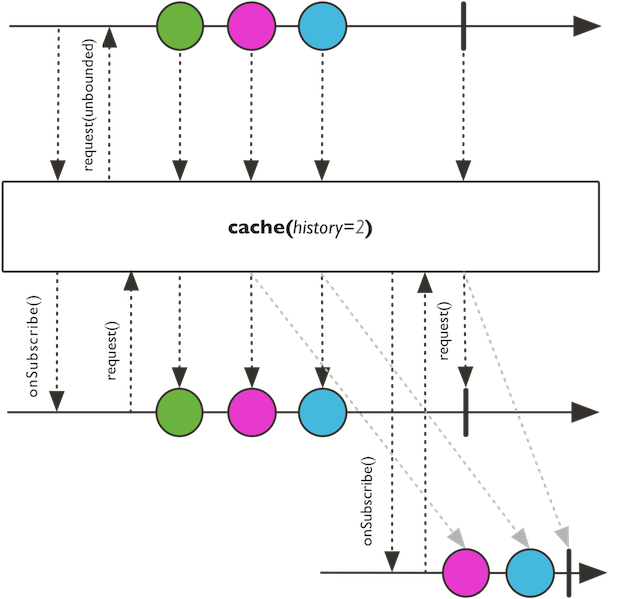
- Returns:
- a replaying
Flux
-
cache
public final Flux<T> cache(int history)
Turn thisFluxinto a hot source and cache last emitted signals for furtherSubscriber. Will retain up to the given history size onNext signals. Completion and Error will also be replayed.Note that
cache(0)will only cache the terminal signal without expiration.
- Parameters:
history- number of elements retained in cache- Returns:
- a replaying
Flux
-
cache
public final Flux<T> cache(Duration ttl)
Turn thisFluxinto a hot source and cache last emitted signals for furtherSubscriber. Will retain an unbounded history but apply a per-item expiry timeoutCompletion and Error will also be replayed until
ttltriggers in which case the nextSubscriberwill start over a new subscription.
- Parameters:
ttl- Time-to-live for each cached item and post termination.- Returns:
- a replaying
Flux
-
cache
public final Flux<T> cache(int history, Duration ttl)
Turn thisFluxinto a hot source and cache last emitted signals for furtherSubscriber. Will retain up to the given history size and apply a per-item expiry timeout.Completion and Error will also be replayed until
ttltriggers in which case the nextSubscriberwill start over a new subscription.
- Parameters:
history- number of elements retained in cachettl- Time-to-live for each cached item and post termination.- Returns:
- a replaying
Flux
-
cast
public final <E> Flux<E> cast(Class<E> clazz)
Cast the currentFluxproduced type into a target produced type.
-
checkpoint
public final Flux<T> checkpoint()
Activate assembly tracing for this particularFlux, in case of an error upstream of the checkpoint. Tracing incurs the cost of an exception stack trace creation.It should be placed towards the end of the reactive chain, as errors triggered downstream of it cannot be observed and augmented with assembly trace.
- Returns:
- the assembly tracing
Flux.
-
checkpoint
public final Flux<T> checkpoint(String description)
Activate assembly marker for this particularFluxby giving it a description that will be reflected in the assembly traceback in case of an error upstream of the checkpoint. Note that unlikecheckpoint(), this doesn't create a filled stack trace, avoiding the main cost of the operator. However, as a trade-off the description must be unique enough for the user to find out where this Flux was assembled. If you only want a generic description, and still rely on the stack trace to find the assembly site, use thecheckpoint(String, boolean)variant.It should be placed towards the end of the reactive chain, as errors triggered downstream of it cannot be observed and augmented with assembly trace.
- Parameters:
description- a unique enough description to include in the light assembly traceback.- Returns:
- the assembly marked
Flux
-
checkpoint
public final Flux<T> checkpoint(@Nullable String description, boolean forceStackTrace)
Activate assembly tracing or the lighter assembly marking depending on theforceStackTraceoption.By setting the
forceStackTraceparameter to true, activate assembly tracing for this particularFluxand give it a description that will be reflected in the assembly traceback in case of an error upstream of the checkpoint. Note that unlikecheckpoint(String), this will incur the cost of an exception stack trace creation. The description could for example be a meaningful name for the assembled flux or a wider correlation ID, since the stack trace will always provide enough information to locate where this Flux was assembled.By setting
forceStackTraceto false, behaves likecheckpoint(String)and is subject to the same caveat in choosing the description.It should be placed towards the end of the reactive chain, as errors triggered downstream of it cannot be observed and augmented with assembly marker.
- Parameters:
description- a description (must be unique enough if forceStackTrace is push to false).forceStackTrace- false to make a light checkpoint without a stacktrace, true to use a stack trace.- Returns:
- the assembly marked
Flux.
-
collect
public final <E> Mono<E> collect(Supplier<E> containerSupplier, BiConsumer<E,? super T> collector)
Collect all elements emitted by thisFluxinto a user-defined container, by applying a collectorBiConsumertaking the container and each element. The collected result will be emitted when this sequence completes.
- Type Parameters:
E- the container type- Parameters:
containerSupplier- the supplier of the container instance for each Subscribercollector- a consumer of both the container instance and the value being currently collected- Returns:
- a
Monoof the collected container on complete
-
collectMap
public final <K> Mono<Map<K,T>> collectMap(Function<? super T,? extends K> keyExtractor)
Collect all elements emitted by thisFluxinto a hashedMapthat is emitted by the resultingMonowhen this sequence completes. The key is extracted from each element by applying thekeyExtractorFunction. In case several elements map to the same key, the associated value will be the most recently emitted element.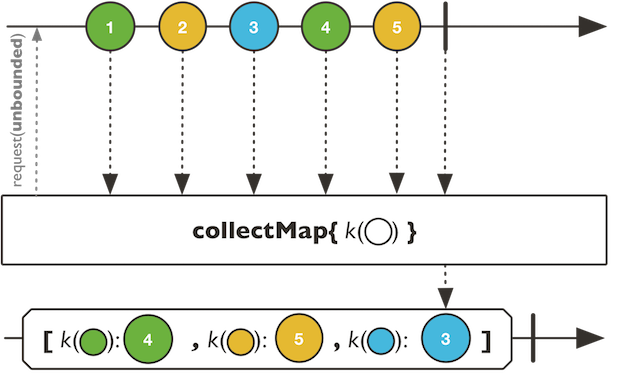
-
collectMap
public final <K,V> Mono<Map<K,V>> collectMap(Function<? super T,? extends K> keyExtractor, Function<? super T,? extends V> valueExtractor)
Collect all elements emitted by thisFluxinto a hashedMapthat is emitted by the resultingMonowhen this sequence completes. The key is extracted from each element by applying thekeyExtractorFunction, and the value is extracted by thevalueExtractorFunction. In case several elements map to the same key, the associated value will be derived from the most recently emitted element.
- Type Parameters:
K- the type of the key extracted from each source elementV- the type of the value extracted from each source element- Parameters:
keyExtractor- aFunctionto map elements to a key for theMapvalueExtractor- aFunctionto map elements to a value for theMap- Returns:
- a
Monoof aMapof key-element pairs (only including latest element's value in case of key conflicts)
-
collectMap
public final <K,V> Mono<Map<K,V>> collectMap(Function<? super T,? extends K> keyExtractor, Function<? super T,? extends V> valueExtractor, Supplier<Map<K,V>> mapSupplier)
Collect all elements emitted by thisFluxinto a user-definedMapthat is emitted by the resultingMonowhen this sequence completes. The key is extracted from each element by applying thekeyExtractorFunction, and the value is extracted by thevalueExtractorFunction. In case several elements map to the same key, the associated value will be derived from the most recently emitted element.
- Type Parameters:
K- the type of the key extracted from each source elementV- the type of the value extracted from each source element- Parameters:
keyExtractor- aFunctionto map elements to a key for theMapvalueExtractor- aFunctionto map elements to a value for theMapmapSupplier- aMapfactory called for eachSubscriber- Returns:
- a
Monoof aMapof key-value pairs (only including latest element's value in case of key conflicts)
-
collectMultimap
public final <K> Mono<Map<K,Collection<T>>> collectMultimap(Function<? super T,? extends K> keyExtractor)
-
collectMultimap
public final <K,V> Mono<Map<K,Collection<V>>> collectMultimap(Function<? super T,? extends K> keyExtractor, Function<? super T,? extends V> valueExtractor)
Collect all elements emitted by thisFluxinto amultimapthat is emitted by the resultingMonowhen this sequence completes. The key is extracted from each element by applying thekeyExtractorFunction, and every element mapping to the same key is converted by thevalueExtractorFunction to a value stored in theListassociated to said key.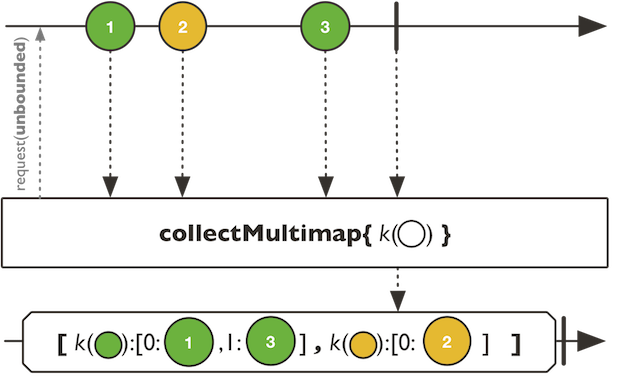
- Type Parameters:
K- the type of the key extracted from each source elementV- the type of the value extracted from each source element- Parameters:
keyExtractor- aFunctionto map elements to a key for theMapvalueExtractor- aFunctionto map elements to a value for theMap- Returns:
- a
Monoof aMapof key-List(values) pairs
-
collectMultimap
public final <K,V> Mono<Map<K,Collection<V>>> collectMultimap(Function<? super T,? extends K> keyExtractor, Function<? super T,? extends V> valueExtractor, Supplier<Map<K,Collection<V>>> mapSupplier)
Collect all elements emitted by thisFluxinto a user-definedmultimapthat is emitted by the resultingMonowhen this sequence completes. The key is extracted from each element by applying thekeyExtractorFunction, and every element mapping to the same key is converted by thevalueExtractorFunction to a value stored in theCollectionassociated to said key.
- Type Parameters:
K- the type of the key extracted from each source elementV- the type of the value extracted from each source element- Parameters:
keyExtractor- aFunctionto map elements to a key for theMapvalueExtractor- aFunctionto map elements to a value for theMapmapSupplier- a multimap (MapofCollection) factory called for eachSubscriber- Returns:
- a
Monoof aMapof key-Collection(values) pairs
-
collectSortedList
public final Mono<List<T>> collectSortedList(@Nullable Comparator<? super T> comparator)
Collect all elements emitted by thisFluxuntil this sequence completes, and then sort them using aComparatorinto aListthat is emitted by the resultingMono.
- Parameters:
comparator- aComparatorto sort the items of this sequences- Returns:
- a
Monoof a sortedListof all values from thisFlux
-
compose
public final <V> Flux<V> compose(Function<? super Flux<T>,? extends Publisher<V>> transformer)
Defer the transformation of thisFluxin order to generate a targetFluxtype. A transformation will occur for eachSubscriber. For instance:flux.compose(Mono::from).subscribe()- Type Parameters:
V- the item type in the returnedPublisher- Parameters:
transformer- theFunctionto lazily map thisFluxinto a targetPublisherinstance for each new subscriber- Returns:
- a new
Flux - See Also:
transform() for immmediate transformation of {@link Flux},as() for a loose conversion to an arbitrary type
-
concatMap
public final <V> Flux<V> concatMap(Function<? super T,? extends Publisher<? extends V>> mapper)
Transform the elements emitted by thisFluxasynchronously into Publishers, then flatten these inner publishers into a singleFlux, sequentially and preserving order using concatenation.There are three dimensions to this operator that can be compared with
flatMapandflatMapSequential:- Generation of inners and subscription: this operator waits for one inner to complete before generating the next one and subscribing to it.
- Ordering of the flattened values: this operator naturally preserves the same order as the source elements, concatenating the inners from each source element sequentially.
- Interleaving: this operator does not let values from different inners interleave (concatenation).
Errors will immediately short circuit current concat backlog.
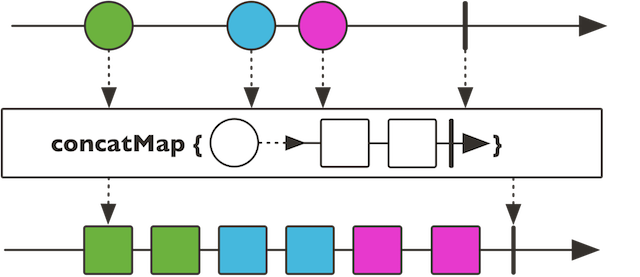
- Type Parameters:
V- the produced concatenated type- Parameters:
mapper- the function to transform this sequence of T into concatenated sequences of V- Returns:
- a concatenated
Flux
-
concatMap
public final <V> Flux<V> concatMap(Function<? super T,? extends Publisher<? extends V>> mapper, int prefetch)
Transform the elements emitted by thisFluxasynchronously into Publishers, then flatten these inner publishers into a singleFlux, sequentially and preserving order using concatenation.There are three dimensions to this operator that can be compared with
flatMapandflatMapSequential:- Generation of inners and subscription: this operator waits for one inner to complete before generating the next one and subscribing to it.
- Ordering of the flattened values: this operator naturally preserves the same order as the source elements, concatenating the inners from each source element sequentially.
- Interleaving: this operator does not let values from different inners interleave (concatenation).
Errors will immediately short circuit current concat backlog. The prefetch argument allows to give an arbitrary prefetch size to the inner
Publisher.
- Type Parameters:
V- the produced concatenated type- Parameters:
mapper- the function to transform this sequence of T into concatenated sequences of Vprefetch- the inner source produced demand- Returns:
- a concatenated
Flux
-
concatMapDelayError
public final <V> Flux<V> concatMapDelayError(Function<? super T,Publisher<? extends V>> mapper)
Transform the elements emitted by thisFluxasynchronously into Publishers, then flatten these inner publishers into a singleFlux, sequentially and preserving order using concatenation.There are three dimensions to this operator that can be compared with
flatMapandflatMapSequential:- Generation of inners and subscription: this operator waits for one inner to complete before generating the next one and subscribing to it.
- Ordering of the flattened values: this operator naturally preserves the same order as the source elements, concatenating the inners from each source element sequentially.
- Interleaving: this operator does not let values from different inners interleave (concatenation).
Errors in the individual publishers will be delayed after the current concat backlog, usually stopping the sequence at the source that triggered the error.

- Type Parameters:
V- the produced concatenated type- Parameters:
mapper- the function to transform this sequence of T into concatenated sequences of V- Returns:
- a concatenated
Flux
-
concatMapDelayError
public final <V> Flux<V> concatMapDelayError(Function<? super T,? extends Publisher<? extends V>> mapper, int prefetch)
Transform the elements emitted by thisFluxasynchronously into Publishers, then flatten these inner publishers into a singleFlux, sequentially and preserving order using concatenation.There are three dimensions to this operator that can be compared with
flatMapandflatMapSequential:- Generation of inners and subscription: this operator waits for one inner to complete before generating the next one and subscribing to it.
- Ordering of the flattened values: this operator naturally preserves the same order as the source elements, concatenating the inners from each source element sequentially.
- Interleaving: this operator does not let values from different inners interleave (concatenation).
Errors in the individual publishers will be delayed after the current concat backlog, usually stopping the sequence at the source that triggered the error. The prefetch argument allows to give an arbitrary prefetch size to the inner
Publisher.
- Type Parameters:
V- the produced concatenated type- Parameters:
mapper- the function to transform this sequence of T into concatenated sequences of Vprefetch- the inner source produced demand- Returns:
- a concatenated
Flux
-
concatMapDelayError
public final <V> Flux<V> concatMapDelayError(Function<? super T,? extends Publisher<? extends V>> mapper, boolean delayUntilEnd, int prefetch)
Transform the elements emitted by thisFluxasynchronously into Publishers, then flatten these inner publishers into a singleFlux, sequentially and preserving order using concatenation.There are three dimensions to this operator that can be compared with
flatMapandflatMapSequential:- Generation of inners and subscription: this operator waits for one inner to complete before generating the next one and subscribing to it.
- Ordering of the flattened values: this operator naturally preserves the same order as the source elements, concatenating the inners from each source element sequentially.
- Interleaving: this operator does not let values from different inners interleave (concatenation).
Errors in the individual publishers will be delayed after the current concat backlog if delayUntilEnd is false or after all sources if delayUntilEnd is true. The prefetch argument allows to give an arbitrary prefetch size to the inner
Publisher.
- Type Parameters:
V- the produced concatenated type- Parameters:
mapper- the function to transform this sequence of T into concatenated sequences of VdelayUntilEnd- delay error until all sources have been consumed instead of after the current sourceprefetch- the inner source produced demand- Returns:
- a concatenated
Flux
-
concatMapIterable
public final <R> Flux<R> concatMapIterable(Function<? super T,? extends Iterable<? extends R>> mapper)
Transform the items emitted by thisFluxintoIterable, then flatten the elements from those by concatenating them into a singleFlux.
Note that unlike
flatMap(Function)andconcatMap(Function), with Iterable there is no notion of eager vs lazy inner subscription. The content of the Iterables are all played sequentially. ThusflatMapIterableandconcatMapIterableare equivalent offered as a discoverability improvement for users that explore the API with the concat vs flatMap expectation.
-
concatMapIterable
public final <R> Flux<R> concatMapIterable(Function<? super T,? extends Iterable<? extends R>> mapper, int prefetch)
Transform the items emitted by thisFluxintoIterable, then flatten the emissions from those by concatenating them into a singleFlux. The prefetch argument allows to give an arbitrary prefetch size to the mergedIterable.
Note that unlike
flatMap(Function)andconcatMap(Function), with Iterable there is no notion of eager vs lazy inner subscription. The content of the Iterables are all played sequentially. ThusflatMapIterableandconcatMapIterableare equivalent offered as a discoverability improvement for users that explore the API with the concat vs flatMap expectation.- Type Parameters:
R- the merged output sequence type- Parameters:
mapper- theFunctionto transform input sequence into NIterableprefetch- the maximum in-flight elements from each innerIterablesequence- Returns:
- a concatenation of the values from the Iterables obtained from each element in this
Flux
-
count
public final Mono<Long> count()
Counts the number of values in thisFlux. The count will be emitted when onComplete is observed.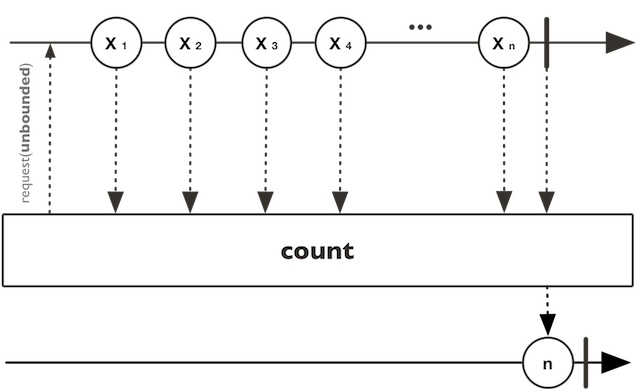
-
defaultIfEmpty
public final Flux<T> defaultIfEmpty(T defaultV)
Provide a default unique value if this sequence is completed without any data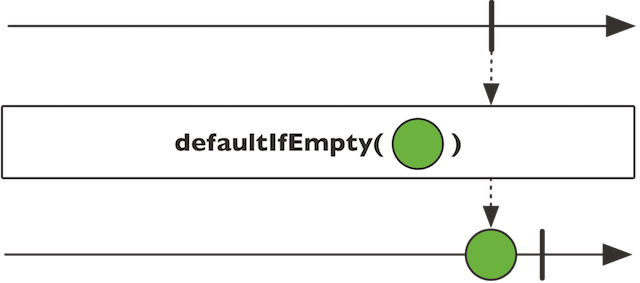
- Parameters:
defaultV- the alternate value if this sequence is empty- Returns:
- a new
Flux
-
delayElements
public final Flux<T> delayElements(Duration delay)
Delay each of thisFluxelements (Subscriber.onNext(T)signals) by a givenDuration. Signals are delayed and continue on theparalleldefault Scheduler, but empty sequences or immediate error signals are not delayed.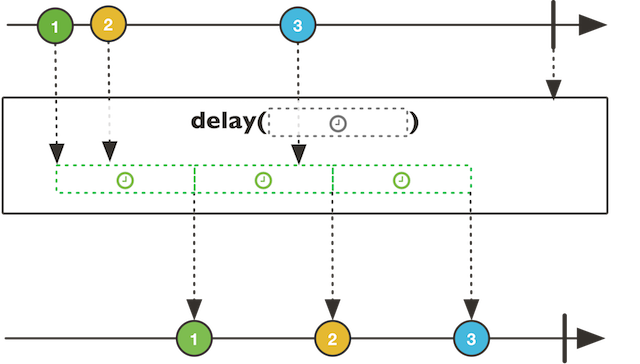
- Parameters:
delay- duration by which to delay eachSubscriber.onNext(T)signal- Returns:
- a delayed
Flux - See Also:
delaySubscription to introduce a delay at the beginning of the sequence only
-
delayElements
public final Flux<T> delayElements(Duration delay, Scheduler timer)
Delay each of thisFluxelements (Subscriber.onNext(T)signals) by a givenDuration. Signals are delayed and continue on an user-specifiedScheduler, but empty sequences or immediate error signals are not delayed.
- Parameters:
delay- period to delay eachSubscriber.onNext(T)signaltimer- a time-capableSchedulerinstance to delay each signal on- Returns:
- a delayed
Flux
-
delaySequence
public final Flux<T> delaySequence(Duration delay)
Shift thisFluxforward in time by a givenDuration. Unlike withdelayElements(Duration), elements are shifted forward in time as they are emitted, always resulting in the delay between two elements being the same as in the source (only the first element is visibly delayed from the previous event, that is the subscription). Signals are delayed and continue on theparallelScheduler, but empty sequences or immediate error signals are not delayed.With this operator, a source emitting at 10Hz with a delaySequence
Durationof 1s will still emit at 10Hz, with an initial "hiccup" of 1s. On the other hand,delayElements(Duration)would end up emitting at 1Hz.This is closer to
delaySubscription(Duration), except the source is subscribed to immediately.
-
delaySequence
public final Flux<T> delaySequence(Duration delay, Scheduler timer)
Shift thisFluxforward in time by a givenDuration. Unlike withdelayElements(Duration, Scheduler), elements are shifted forward in time as they are emitted, always resulting in the delay between two elements being the same as in the source (only the first element is visibly delayed from the previous event, that is the subscription). Signals are delayed and continue on an user-specifiedScheduler, but empty sequences or immediate error signals are not delayed.With this operator, a source emitting at 10Hz with a delaySequence
Durationof 1s will still emit at 10Hz, with an initial "hiccup" of 1s. On the other hand,delayElements(Duration, Scheduler)would end up emitting at 1Hz.This is closer to
delaySubscription(Duration, Scheduler), except the source is subscribed to immediately.
-
delayUntil
public final Flux<T> delayUntil(Function<? super T,? extends Publisher<?>> triggerProvider)
Subscribe to thisFluxand generate aPublisherfrom each of this Flux elements, each acting as a trigger for relaying said element.That is to say, the resulting
Fluxdelays each of its emission until the associated trigger Publisher terminates.In case of an error either in the source or in a trigger, that error is propagated immediately downstream. Note that unlike with the
Mono variantthere is no fusion of subsequent calls.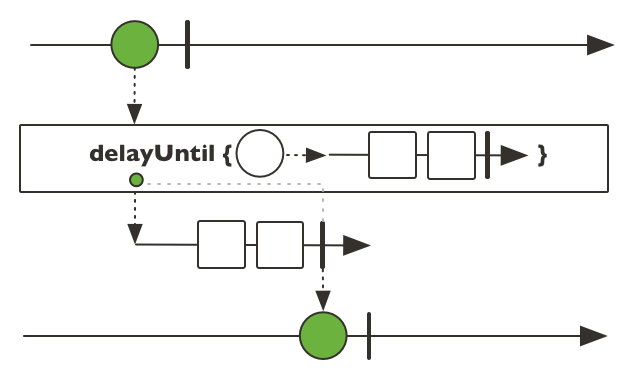
-
delaySubscription
public final Flux<T> delaySubscription(Duration delay)
Delay thesubscriptionto thisFluxsource until the given period elapses. The delay is introduced through theparalleldefault Scheduler.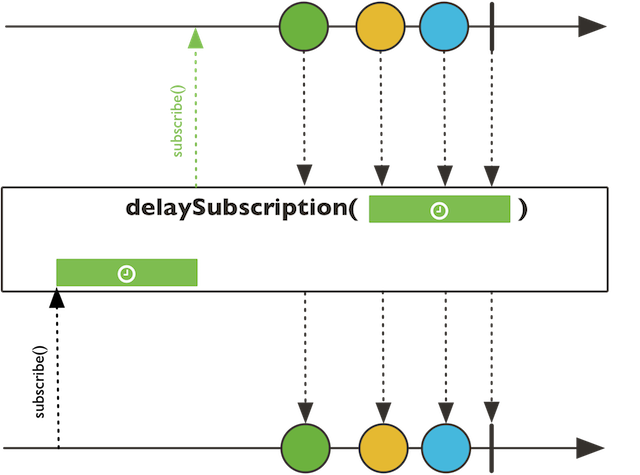
-
delaySubscription
public final Flux<T> delaySubscription(Duration delay, Scheduler timer)
Delay thesubscriptionto thisFluxsource until the given period elapses, as measured on the user-providedScheduler.
-
delaySubscription
public final <U> Flux<T> delaySubscription(Publisher<U> subscriptionDelay)
- Type Parameters:
U- the other source type- Parameters:
subscriptionDelay- a companionPublisherwhose onNext/onComplete signal will trigger thesubscription- Returns:
- a delayed
Flux
-
dematerialize
public final <X> Flux<X> dematerialize()
An operator working only if thisFluxemits onNext, onError or onCompleteSignalinstances, transforming thesematerializedsignals into real signals on theSubscriber. The errorSignalwill trigger onError and completeSignalwill trigger onComplete.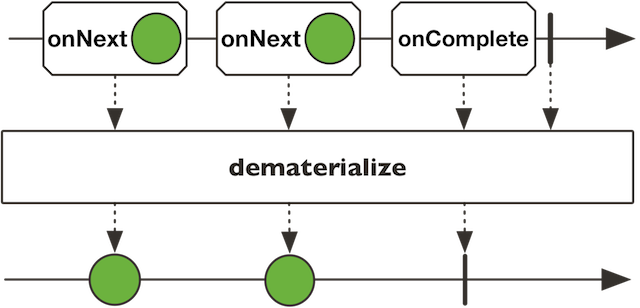
- Type Parameters:
X- the dematerialized type- Returns:
- a dematerialized
Flux - See Also:
materialize()
-
distinct
public final Flux<T> distinct()
For eachSubscriber, track elements from thisFluxthat have been seen and filter out duplicates.The values themselves are recorded into a
HashSetfor distinct detection. Usedistinct(Object::hashcode)if you want a more lightweight approach that doesn't retain all the objects, but is more susceptible to falsely considering two elements as distinct due to a hashcode collision.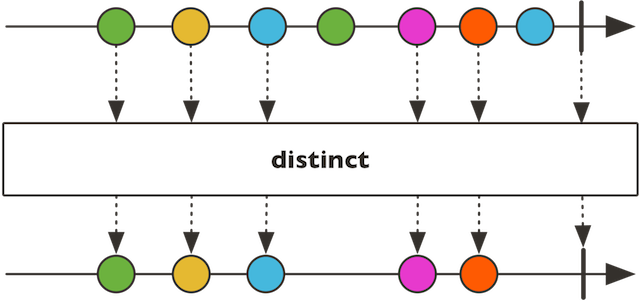
- Returns:
- a filtering
Fluxonly emitting distinct values
-
distinct
public final <V> Flux<T> distinct(Function<? super T,? extends V> keySelector)
For eachSubscriber, track elements from thisFluxthat have been seen and filter out duplicates, as compared by a key extracted through the user providedFunction.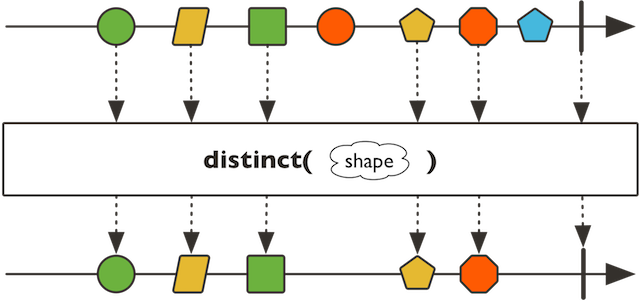
- Type Parameters:
V- the type of the key extracted from each value in this sequence- Parameters:
keySelector- function to compute comparison key for each element- Returns:
- a filtering
Fluxonly emitting values with distinct keys
-
distinct
public final <V,C extends Collection<? super V>> Flux<T> distinct(Function<? super T,? extends V> keySelector, Supplier<C> distinctCollectionSupplier)
For eachSubscriber, track elements from thisFluxthat have been seen and filter out duplicates, as compared by a key extracted through the user providedFunctionand by theadd methodof theCollectionsupplied (typically aSet).
- Type Parameters:
V- the type of the key extracted from each value in this sequenceC- the type of Collection used for distinct checking of keys- Parameters:
keySelector- function to compute comparison key for each elementdistinctCollectionSupplier- supplier of theCollectionused for distinct check throughaddof the key.- Returns:
- a filtering
Fluxonly emitting values with distinct keys
-
distinct
public final <V,C> Flux<T> distinct(Function<? super T,? extends V> keySelector, Supplier<C> distinctStoreSupplier, BiPredicate<C,V> distinctPredicate, Consumer<C> cleanup)
For eachSubscriber, track elements from thisFluxthat have been seen and filter out duplicates, as compared by applying aBiPredicateon an arbitrary user-supplied<C>store and a key extracted through the user providedFunction. The BiPredicate should typically add the key to the arbitrary store for further comparison. A cleanup callback is also invoked on the store upon termination of the sequence.
- Type Parameters:
V- the type of the key extracted from each value in this sequenceC- the type of store backing theBiPredicate- Parameters:
keySelector- function to compute comparison key for each elementdistinctStoreSupplier- supplier of the arbitrary store object used in distinct checks along the extracted key.distinctPredicate- theBiPredicateto apply to the arbitrary store + extracted key to perform a distinct check. Since nothing is assumed of the store, this predicate should also add the key to the store as necessary.cleanup- the cleanup callback to invoke on the store upon termination.- Returns:
- a filtering
Fluxonly emitting values with distinct keys
-
distinctUntilChanged
public final Flux<T> distinctUntilChanged()
Filter out subsequent repetitions of an element (that is, if they arrive right after one another).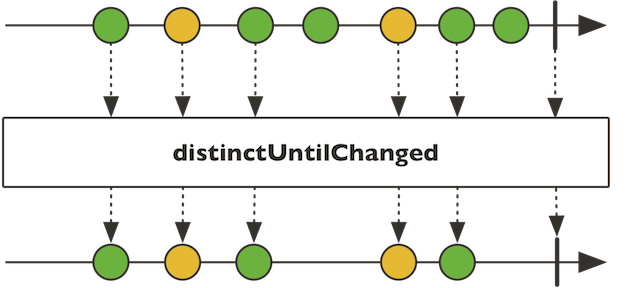
The values themselves are recorded into a
HashSetfor distinct detection. UsedistinctUntilChanged(Object::hashcode)if you want a more lightweight approach that doesn't retain all the objects, but is more susceptible to falsely considering two elements as distinct due to a hashcode collision.- Returns:
- a filtering
Fluxwith only one occurrence in a row of each element (yet elements can repeat in the overall sequence)
-
distinctUntilChanged
public final <V> Flux<T> distinctUntilChanged(Function<? super T,? extends V> keySelector)
Filter out subsequent repetitions of an element (that is, if they arrive right after one another), as compared by a key extracted through the user providedFunctionusing equality.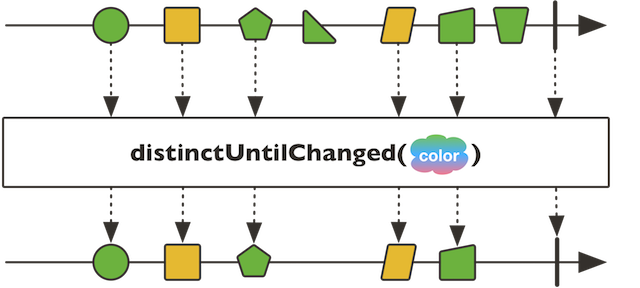
- Type Parameters:
V- the type of the key extracted from each value in this sequence- Parameters:
keySelector- function to compute comparison key for each element- Returns:
- a filtering
Fluxwith only one occurrence in a row of each element of the same key (yet element keys can repeat in the overall sequence)
-
distinctUntilChanged
public final <V> Flux<T> distinctUntilChanged(Function<? super T,? extends V> keySelector, BiPredicate<? super V,? super V> keyComparator)
Filter out subsequent repetitions of an element (that is, if they arrive right after one another), as compared by a key extracted through the user providedFunctionand then comparing keys with the suppliedBiPredicate.
- Type Parameters:
V- the type of the key extracted from each value in this sequence- Parameters:
keySelector- function to compute comparison key for each elementkeyComparator- predicate used to compare keys.- Returns:
- a filtering
Fluxwith only one occurrence in a row of each element of the same key for which the predicate returns true (yet element keys can repeat in the overall sequence)
-
doAfterTerminate
public final Flux<T> doAfterTerminate(Runnable afterTerminate)
Add behavior (side-effect) triggered after theFluxterminates, either by completing downstream successfully or with an error.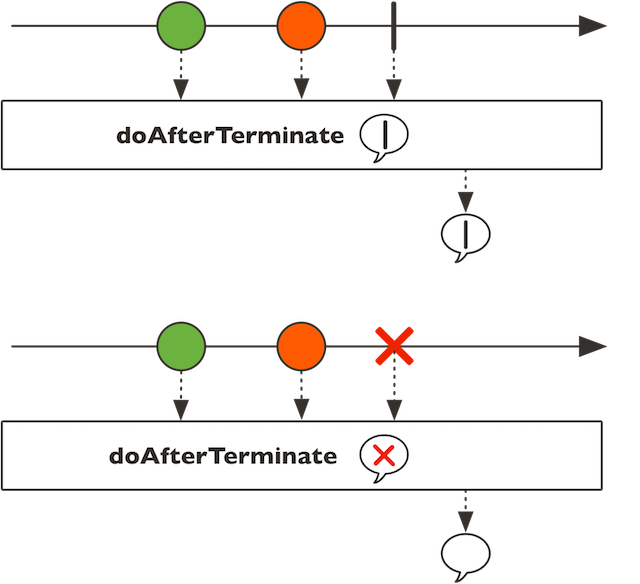
- Parameters:
afterTerminate- the callback to call afterSubscriber.onComplete()orSubscriber.onError(java.lang.Throwable)- Returns:
- an observed
Flux
-
doOnCancel
public final Flux<T> doOnCancel(Runnable onCancel)
Add behavior (side-effect) triggered when theFluxis cancelled.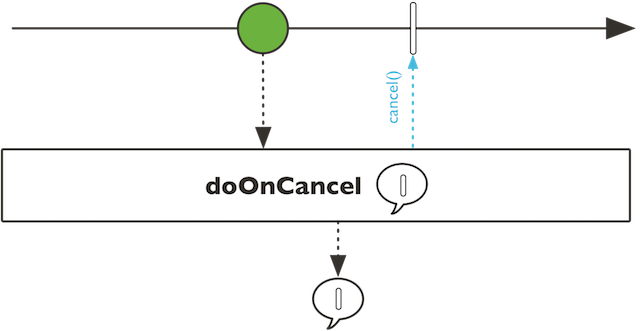
- Parameters:
onCancel- the callback to call onSubscription.cancel()- Returns:
- an observed
Flux
-
doOnComplete
public final Flux<T> doOnComplete(Runnable onComplete)
Add behavior (side-effect) triggered when theFluxcompletes successfully.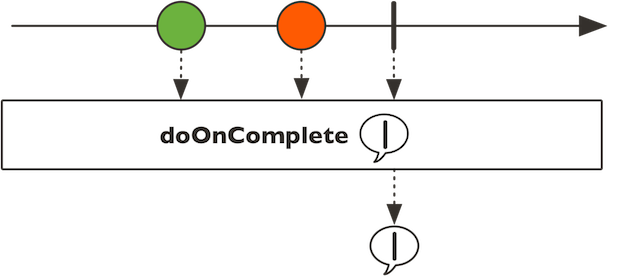
- Parameters:
onComplete- the callback to call onSubscriber.onComplete()- Returns:
- an observed
Flux
-
doOnEach
public final Flux<T> doOnEach(Consumer<? super Signal<T>> signalConsumer)
Add behavior (side-effects) triggered when theFluxemits an item, fails with an error or completes successfully. All these events are represented as aSignalthat is passed to the side-effect callback. Note that this is an advanced operator, typically used for monitoring of a Flux. TheseSignalhave aContextassociated to them.- Parameters:
signalConsumer- the mandatory callback to call onSubscriber.onNext(Object),Subscriber.onError(Throwable)andSubscriber.onComplete()- Returns:
- an observed
Flux - See Also:
doOnNext(Consumer),doOnError(Consumer),doOnComplete(Runnable),materialize(),Signal
-
doOnError
public final Flux<T> doOnError(Consumer<? super Throwable> onError)
Add behavior (side-effect) triggered when theFluxcompletes with an error.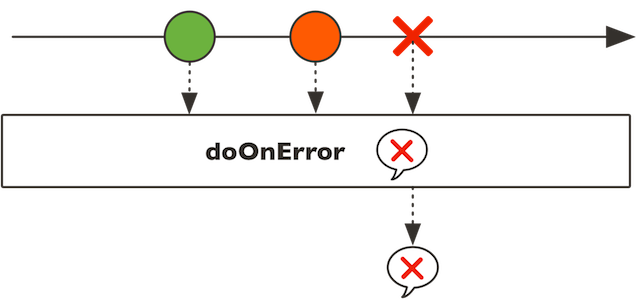
- Parameters:
onError- the callback to call onSubscriber.onError(java.lang.Throwable)- Returns:
- an observed
Flux
-
doOnError
public final <E extends Throwable> Flux<T> doOnError(Class<E> exceptionType, Consumer<? super E> onError)
Add behavior (side-effect) triggered when theFluxcompletes with an error matching the given exception type.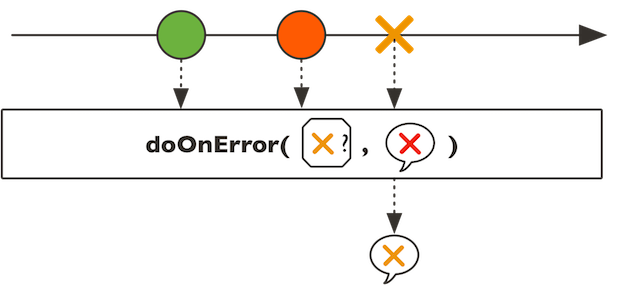
- Type Parameters:
E- type of the error to handle- Parameters:
exceptionType- the type of exceptions to handleonError- the error handler for each error- Returns:
- an observed
Flux
-
doOnError
public final Flux<T> doOnError(Predicate<? super Throwable> predicate, Consumer<? super Throwable> onError)
Add behavior (side-effect) triggered when theFluxcompletes with an error matching the given exception.
- Parameters:
predicate- the matcher for exceptions to handleonError- the error handler for each error- Returns:
- an observed
Flux
-
doOnNext
public final Flux<T> doOnNext(Consumer<? super T> onNext)
Add behavior (side-effect) triggered when theFluxemits an item.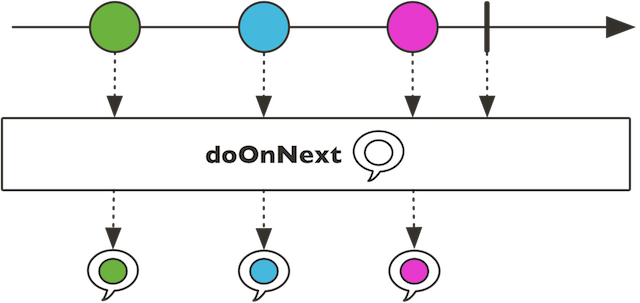
- Parameters:
onNext- the callback to call onSubscriber.onNext(T)- Returns:
- an observed
Flux
-
doOnRequest
public final Flux<T> doOnRequest(LongConsumer consumer)
Add behavior (side-effect) triggering aLongConsumerwhen thisFluxreceives any request.Note that non fatal error raised in the callback will not be propagated and will simply trigger
Operators.onOperatorError(Throwable, Context).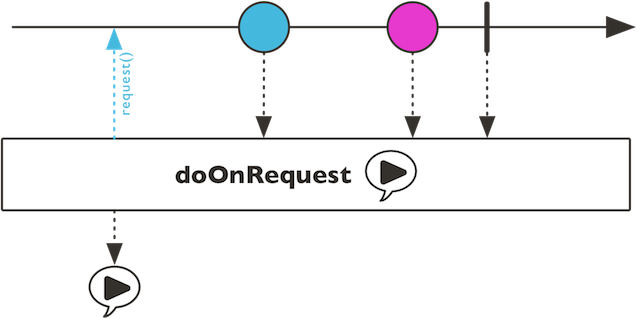
- Parameters:
consumer- the consumer to invoke on each request- Returns:
- an observed
Flux
-
doOnSubscribe
public final Flux<T> doOnSubscribe(Consumer<? super Subscription> onSubscribe)
Add behavior (side-effect) triggered when theFluxis subscribed.This method is not intended for capturing the subscription and calling its methods, but for side effects like monitoring. For instance, the correct way to cancel a subscription is to call
Disposable.dispose()on the Disposable returned bysubscribe().
- Parameters:
onSubscribe- the callback to call onSubscriber.onSubscribe(org.reactivestreams.Subscription)- Returns:
- an observed
Flux
-
doOnTerminate
public final Flux<T> doOnTerminate(Runnable onTerminate)
Add behavior (side-effect) triggered when theFluxterminates, either by completing successfully or with an error.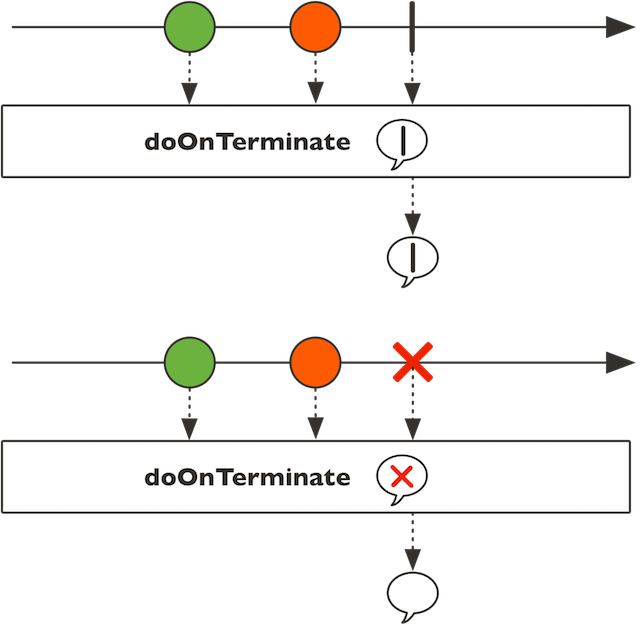
- Parameters:
onTerminate- the callback to call onSubscriber.onComplete()orSubscriber.onError(java.lang.Throwable)- Returns:
- an observed
Flux
-
doFinally
public final Flux<T> doFinally(Consumer<SignalType> onFinally)
Add behavior (side-effect) triggered after theFluxterminates for any reason, including cancellation. The terminating event (SignalType.ON_COMPLETE,SignalType.ON_ERRORandSignalType.CANCEL) is passed to the consumer, which is executed after the signal has been passed downstream.Note that the fact that the signal is propagated downstream before the callback is executed means that several doFinally in a row will be executed in reverse order. If you want to assert the execution of the callback please keep in mind that the Flux will complete before it is executed, so its effect might not be visible immediately after eg. a
blockLast().- Parameters:
onFinally- the callback to execute after a terminal signal (complete, error or cancel)- Returns:
- an observed
Flux
-
elapsed
public final Flux<Tuple2<Long,T>> elapsed()
Map thisFluxintoTuple2<Long, T>of timemillis and source data. The timemillis corresponds to the elapsed time between each signal as measured by theparallelscheduler. First duration is measured between the subscription and the first element.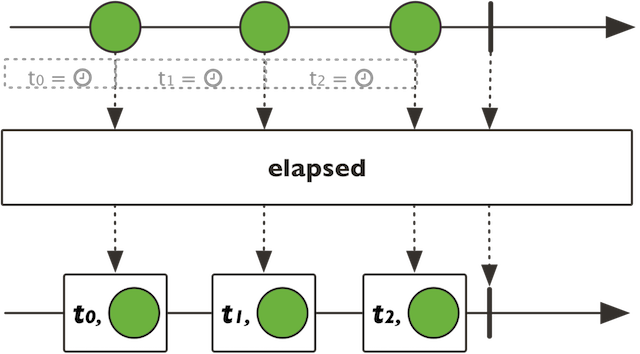
- Returns:
- a new
Fluxthat emits a tuple of time elapsed in milliseconds and matching data
-
elapsed
public final Flux<Tuple2<Long,T>> elapsed(Scheduler scheduler)
Map thisFluxintoTuple2<Long, T>of timemillis and source data. The timemillis corresponds to the elapsed time between each signal as measured by the providedScheduler. First duration is measured between the subscription and the first element.
- Parameters:
scheduler- aSchedulerinstance toread time from- Returns:
- a new
Fluxthat emits tuples of time elapsed in milliseconds and matching data
-
elementAt
public final Mono<T> elementAt(int index)
Emit only the element at the given index position orIndexOutOfBoundsExceptionif the sequence is shorter.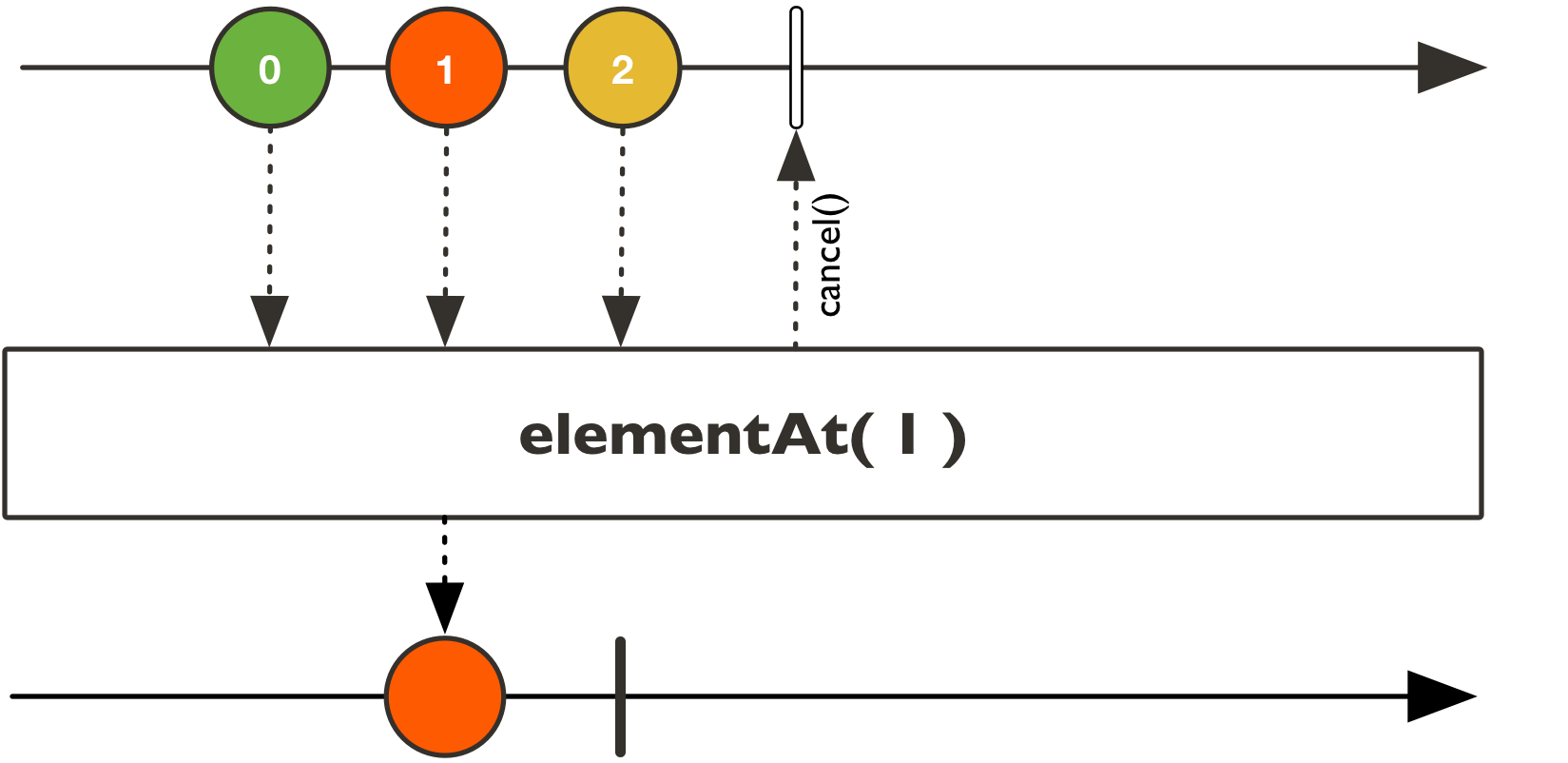
- Parameters:
index- zero-based index of the only item to emit- Returns:
- a
Monoof the item at the specified zero-based index
-
elementAt
public final Mono<T> elementAt(int index, T defaultValue)
Emit only the element at the given index position or fall back to a default value if the sequence is shorter.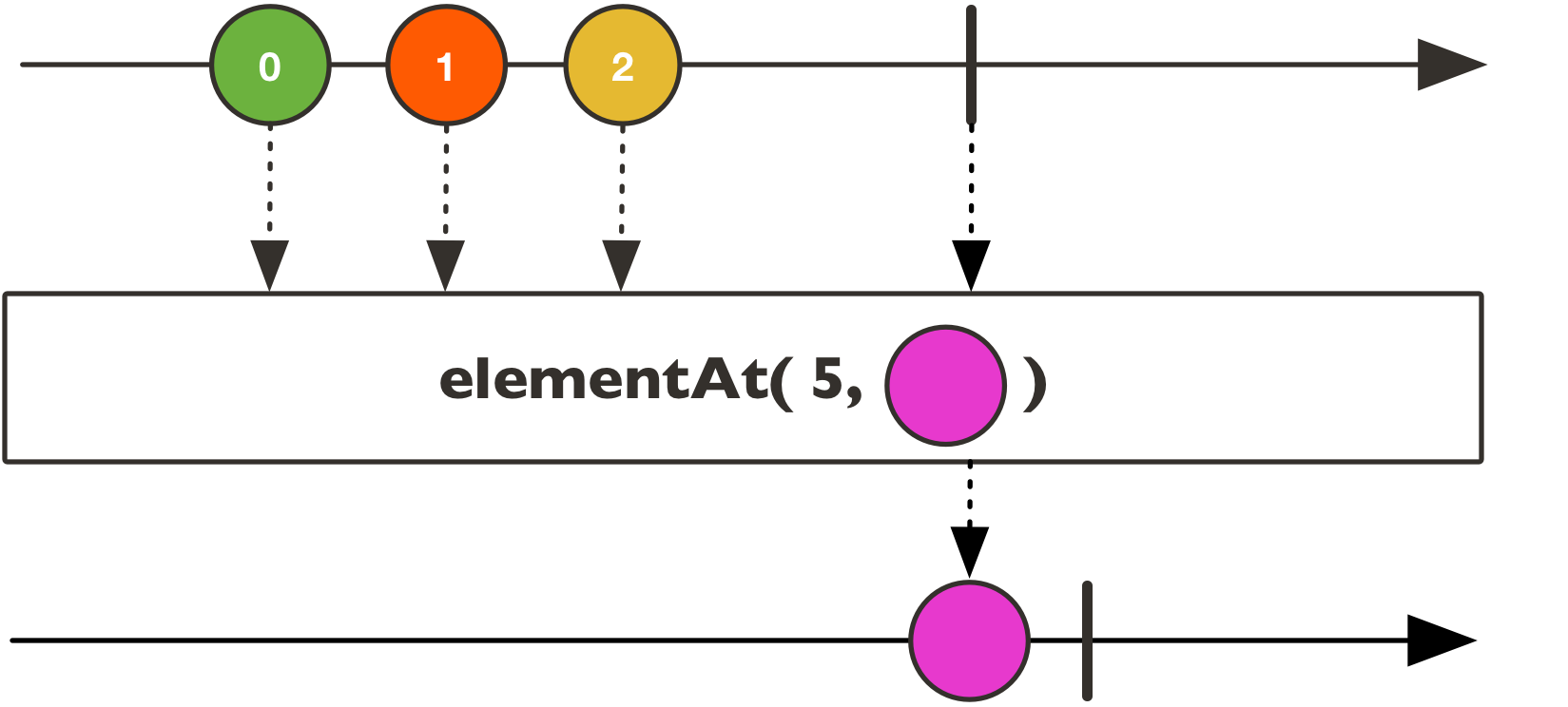
- Parameters:
index- zero-based index of the only item to emitdefaultValue- a default value to emit if the sequence is shorter- Returns:
- a
Monoof the item at the specified zero-based index or a default value
-
expandDeep
public final Flux<T> expandDeep(Function<? super T,? extends Publisher<? extends T>> expander, int capacityHint)
Recursively expand elements into a graph and emit all the resulting element, in a depth-first traversal order.That is: emit one value from this
Flux, expand it and emit the first value at this first level of recursion, and so on... When no more recursion is possible, backtrack to the previous level and re-apply the strategy.For example, given the hierarchical structure
A - AA - aa1 B - BB - bb1ExpandsFlux.just(A, B)intoA AA aa1 B BB bb1
-
expandDeep
public final Flux<T> expandDeep(Function<? super T,? extends Publisher<? extends T>> expander)
Recursively expand elements into a graph and emit all the resulting element, in a depth-first traversal order.That is: emit one value from this
Flux, expand it and emit the first value at this first level of recursion, and so on... When no more recursion is possible, backtrack to the previous level and re-apply the strategy.For example, given the hierarchical structure
A - AA - aa1 B - BB - bb1ExpandsFlux.just(A, B)intoA AA aa1 B BB bb1
-
expand
public final Flux<T> expand(Function<? super T,? extends Publisher<? extends T>> expander, int capacityHint)
Recursively expand elements into a graph and emit all the resulting element using a breadth-first traversal strategy.That is: emit the values from this
Fluxfirst, then expand each at a first level of recursion and emit all of the resulting values, then expand all of these at a second level and so on..For example, given the hierarchical structure
A - AA - aa1 B - BB - bb1ExpandsFlux.just(A, B)intoA B AA BB aa1 bb1
-
expand
public final Flux<T> expand(Function<? super T,? extends Publisher<? extends T>> expander)
Recursively expand elements into a graph and emit all the resulting element using a breadth-first traversal strategy.That is: emit the values from this
Fluxfirst, then expand each at a first level of recursion and emit all of the resulting values, then expand all of these at a second level and so on..For example, given the hierarchical structure
A - AA - aa1 B - BB - bb1ExpandsFlux.just(A, B)intoA B AA BB aa1 bb1
-
filter
public final Flux<T> filter(Predicate<? super T> p)
Evaluate each source value against the givenPredicate. If the predicate test succeeds, the value is emitted. If the predicate test fails, the value is ignored and a request of 1 is made upstream.
-
filterWhen
public final Flux<T> filterWhen(Function<? super T,? extends Publisher<Boolean>> asyncPredicate)
Test each value emitted by thisFluxasynchronously using a generatedPublisher<Boolean>test. A value is replayed if the first item emitted by its corresponding test is true. It is dropped if its test is either empty or its first emitted value is false.Note that only the first value of the test publisher is considered, and unless it is a
Mono, test will be cancelled after receiving that first value. Test publishers are generated and subscribed to in sequence.
-
filterWhen
public final Flux<T> filterWhen(Function<? super T,? extends Publisher<Boolean>> asyncPredicate, int bufferSize)
Test each value emitted by thisFluxasynchronously using a generatedPublisher<Boolean>test. A value is replayed if the first item emitted by its corresponding test is true. It is dropped if its test is either empty or its first emitted value is false.Note that only the first value of the test publisher is considered, and unless it is a
Mono, test will be cancelled after receiving that first value. Test publishers are generated and subscribed to in sequence.- Parameters:
asyncPredicate- the function generating aPublisherofBooleanfor each value, to filter the Flux withbufferSize- the maximum expected number of values to hold pending a result of their respective asynchronous predicates, rounded to the next power of two. This is capped depending on the size of the heap and the JVM limits, so be careful with large values (although eg. 65536 should still be fine). Also serves as the initial request size for the source.- Returns:
- a filtered
Flux
-
flatMap
public final <R> Flux<R> flatMap(Function<? super T,? extends Publisher<? extends R>> mapper)
Transform the elements emitted by thisFluxasynchronously into Publishers, then flatten these inner publishers into a singleFluxthrough merging, which allow them to interleave.There are three dimensions to this operator that can be compared with
flatMapSequentialandconcatMap:- Generation of inners and subscription: this operator is eagerly subscribing to its inners.
- Ordering of the flattened values: this operator does not necessarily preserve original ordering, as inner element are flattened as they arrive.
- Interleaving: this operator lets values from different inners interleave (similar to merging the inner sequences).
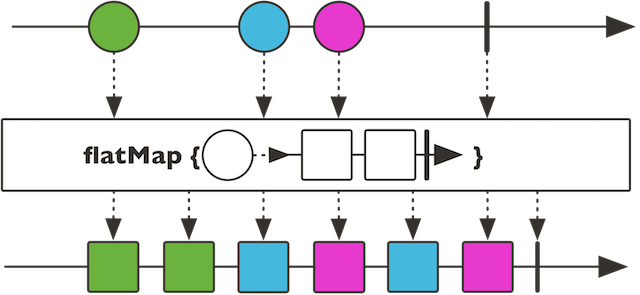
-
flatMap
public final <V> Flux<V> flatMap(Function<? super T,? extends Publisher<? extends V>> mapper, int concurrency)
Transform the elements emitted by thisFluxasynchronously into Publishers, then flatten these inner publishers into a singleFluxthrough merging, which allow them to interleave.There are three dimensions to this operator that can be compared with
flatMapSequentialandconcatMap:- Generation of inners and subscription: this operator is eagerly subscribing to its inners.
- Ordering of the flattened values: this operator does not necessarily preserve original ordering, as inner element are flattened as they arrive.
- Interleaving: this operator lets values from different inners interleave (similar to merging the inner sequences).
Publishercan be subscribed to and merged in parallel.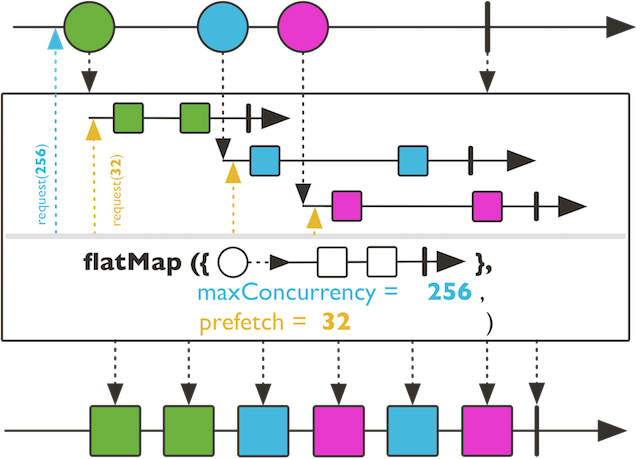
-
flatMap
public final <V> Flux<V> flatMap(Function<? super T,? extends Publisher<? extends V>> mapper, int concurrency, int prefetch)
Transform the elements emitted by thisFluxasynchronously into Publishers, then flatten these inner publishers into a singleFluxthrough merging, which allow them to interleave.There are three dimensions to this operator that can be compared with
flatMapSequentialandconcatMap:- Generation of inners and subscription: this operator is eagerly subscribing to its inners.
- Ordering of the flattened values: this operator does not necessarily preserve original ordering, as inner element are flattened as they arrive.
- Interleaving: this operator lets values from different inners interleave (similar to merging the inner sequences).
Publishercan be subscribed to and merged in parallel. The prefetch argument allows to give an arbitrary prefetch size to the mergedPublisher.
- Type Parameters:
V- the merged output sequence type- Parameters:
mapper- theFunctionto transform input sequence into N sequencesPublisherconcurrency- the maximum number of in-flight inner sequencesprefetch- the maximum in-flight elements from each innerPublishersequence- Returns:
- a merged
Flux
-
flatMapDelayError
public final <V> Flux<V> flatMapDelayError(Function<? super T,? extends Publisher<? extends V>> mapper, int concurrency, int prefetch)
Transform the elements emitted by thisFluxasynchronously into Publishers, then flatten these inner publishers into a singleFluxthrough merging, which allow them to interleave.There are three dimensions to this operator that can be compared with
flatMapSequentialandconcatMap:- Generation of inners and subscription: this operator is eagerly subscribing to its inners.
- Ordering of the flattened values: this operator does not necessarily preserve original ordering, as inner element are flattened as they arrive.
- Interleaving: this operator lets values from different inners interleave (similar to merging the inner sequences).
Publishercan be subscribed to and merged in parallel. The prefetch argument allows to give an arbitrary prefetch size to the mergedPublisher. This variant will delay any error until after the rest of the flatMap backlog has been processed.
- Type Parameters:
V- the merged output sequence type- Parameters:
mapper- theFunctionto transform input sequence into N sequencesPublisherconcurrency- the maximum number of in-flight inner sequencesprefetch- the maximum in-flight elements from each innerPublishersequence- Returns:
- a merged
Flux
-
flatMap
public final <R> Flux<R> flatMap(@Nullable Function<? super T,? extends Publisher<? extends R>> mapperOnNext, @Nullable Function<? super Throwable,? extends Publisher<? extends R>> mapperOnError, @Nullable Supplier<? extends Publisher<? extends R>> mapperOnComplete)
Transform the signals emitted by thisFluxasynchronously into Publishers, then flatten these inner publishers into a singleFluxthrough merging, which allow them to interleave. Note that at least one of the signal mappers must be provided, and all provided mappers must produce a publisher.There are three dimensions to this operator that can be compared with
flatMapSequentialandconcatMap:- Generation of inners and subscription: this operator is eagerly subscribing to its inners.
- Ordering of the flattened values: this operator does not necessarily preserve original ordering, as inner element are flattened as they arrive.
- Interleaving: this operator lets values from different inners interleave (similar to merging the inner sequences).
OnError will be transformed into completion signal after its mapping callback has been applied.
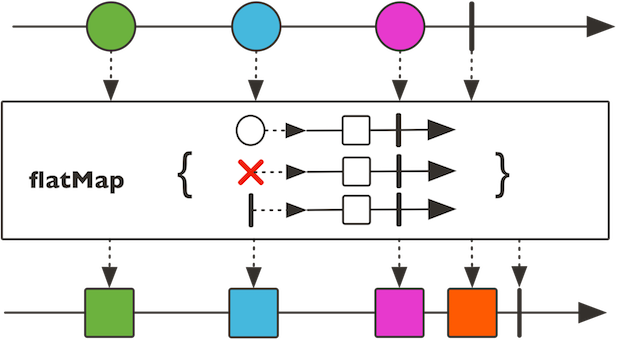
- Type Parameters:
R- the outputPublishertype target- Parameters:
mapperOnNext- theFunctionto call on next data and returning a sequence to merge. Use null to ignore (provided at least one other mapper is specified).mapperOnError- theFunctionto call on error signal and returning a sequence to merge. Use null to ignore (provided at least one other mapper is specified).mapperOnComplete- theFunctionto call on complete signal and returning a sequence to merge. Use null to ignore (provided at least one other mapper is specified).- Returns:
- a new
Flux
-
flatMapIterable
public final <R> Flux<R> flatMapIterable(Function<? super T,? extends Iterable<? extends R>> mapper)
Transform the items emitted by thisFluxintoIterable, then flatten the elements from those by merging them into a singleFlux.
Note that unlike
flatMap(Function)andconcatMap(Function), with Iterable there is no notion of eager vs lazy inner subscription. The content of the Iterables are all played sequentially. ThusflatMapIterableandconcatMapIterableare equivalent offered as a discoverability improvement for users that explore the API with the concat vs flatMap expectation.
-
flatMapIterable
public final <R> Flux<R> flatMapIterable(Function<? super T,? extends Iterable<? extends R>> mapper, int prefetch)
Transform the items emitted by thisFluxintoIterable, then flatten the emissions from those by merging them into a singleFlux. The prefetch argument allows to give an arbitrary prefetch size to the mergedIterable.
Note that unlike
flatMap(Function)andconcatMap(Function), with Iterable there is no notion of eager vs lazy inner subscription. The content of the Iterables are all played sequentially. ThusflatMapIterableandconcatMapIterableare equivalent offered as a discoverability improvement for users that explore the API with the concat vs flatMap expectation.- Type Parameters:
R- the merged output sequence type- Parameters:
mapper- theFunctionto transform input sequence into NIterableprefetch- the maximum in-flight elements from each innerIterablesequence- Returns:
- a concatenation of the values from the Iterables obtained from each element in this
Flux
-
flatMapSequential
public final <R> Flux<R> flatMapSequential(Function<? super T,? extends Publisher<? extends R>> mapper)
Transform the elements emitted by thisFluxasynchronously into Publishers, then flatten these inner publishers into a singleFlux, but merge them in the order of their source element.There are three dimensions to this operator that can be compared with
flatMapandconcatMap:- Generation of inners and subscription: this operator is eagerly subscribing to its inners (like flatMap).
- Ordering of the flattened values: this operator queues elements from late inners until all elements from earlier inners have been emitted, thus emitting inner sequences as a whole, in an order that matches their source's order.
- Interleaving: this operator does not let values from different inners interleave (similar looking result to concatMap, but due to queueing of values that would have been interleaved otherwise).
That is to say, whenever a source element is emitted it is transformed to an inner
Publisher. However, if such an early inner takes more time to complete than subsequent faster inners, the data from these faster inners will be queued until the earlier inner completes, so as to maintain source ordering.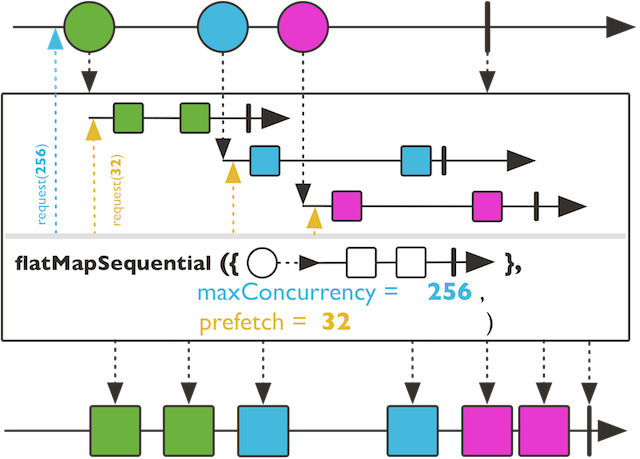
-
flatMapSequential
public final <R> Flux<R> flatMapSequential(Function<? super T,? extends Publisher<? extends R>> mapper, int maxConcurrency)
Transform the elements emitted by thisFluxasynchronously into Publishers, then flatten these inner publishers into a singleFlux, but merge them in the order of their source element.There are three dimensions to this operator that can be compared with
flatMapandconcatMap:- Generation of inners and subscription: this operator is eagerly subscribing to its inners (like flatMap).
- Ordering of the flattened values: this operator queues elements from late inners until all elements from earlier inners have been emitted, thus emitting inner sequences as a whole, in an order that matches their source's order.
- Interleaving: this operator does not let values from different inners interleave (similar looking result to concatMap, but due to queueing of values that would have been interleaved otherwise).
That is to say, whenever a source element is emitted it is transformed to an inner
Publisher. However, if such an early inner takes more time to complete than subsequent faster inners, the data from these faster inners will be queued until the earlier inner completes, so as to maintain source ordering.The concurrency argument allows to control how many merged
Publishercan happen in parallel.
-
flatMapSequential
public final <R> Flux<R> flatMapSequential(Function<? super T,? extends Publisher<? extends R>> mapper, int maxConcurrency, int prefetch)
Transform the elements emitted by thisFluxasynchronously into Publishers, then flatten these inner publishers into a singleFlux, but merge them in the order of their source element.There are three dimensions to this operator that can be compared with
flatMapandconcatMap:- Generation of inners and subscription: this operator is eagerly subscribing to its inners (like flatMap).
- Ordering of the flattened values: this operator queues elements from late inners until all elements from earlier inners have been emitted, thus emitting inner sequences as a whole, in an order that matches their source's order.
- Interleaving: this operator does not let values from different inners interleave (similar looking result to concatMap, but due to queueing of values that would have been interleaved otherwise).
That is to say, whenever a source element is emitted it is transformed to an inner
Publisher. However, if such an early inner takes more time to complete than subsequent faster inners, the data from these faster inners will be queued until the earlier inner completes, so as to maintain source ordering.The concurrency argument allows to control how many merged
Publishercan happen in parallel. The prefetch argument allows to give an arbitrary prefetch size to the mergedPublisher.
- Type Parameters:
R- the merged output sequence type- Parameters:
mapper- theFunctionto transform input sequence into N sequencesPublishermaxConcurrency- the maximum number of in-flight inner sequencesprefetch- the maximum in-flight elements from each innerPublishersequence- Returns:
- a merged
Flux, subscribing early but keeping the original ordering
-
flatMapSequentialDelayError
public final <R> Flux<R> flatMapSequentialDelayError(Function<? super T,? extends Publisher<? extends R>> mapper, int maxConcurrency, int prefetch)
Transform the elements emitted by thisFluxasynchronously into Publishers, then flatten these inner publishers into a singleFlux, but merge them in the order of their source element.There are three dimensions to this operator that can be compared with
flatMapandconcatMap:- Generation of inners and subscription: this operator is eagerly subscribing to its inners (like flatMap).
- Ordering of the flattened values: this operator queues elements from late inners until all elements from earlier inners have been emitted, thus emitting inner sequences as a whole, in an order that matches their source's order.
- Interleaving: this operator does not let values from different inners interleave (similar looking result to concatMap, but due to queueing of values that would have been interleaved otherwise).
That is to say, whenever a source element is emitted it is transformed to an inner
Publisher. However, if such an early inner takes more time to complete than subsequent faster inners, the data from these faster inners will be queued until the earlier inner completes, so as to maintain source ordering.The concurrency argument allows to control how many merged
Publishercan happen in parallel. The prefetch argument allows to give an arbitrary prefetch size to the mergedPublisher. This variant will delay any error until after the rest of the flatMap backlog has been processed.
- Type Parameters:
R- the merged output sequence type- Parameters:
mapper- theFunctionto transform input sequence into N sequencesPublishermaxConcurrency- the maximum number of in-flight inner sequencesprefetch- the maximum in-flight elements from each innerPublishersequence- Returns:
- a merged
Flux, subscribing early but keeping the original ordering
-
getPrefetch
public int getPrefetch()
The prefetch configuration of theFlux- Returns:
- the prefetch configuration of the
Flux, -1 if unspecified
-
groupBy
public final <K> Flux<GroupedFlux<K,T>> groupBy(Function<? super T,? extends K> keyMapper)
Divide this sequence into dynamically createdFlux(or groups) for each unique key, as produced by the provided keyMapperFunction. Note that groupBy works best with a low cardinality of groups, so chose your keyMapper function accordingly.
The groups need to be drained and consumed downstream for groupBy to work correctly. Notably when the criteria produces a large amount of groups, it can lead to hanging if the groups are not suitably consumed downstream (eg. due to a
flatMapwith amaxConcurrencyparameter that is set too low).- Type Parameters:
K- the key type extracted from each value of this sequence- Parameters:
keyMapper- the key mappingFunctionthat evaluates an incoming data and returns a key.- Returns:
- a
FluxofGroupedFluxgrouped sequences
-
groupBy
public final <K> Flux<GroupedFlux<K,T>> groupBy(Function<? super T,? extends K> keyMapper, int prefetch)
Divide this sequence into dynamically createdFlux(or groups) for each unique key, as produced by the provided keyMapperFunction. Note that groupBy works best with a low cardinality of groups, so chose your keyMapper function accordingly.
The groups need to be drained and consumed downstream for groupBy to work correctly. Notably when the criteria produces a large amount of groups, it can lead to hanging if the groups are not suitably consumed downstream (eg. due to a
flatMapwith amaxConcurrencyparameter that is set too low).- Type Parameters:
K- the key type extracted from each value of this sequence- Parameters:
keyMapper- the key mappingFunctionthat evaluates an incoming data and returns a key.prefetch- the number of values to prefetch from the source- Returns:
- a
FluxofGroupedFluxgrouped sequences
-
groupBy
public final <K,V> Flux<GroupedFlux<K,V>> groupBy(Function<? super T,? extends K> keyMapper, Function<? super T,? extends V> valueMapper)
Divide this sequence into dynamically createdFlux(or groups) for each unique key, as produced by the provided keyMapperFunction. Source elements are also mapped to a different value using thevalueMapper. Note that groupBy works best with a low cardinality of groups, so chose your keyMapper function accordingly.
The groups need to be drained and consumed downstream for groupBy to work correctly. Notably when the criteria produces a large amount of groups, it can lead to hanging if the groups are not suitably consumed downstream (eg. due to a
flatMapwith amaxConcurrencyparameter that is set too low).- Type Parameters:
K- the key type extracted from each value of this sequenceV- the value type extracted from each value of this sequence- Parameters:
keyMapper- the key mapping function that evaluates an incoming data and returns a key.valueMapper- the value mapping function that evaluates which data to extract for re-routing.- Returns:
- a
FluxofGroupedFluxgrouped sequences
-
groupBy
public final <K,V> Flux<GroupedFlux<K,V>> groupBy(Function<? super T,? extends K> keyMapper, Function<? super T,? extends V> valueMapper, int prefetch)
Divide this sequence into dynamically createdFlux(or groups) for each unique key, as produced by the provided keyMapperFunction. Source elements are also mapped to a different value using thevalueMapper. Note that groupBy works best with a low cardinality of groups, so chose your keyMapper function accordingly.
The groups need to be drained and consumed downstream for groupBy to work correctly. Notably when the criteria produces a large amount of groups, it can lead to hanging if the groups are not suitably consumed downstream (eg. due to a
flatMapwith amaxConcurrencyparameter that is set too low).- Type Parameters:
K- the key type extracted from each value of this sequenceV- the value type extracted from each value of this sequence- Parameters:
keyMapper- the key mapping function that evaluates an incoming data and returns a key.valueMapper- the value mapping function that evaluates which data to extract for re-routing.prefetch- the number of values to prefetch from the source- Returns:
- a
FluxofGroupedFluxgrouped sequences
-
groupJoin
public final <TRight,TLeftEnd,TRightEnd,R> Flux<R> groupJoin(Publisher<? extends TRight> other, Function<? super T,? extends Publisher<TLeftEnd>> leftEnd, Function<? super TRight,? extends Publisher<TRightEnd>> rightEnd, BiFunction<? super T,? super Flux<TRight>,? extends R> resultSelector)
Map values from two Publishers into time windows and emit combination of values in case their windows overlap. The emitted elements are obtained by passing the value from thisFluxand aFluxemitting the value from the otherPublisherto aBiFunction.There are no guarantees in what order the items get combined when multiple items from one or both source Publishers overlap.
Unlike
join(org.reactivestreams.Publisher<? extends TRight>, java.util.function.Function<? super T, ? extends org.reactivestreams.Publisher<TLeftEnd>>, java.util.function.Function<? super TRight, ? extends org.reactivestreams.Publisher<TRightEnd>>, java.util.function.BiFunction<? super T, ? super TRight, ? extends R>), items from the secondPublisherwill be provided as aFluxto theresultSelector.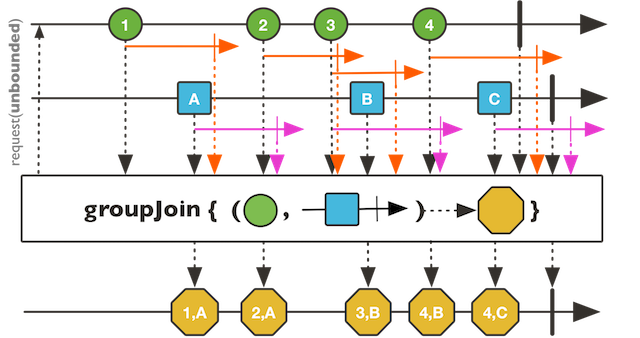
- Type Parameters:
TRight- the type of the elements from the rightPublisherTLeftEnd- the type for thisFluxwindow signalsTRightEnd- the type for the rightPublisherwindow signalsR- the combined result type- Parameters:
other- the otherPublisherto correlate items withleftEnd- a function that returns a Publisher whose emissions indicate the time window for the source value to be consideredrightEnd- a function that returns a Publisher whose emissions indicate the time window for therightPublisher value to be consideredresultSelector- a function that takes an item emitted by thisFluxand aFluxrepresentation of the overlapping item from the otherPublisherand returns the value to be emitted by the resultingFlux- Returns:
- a joining
Flux - See Also:
join(Publisher, Function, Function, BiFunction)
-
handle
public final <R> Flux<R> handle(BiConsumer<? super T,SynchronousSink<R>> handler)
Handle the items emitted by thisFluxby calling a biconsumer with the output sink for each onNext. At most oneSynchronousSink.next(Object)call must be performed and/or 0 or 1SynchronousSink.error(Throwable)orSynchronousSink.complete().- Type Parameters:
R- the transformed type- Parameters:
handler- the handlingBiConsumer- Returns:
- a transformed
Flux
-
hasElement
public final Mono<Boolean> hasElement(T value)
Emit a single boolean true if any of the elements of thisFluxsequence is equal to the provided value.The implementation uses short-circuit logic and completes with true if an element matches the value.
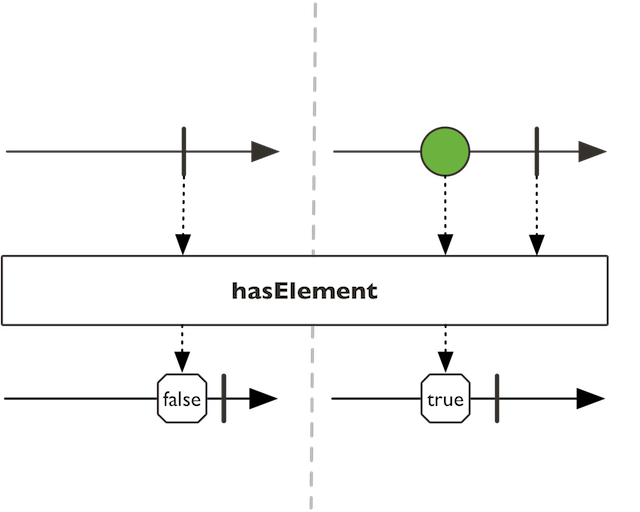
- Parameters:
value- constant compared to incoming signals- Returns:
- a new
Fluxwithtrueif any element is equal to a given value andfalseotherwise
-
hasElements
public final Mono<Boolean> hasElements()
Emit a single boolean true if thisFluxsequence has at least one element.The implementation uses short-circuit logic and completes with true on onNext.
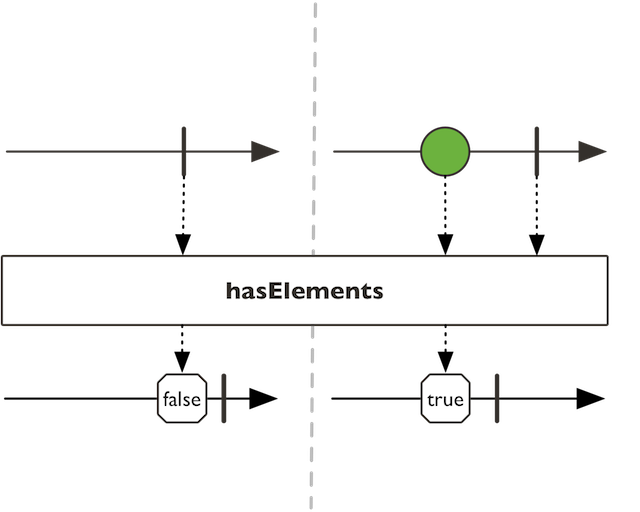
- Returns:
- a new
Monowithtrueif any value is emitted andfalseotherwise
-
hide
public final Flux<T> hide()
Hides the identities of thisFluxinstance.The main purpose of this operator is to prevent certain identity-based optimizations from happening, mostly for diagnostic purposes.
- Returns:
- a new
FluxpreventingPublisher/Subscriptionbased Reactor optimizations
-
index
public final Flux<Tuple2<Long,T>> index()
Keep information about the order in which source values were received by indexing them with a 0-based incrementing long, returning aFluxofTuple2<(index, value)>.- Returns:
- an indexed
Fluxwith each source value combined with its 0-based index.
-
index
public final <I> Flux<I> index(BiFunction<? super Long,? super T,? extends I> indexMapper)
Keep information about the order in which source values were received by indexing them internally with a 0-based incrementing long then combining this information with the source value into aIusing the providedBiFunction, returning aFlux<I>.Typical usage would be to produce a
Tuple2similar toindex(), but 1-based instead of 0-based:index((i, v) -> Tuples.of(i+1, v))- Parameters:
indexMapper- theBiFunctionto use to combine elements and their index.- Returns:
- an indexed
Fluxwith each source value combined with its computed index.
-
ignoreElements
public final Mono<T> ignoreElements()
Ignores onNext signals (dropping them) and only propagate termination events.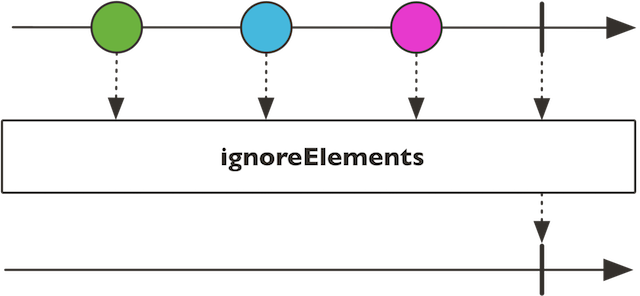
-
join
public final <TRight,TLeftEnd,TRightEnd,R> Flux<R> join(Publisher<? extends TRight> other, Function<? super T,? extends Publisher<TLeftEnd>> leftEnd, Function<? super TRight,? extends Publisher<TRightEnd>> rightEnd, BiFunction<? super T,? super TRight,? extends R> resultSelector)
Map values from two Publishers into time windows and emit combination of values in case their windows overlap. The emitted elements are obtained by passing the values from thisFluxand the otherPublisherto aBiFunction.There are no guarantees in what order the items get combined when multiple items from one or both source Publishers overlap.

- Type Parameters:
TRight- the type of the elements from the rightPublisherTLeftEnd- the type for thisFluxwindow signalsTRightEnd- the type for the rightPublisherwindow signalsR- the combined result type- Parameters:
other- the otherPublisherto correlate items withleftEnd- a function that returns a Publisher whose emissions indicate the time window for the source value to be consideredrightEnd- a function that returns a Publisher whose emissions indicate the time window for therightPublisher value to be consideredresultSelector- a function that takes an item emitted by each Publisher and returns the value to be emitted by the resultingFlux- Returns:
- a joining
Flux - See Also:
groupJoin(Publisher, Function, Function, BiFunction)
-
last
public final Mono<T> last()
Emit the last element observed before complete signal as aMono, or emitNoSuchElementExceptionerror if the source was empty. For a passive version usetakeLast(int)
-
last
public final Mono<T> last(T defaultValue)
Emit the last element observed before complete signal as aMono, or emit thedefaultValueif the source was empty. For a passive version usetakeLast(int)
-
limitRate
public final Flux<T> limitRate(int prefetchRate)
Ensure that backpressure signals from downstream subscribers are split into batches capped at the providedprefetchRatewhen propagated upstream, effectively rate limiting the upstreamPublisher.Typically used for scenarios where consumer(s) request a large amount of data (eg.
Long.MAX_VALUE) but the data source behaves better or can be optimized with smaller requests (eg. database paging, etc...). All data is still processed, unlike withlimitRequest(long)which will cap the grand total request amount.Equivalent to
flux.publishOn(Schedulers.immediate(), prefetchRate).subscribe()- Parameters:
prefetchRate- the limit to apply to downstream's backpressure- Returns:
- a
Fluxlimiting downstream's backpressure - See Also:
publishOn(Scheduler, int),limitRequest(long)
-
limitRate
public final Flux<T> limitRate(int highTide, int lowTide)
Ensure that backpressure signals from downstream subscribers are split into batches capped at the providedhighTidefirst, then replenishing at the providedlowTide, effectively rate limiting the upstreamPublisher.Typically used for scenarios where consumer(s) request a large amount of data (eg.
Long.MAX_VALUE) but the data source behaves better or can be optimized with smaller requests (eg. database paging, etc...). All data is still processed, unlike withlimitRequest(long)which will cap the grand total request amount.Similar to
flux.publishOn(Schedulers.immediate(), prefetchRate).subscribe(), except with a customized "low tide" instead of the default 75%. Note that the smaller the lowTide is, the higher the potential for concurrency between request and data production. And thus the more extraneous replenishment requests this operator could make. For example, for a global downstream request of 14, with a highTide of 10 and a lowTide of 2, the operator would perform 7 low tide requests, whereas with the default lowTide of 8 it would only perform one.- Parameters:
highTide- the initial request amountlowTide- the subsequent (or replenishing) request amount- Returns:
- a
Fluxlimiting downstream's backpressure and customizing the replenishment request amount - See Also:
publishOn(Scheduler, int),limitRequest(long)
-
limitRequest
public final Flux<T> limitRequest(long requestCap)
Ensure that the total amount requested upstream is capped atcap. Backpressure signals from downstream subscribers are smaller than the cap are propagated as is, but if they would cause the total requested amount to go over the cap, they are reduced to the minimum value that doesn't go over.As a result, this operator never let the upstream produce more elements than the cap, and it can be used as a stricter form of
take(long). Typically useful for cases where a race between request and cancellation can lead the upstream to producing a lot of extraneous data, and such a production is undesirable (e.g. a source that would send the extraneous data over the network).- Parameters:
requestCap- the global backpressure limit to apply to the sum of downstream's requests- Returns:
- a
Fluxthat requests AT MOSTcapfrom upstream in total. - See Also:
limitRate(int),take(long)
-
log
public final Flux<T> log()
Observe all Reactive Streams signals and trace them usingLoggersupport. Default will useLevel.INFOandjava.util.logging. If SLF4J is available, it will be used instead.
The default log category will be "reactor.Flux.", followed by a suffix generated from the source operator, e.g. "reactor.Flux.Map".
- Returns:
- a new
Fluxthat logs signals
-
log
public final Flux<T> log(String category)
Observe all Reactive Streams signals and trace them usingLoggersupport. Default will useLevel.INFOandjava.util.logging. If SLF4J is available, it will be used instead.
- Parameters:
category- to be mapped into logger configuration (e.g. org.springframework .reactor). If category ends with "." like "reactor.", a generated operator suffix will be added, e.g. "reactor.Flux.Map".- Returns:
- a new
Fluxthat logs signals
-
log
public final Flux<T> log(@Nullable String category, Level level, SignalType... options)
Observe Reactive Streams signals matching the passed filteroptionsand trace them usingLoggersupport. Default will useLevel.INFOandjava.util.logging. If SLF4J is available, it will be used instead.Options allow fine grained filtering of the traced signal, for instance to only capture onNext and onError:
flux.log("category", Level.INFO, SignalType.ON_NEXT, SignalType.ON_ERROR)
- Parameters:
category- to be mapped into logger configuration (e.g. org.springframework .reactor). If category ends with "." like "reactor.", a generated operator suffix will be added, e.g. "reactor.Flux.Map".level- theLevelto enforce for this tracing Flux (only FINEST, FINE, INFO, WARNING and SEVERE are taken into account)options- a varargSignalTypeoption to filter log messages- Returns:
- a new
Fluxthat logs signals
-
log
public final Flux<T> log(@Nullable String category, Level level, boolean showOperatorLine, SignalType... options)
Observe Reactive Streams signals matching the passed filteroptionsand trace them usingLoggersupport. Default will useLevel.INFOandjava.util.logging. If SLF4J is available, it will be used instead.Options allow fine grained filtering of the traced signal, for instance to only capture onNext and onError:
flux.log("category", Level.INFO, SignalType.ON_NEXT, SignalType.ON_ERROR)
- Parameters:
category- to be mapped into logger configuration (e.g. org.springframework .reactor). If category ends with "." like "reactor.", a generated operator suffix will be added, e.g. "reactor.Flux.Map".level- theLevelto enforce for this tracing Flux (only FINEST, FINE, INFO, WARNING and SEVERE are taken into account)showOperatorLine- capture the current stack to display operator class/line number.options- a varargSignalTypeoption to filter log messages- Returns:
- a new
Fluxthat logs signals
-
log
public final Flux<T> log(Logger logger)
Observe Reactive Streams signals matching the passed filteroptionsand trace them using a specific user-providedLogger, atLevel.INFOlevel.
-
log
public final Flux<T> log(Logger logger, Level level, boolean showOperatorLine, SignalType... options)
Observe Reactive Streams signals matching the passed filteroptionsand trace them using a specific user-providedLogger, at the givenLevel.Options allow fine grained filtering of the traced signal, for instance to only capture onNext and onError:
flux.log(myCustomLogger, Level.INFO, SignalType.ON_NEXT, SignalType.ON_ERROR)
- Parameters:
logger- theLoggerto use, instead of resolving one through a category.level- theLevelto enforce for this tracing Flux (only FINEST, FINE, INFO, WARNING and SEVERE are taken into account)showOperatorLine- capture the current stack to display operator class/line number (default in overload is false).options- a varargSignalTypeoption to filter log messages- Returns:
- a new
Fluxthat logs signals
-
map
public final <V> Flux<V> map(Function<? super T,? extends V> mapper)
Transform the items emitted by thisFluxby applying a synchronous function to each item.
-
materialize
public final Flux<Signal<T>> materialize()
Transform incoming onNext, onError and onComplete signals intoSignalinstances, materializing these signals. Since the error is materialized as aSignal, the propagation will be stopped and onComplete will be emitted. Complete signal will first emit aSignal.complete()and then effectively complete the flux. All theseSignalhave aContextassociated to them.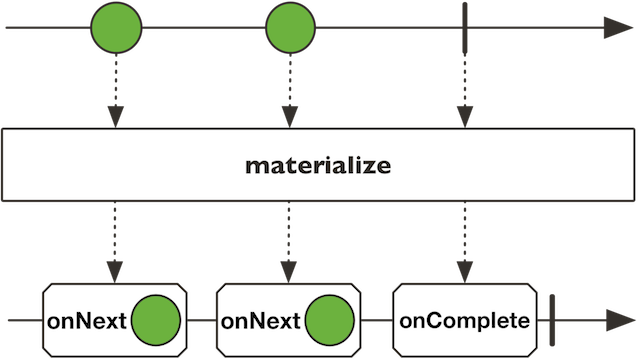
- Returns:
- a
Fluxof materializedSignal - See Also:
dematerialize()
-
mergeOrderedWith
public final Flux<T> mergeOrderedWith(Publisher<? extends T> other, Comparator<? super T> otherComparator)
Merge data from thisFluxand aPublisherinto a reordered merge sequence, by picking the smallest value from each sequence as defined by a providedComparator. Note that subsequent calls are combined, and their comparators are in lexicographic order as defined byComparator.thenComparing(Comparator).The combination step is avoided if the two
Comparatorsareequal(which can easily be achieved by using the same reference, and is also always true ofComparator.naturalOrder()).Note that merge is tailored to work with asynchronous sources or finite sources. When dealing with an infinite source that doesn't already publish on a dedicated Scheduler, you must isolate that source in its own Scheduler, as merge would otherwise attempt to drain it before subscribing to another source.
- Parameters:
other- thePublisherto merge withotherComparator- theComparatorto use for merging- Returns:
- a new
Flux
-
mergeWith
public final Flux<T> mergeWith(Publisher<? extends T> other)
Merge data from thisFluxand aPublisherinto an interleaved merged sequence. Unlikeconcat, inner sources are subscribed to eagerly.
Note that merge is tailored to work with asynchronous sources or finite sources. When dealing with an infinite source that doesn't already publish on a dedicated Scheduler, you must isolate that source in its own Scheduler, as merge would otherwise attempt to drain it before subscribing to another source.
-
name
public final Flux<T> name(String name)
Give a name to this sequence, which can be retrieved usingScannable.name()as long as this is the first reachableScannable.parents().- Parameters:
name- a name for the sequence- Returns:
- the same sequence, but bearing a name
-
onBackpressureBuffer
public final Flux<T> onBackpressureBuffer()
Request an unbounded demand and push to the returnedFlux, or park the observed elements if not enough demand is requested downstream. Errors will be delayed until the buffer gets consumed.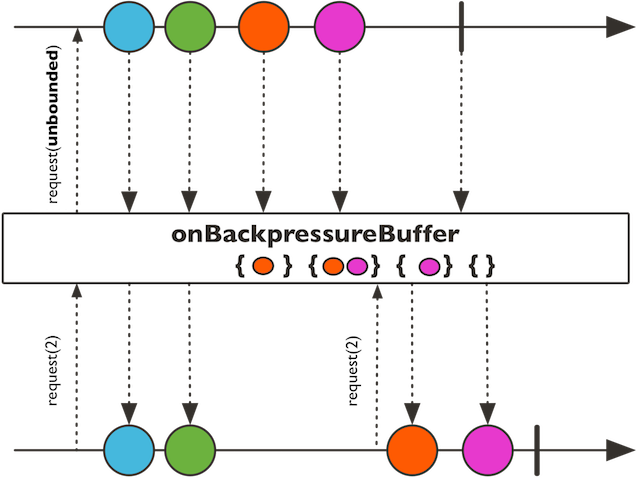
- Returns:
- a backpressured
Fluxthat buffers with unbounded capacity
-
onBackpressureBuffer
public final Flux<T> onBackpressureBuffer(int maxSize)
Request an unbounded demand and push to the returnedFlux, or park the observed elements if not enough demand is requested downstream. Errors will be immediately emitted on overflow regardless of the pending buffer.
- Parameters:
maxSize- maximum buffer backlog size before immediate error- Returns:
- a backpressured
Fluxthat buffers with bounded capacity
-
onBackpressureBuffer
public final Flux<T> onBackpressureBuffer(int maxSize, Consumer<? super T> onOverflow)
Request an unbounded demand and push to the returnedFlux, or park the observed elements if not enough demand is requested downstream. Overflow error will be delayed after the current backlog is consumed. However theConsumerwill be immediately invoked.
- Parameters:
maxSize- maximum buffer backlog size before overflow callback is calledonOverflow- callback to invoke on overflow- Returns:
- a backpressured
Fluxthat buffers with a bounded capacity
-
onBackpressureBuffer
public final Flux<T> onBackpressureBuffer(int maxSize, BufferOverflowStrategy bufferOverflowStrategy)
Request an unbounded demand and push to the returnedFlux, or park the observed elements if not enough demand is requested downstream, within amaxSizelimit. Over that limit, the overflow strategy is applied (seeBufferOverflowStrategy).Note that for the
ERRORstrategy, the overflow error will be delayed after the current backlog is consumed.
- Parameters:
maxSize- maximum buffer backlog size before overflow strategy is appliedbufferOverflowStrategy- strategy to apply to overflowing elements- Returns:
- a backpressured
Fluxthat buffers up to a capacity then applies an overflow strategy
-
onBackpressureBuffer
public final Flux<T> onBackpressureBuffer(int maxSize, Consumer<? super T> onBufferOverflow, BufferOverflowStrategy bufferOverflowStrategy)
Request an unbounded demand and push to the returnedFlux, or park the observed elements if not enough demand is requested downstream, within amaxSizelimit. Over that limit, the overflow strategy is applied (seeBufferOverflowStrategy).A
Consumeris immediately invoked when there is an overflow, receiving the value that was discarded because of the overflow (which can be different from the latest element emitted by the source in case of aDROP_LATESTstrategy).Note that for the
ERRORstrategy, the overflow error will be delayed after the current backlog is consumed. The consumer is still invoked immediately.
- Parameters:
maxSize- maximum buffer backlog size before overflow callback is calledonBufferOverflow- callback to invoke on overflowbufferOverflowStrategy- strategy to apply to overflowing elements- Returns:
- a backpressured
Fluxthat buffers up to a capacity then applies an overflow strategy
-
onBackpressureBuffer
public final Flux<T> onBackpressureBuffer(Duration ttl, int maxSize, Consumer<? super T> onBufferEviction)
Request an unbounded demand and push to the returnedFlux, or park the observed elements if not enough demand is requested downstream, within amaxSizelimit and for a maximumDurationofttl(as measured on theelastic Scheduler). Over that limit, oldest elements from the source are dropped.Elements evicted based on the TTL are passed to a cleanup
Consumer, which is also immediately invoked when there is an overflow.
- Parameters:
ttl- maximumDurationfor which an element is kept in the backlogmaxSize- maximum buffer backlog size before overflow callback is calledonBufferEviction- callback to invoke once TTL is reached or on overflow- Returns:
- a backpressured
Fluxthat buffers with a TTL and up to a capacity then applies an overflow strategy
-
onBackpressureBuffer
public final Flux<T> onBackpressureBuffer(Duration ttl, int maxSize, Consumer<? super T> onBufferEviction, Scheduler scheduler)
Request an unbounded demand and push to the returnedFlux, or park the observed elements if not enough demand is requested downstream, within amaxSizelimit and for a maximumDurationofttl(as measured on the providedScheduler). Over that limit, oldest elements from the source are dropped.Elements evicted based on the TTL are passed to a cleanup
Consumer, which is also immediately invoked when there is an overflow.
- Parameters:
ttl- maximumDurationfor which an element is kept in the backlogmaxSize- maximum buffer backlog size before overflow callback is calledonBufferEviction- callback to invoke once TTL is reached or on overflowscheduler- the scheduler on which to run the timeout check- Returns:
- a backpressured
Fluxthat buffers with a TTL and up to a capacity then applies an overflow strategy
-
onBackpressureDrop
public final Flux<T> onBackpressureDrop()
Request an unbounded demand and push to the returnedFlux, or drop the observed elements if not enough demand is requested downstream.
- Returns:
- a backpressured
Fluxthat drops overflowing elements
-
onBackpressureDrop
public final Flux<T> onBackpressureDrop(Consumer<? super T> onDropped)
Request an unbounded demand and push to the returnedFlux, or drop and notify droppingConsumerwith the observed elements if not enough demand is requested downstream.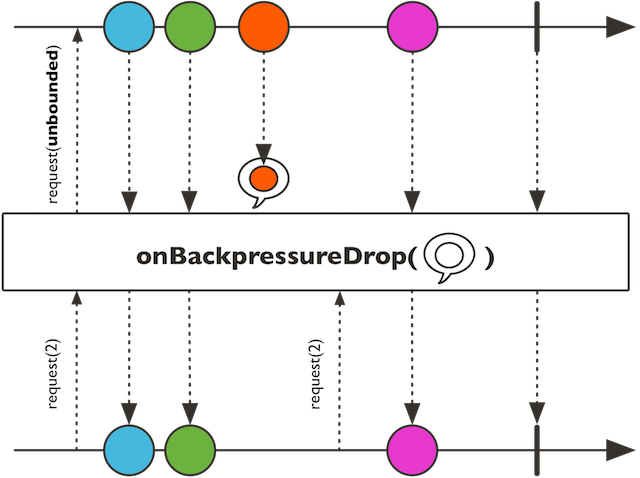
- Parameters:
onDropped- the Consumer called when an value gets dropped due to lack of downstream requests- Returns:
- a backpressured
Fluxthat drops overflowing elements
-
onBackpressureError
public final Flux<T> onBackpressureError()
Request an unbounded demand and push to the returnedFlux, or emit onError fomExceptions.failWithOverflow()if not enough demand is requested downstream.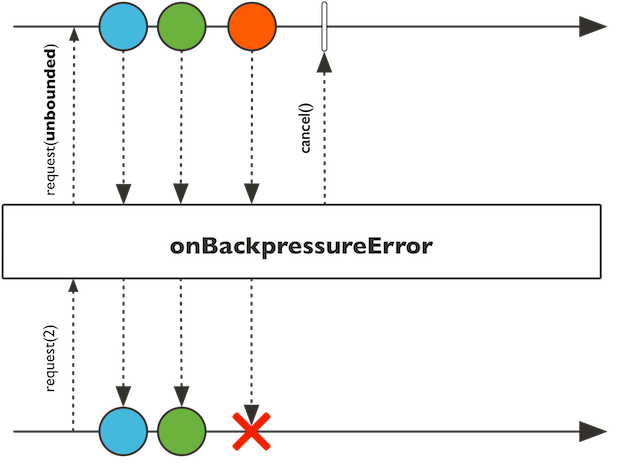
- Returns:
- a backpressured
Fluxthat errors on overflowing elements
-
onBackpressureLatest
public final Flux<T> onBackpressureLatest()
Request an unbounded demand and push to the returnedFlux, or only keep the most recent observed item if not enough demand is requested downstream.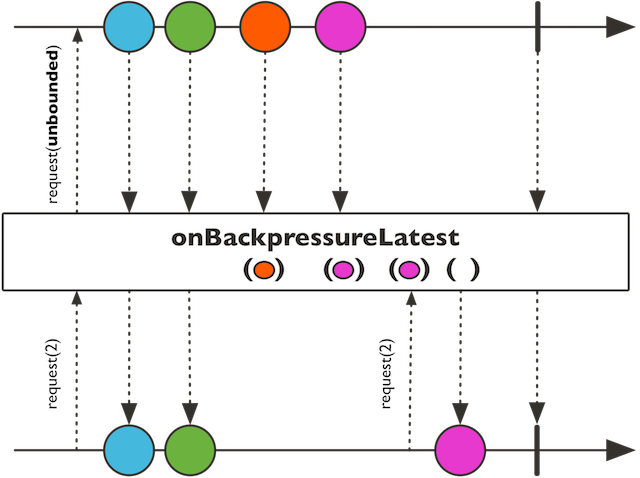
- Returns:
- a backpressured
Fluxthat will only keep a reference to the last observed item
-
onErrorMap
public final Flux<T> onErrorMap(Function<? super Throwable,? extends Throwable> mapper)
Transform any error emitted by thisFluxby synchronously applying a function to it.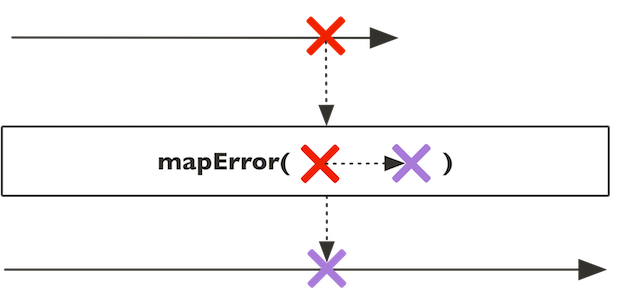
-
onErrorMap
public final <E extends Throwable> Flux<T> onErrorMap(Class<E> type, Function<? super E,? extends Throwable> mapper)
Transform an error emitted by thisFluxby synchronously applying a function to it if the error matches the given type. Otherwise let the error pass through.
-
onErrorMap
public final Flux<T> onErrorMap(Predicate<? super Throwable> predicate, Function<? super Throwable,? extends Throwable> mapper)
Transform an error emitted by thisFluxby synchronously applying a function to it if the error matches the given predicate. Otherwise let the error pass through.
-
onErrorResume
public final Flux<T> onErrorResume(Function<? super Throwable,? extends Publisher<? extends T>> fallback)
Subscribe to a returned fallback publisher when any error occurs, using a function to choose the fallback depending on the error.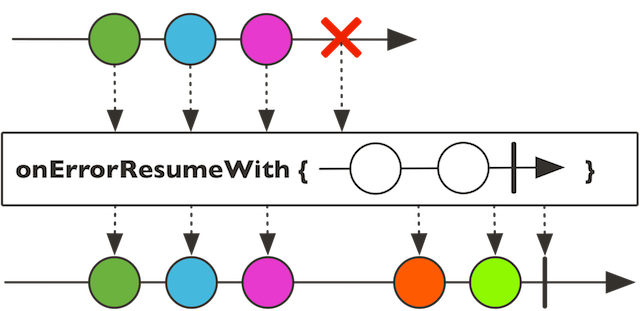
-
onErrorResume
public final <E extends Throwable> Flux<T> onErrorResume(Class<E> type, Function<? super E,? extends Publisher<? extends T>> fallback)
Subscribe to a fallback publisher when an error matching the given type occurs, using a function to choose the fallback depending on the error.
-
onErrorResume
public final Flux<T> onErrorResume(Predicate<? super Throwable> predicate, Function<? super Throwable,? extends Publisher<? extends T>> fallback)
Subscribe to a fallback publisher when an error matching a given predicate occurs.
-
onErrorReturn
public final Flux<T> onErrorReturn(T fallbackValue)
Simply emit a captured fallback value when any error is observed on thisFlux.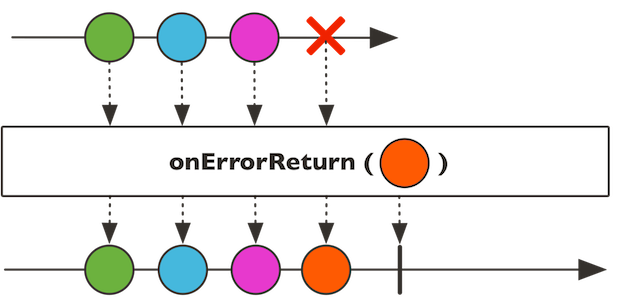
- Parameters:
fallbackValue- the value to emit if an error occurs- Returns:
- a new falling back
Flux
-
onErrorReturn
public final <E extends Throwable> Flux<T> onErrorReturn(Class<E> type, T fallbackValue)
Simply emit a captured fallback value when an error of the specified type is observed on thisFlux.
- Type Parameters:
E- the error type- Parameters:
type- the error type to matchfallbackValue- the value to emit if an error occurs that matches the type- Returns:
- a new falling back
Flux
-
onErrorReturn
public final Flux<T> onErrorReturn(Predicate<? super Throwable> predicate, T fallbackValue)
Simply emit a captured fallback value when an error matching the given predicate is observed on thisFlux.
- Parameters:
predicate- the error predicate to matchfallbackValue- the value to emit if an error occurs that matches the predicate- Returns:
- a new falling back
Flux
-
onTerminateDetach
public final Flux<T> onTerminateDetach()
Detaches both the childSubscriberand theSubscriptionon termination or cancellation.This is an advanced interoperability operator that should help with odd retention scenarios when running with non-reactor
Subscriber.- Returns:
- a detachable
Flux
-
or
public final Flux<T> or(Publisher<? extends T> other)
Pick the firstPublisherbetween thisFluxand another publisher to emit any signal (onNext/onError/onComplete) and replay all signals from thatPublisher, effectively behaving like the fastest of these competing sources.
- Parameters:
other- thePublisherto race with- Returns:
- the fastest sequence
- See Also:
first(org.reactivestreams.Publisher<? extends I>...)
-
parallel
public final ParallelFlux<T> parallel()
Prepare thisFluxby dividing data on a number of 'rails' matching the number of CPU cores, in a round-robin fashion. Note that to actually perform the work in parallel, you should callParallelFlux.runOn(Scheduler)afterward.
- Returns:
- a new
ParallelFluxinstance
-
parallel
public final ParallelFlux<T> parallel(int parallelism)
Prepare thisFluxby dividing data on a number of 'rails' matching the providedparallelismparameter, in a round-robin fashion. Note that to actually perform the work in parallel, you should callParallelFlux.runOn(Scheduler)afterward.
- Parameters:
parallelism- the number of parallel rails- Returns:
- a new
ParallelFluxinstance
-
parallel
public final ParallelFlux<T> parallel(int parallelism, int prefetch)
Prepare thisFluxby dividing data on a number of 'rails' matching the providedparallelismparameter, in a round-robin fashion and using a custom prefetch amount and queue for dealing with the sourceFlux's values. Note that to actually perform the work in parallel, you should callParallelFlux.runOn(Scheduler)afterward.
- Parameters:
parallelism- the number of parallel railsprefetch- the number of values to prefetch from the source- Returns:
- a new
ParallelFluxinstance
-
publish
public final ConnectableFlux<T> publish()
Prepare aConnectableFluxwhich shares thisFluxsequence and dispatches values to subscribers in a backpressure-aware manner. Prefetch will default toQueues.SMALL_BUFFER_SIZE. This will effectively turn any type of sequence into a hot sequence.Backpressure will be coordinated on
Subscription.request(long)and if anySubscriberis missing demand (requested = 0), multicast will pause pushing/pulling.
- Returns:
- a new
ConnectableFlux
-
publish
public final ConnectableFlux<T> publish(int prefetch)
Prepare aConnectableFluxwhich shares thisFluxsequence and dispatches values to subscribers in a backpressure-aware manner. This will effectively turn any type of sequence into a hot sequence.Backpressure will be coordinated on
Subscription.request(long)and if anySubscriberis missing demand (requested = 0), multicast will pause pushing/pulling.
- Parameters:
prefetch- bounded requested demand- Returns:
- a new
ConnectableFlux
-
publish
public final <R> Flux<R> publish(Function<? super Flux<T>,? extends Publisher<? extends R>> transform)
Shares a sequence for the duration of a function that may transform it and consume it as many times as necessary without causing multiple subscriptions to the upstream.- Type Parameters:
R- the output value type- Parameters:
transform- the transformation function- Returns:
- a new
Flux
-
publish
public final <R> Flux<R> publish(Function<? super Flux<T>,? extends Publisher<? extends R>> transform, int prefetch)
Shares a sequence for the duration of a function that may transform it and consume it as many times as necessary without causing multiple subscriptions to the upstream.- Type Parameters:
R- the output value type- Parameters:
transform- the transformation functionprefetch- the request size- Returns:
- a new
Flux
-
publishNext
public final Mono<T> publishNext()
Prepare aMonowhich shares thisFluxsequence and dispatches the first observed item to subscribers in a backpressure-aware manner. This will effectively turn any type of sequence into a hot sequence when the firstSubscribersubscribes.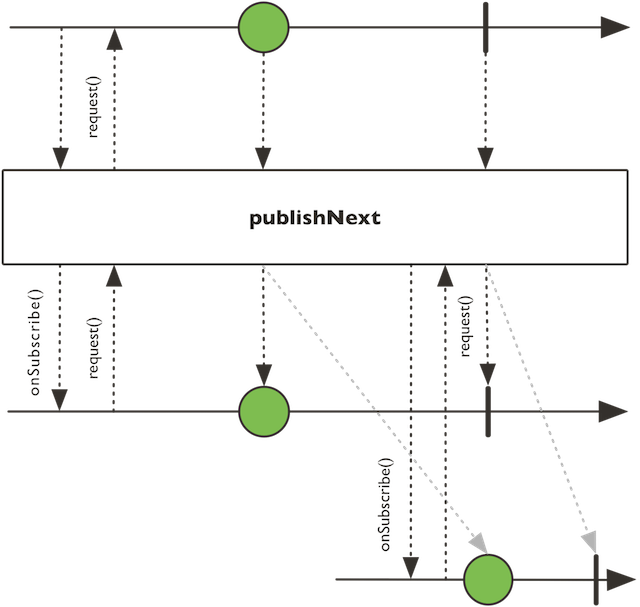
- Returns:
- a new
Mono
-
publishOn
public final Flux<T> publishOn(Scheduler scheduler)
Run onNext, onComplete and onError on a suppliedSchedulerWorker.This operator influences the threading context where the rest of the operators in the chain below it will execute, up to a new occurrence of
publishOn.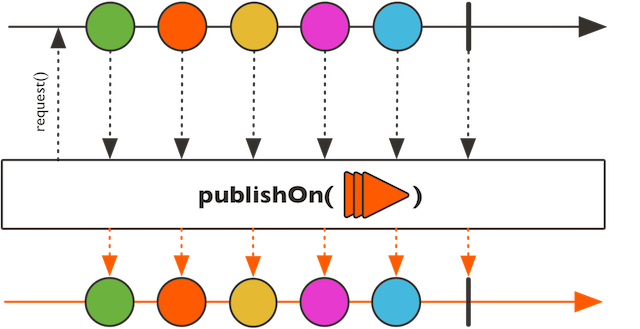
Typically used for fast publisher, slow consumer(s) scenarios.
flux.publishOn(Schedulers.single()).subscribe()- Parameters:
scheduler- aSchedulerproviding theScheduler.Workerwhere to publish- Returns:
- a
Fluxproducing asynchronously on a givenScheduler
-
publishOn
public final Flux<T> publishOn(Scheduler scheduler, int prefetch)
Run onNext, onComplete and onError on a suppliedSchedulerScheduler.Worker.This operator influences the threading context where the rest of the operators in the chain below it will execute, up to a new occurrence of
publishOn.
Typically used for fast publisher, slow consumer(s) scenarios.
flux.publishOn(Schedulers.single()).subscribe()- Parameters:
scheduler- aSchedulerproviding theScheduler.Workerwhere to publishprefetch- the asynchronous boundary capacity- Returns:
- a
Fluxproducing asynchronously
-
publishOn
public final Flux<T> publishOn(Scheduler scheduler, boolean delayError, int prefetch)
Run onNext, onComplete and onError on a suppliedSchedulerScheduler.Worker.This operator influences the threading context where the rest of the operators in the chain below it will execute, up to a new occurrence of
publishOn.
Typically used for fast publisher, slow consumer(s) scenarios.
flux.publishOn(Schedulers.single()).subscribe()- Parameters:
scheduler- aSchedulerproviding theScheduler.Workerwhere to publishdelayError- should the buffer be consumed before forwarding any errorprefetch- the asynchronous boundary capacity- Returns:
- a
Fluxproducing asynchronously
-
reduce
public final Mono<T> reduce(BiFunction<T,T,T> aggregator)
Reduce the values from thisFluxsequence into an single object of the same type than the emitted items. Reduction is performed using aBiFunctionthat takes the intermediate result of the reduction and the current value and returns the next intermediate value of the reduction. It will ignore sequence with 0 or 1 elements.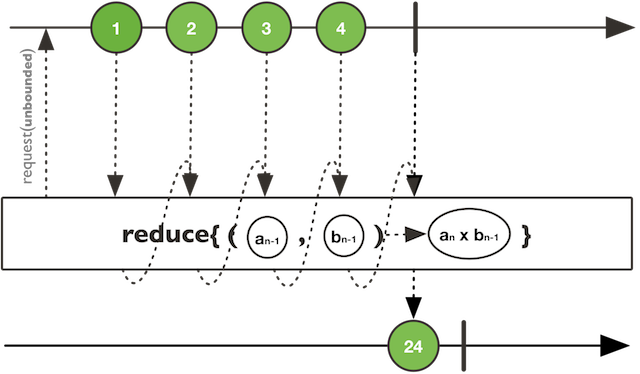
- Parameters:
aggregator- the reducingBiFunction- Returns:
- a reduced
Flux
-
reduce
public final <A> Mono<A> reduce(A initial, BiFunction<A,? super T,A> accumulator)
Reduce the values from thisFluxsequence into an single object matching the type of a seed value. Reduction is performed using aBiFunctionthat takes the intermediate result of the reduction and the current value and returns the next intermediate value of the reduction. First element is paired with the seed value, initial.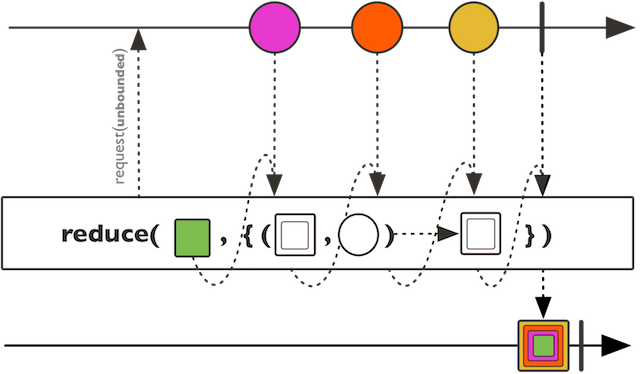
- Type Parameters:
A- the type of the seed and the reduced object- Parameters:
accumulator- the reducingBiFunctioninitial- the seed, the initial leftmost argument to pass to the reducingBiFunction- Returns:
- a reduced
Flux
-
reduceWith
public final <A> Mono<A> reduceWith(Supplier<A> initial, BiFunction<A,? super T,A> accumulator)
Reduce the values from thisFluxsequence into an single object matching the type of a lazily supplied seed value. Reduction is performed using aBiFunctionthat takes the intermediate result of the reduction and the current value and returns the next intermediate value of the reduction. First element is paired with the seed value, supplied via initial.
- Type Parameters:
A- the type of the seed and the reduced object- Parameters:
accumulator- the reducingBiFunctioninitial- aSupplierof the seed, called on subscription and passed to the the reducingBiFunction- Returns:
- a reduced
Flux
-
repeat
public final Flux<T> repeat()
Repeatedly and indefinitely subscribe to the source upon completion of the previous subscription.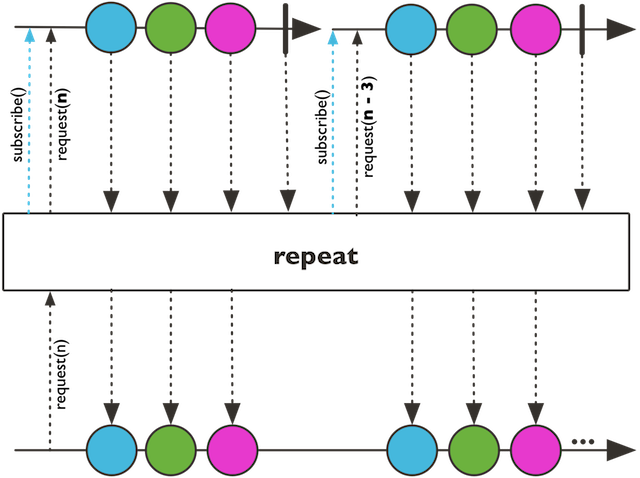
- Returns:
- an indefinitely repeated
Fluxon onComplete
-
repeat
public final Flux<T> repeat(BooleanSupplier predicate)
Repeatedly subscribe to the source if the predicate returns true after completion of the previous subscription.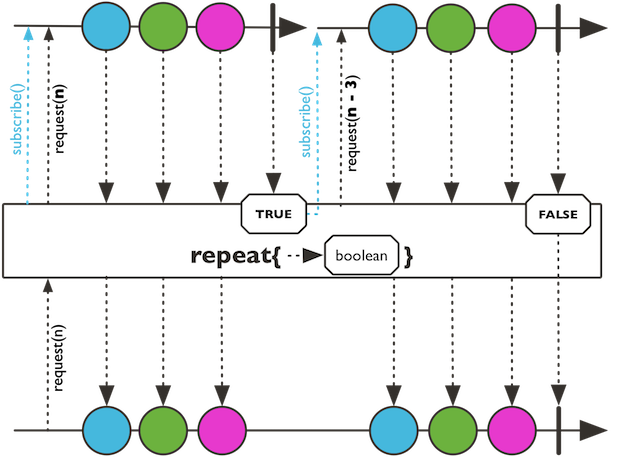
- Parameters:
predicate- the boolean to evaluate on onComplete.- Returns:
- a
Fluxthat repeats on onComplete while the predicate matches
-
repeat
public final Flux<T> repeat(long numRepeat)
Repeatedly subscribe to the source numRepeat times.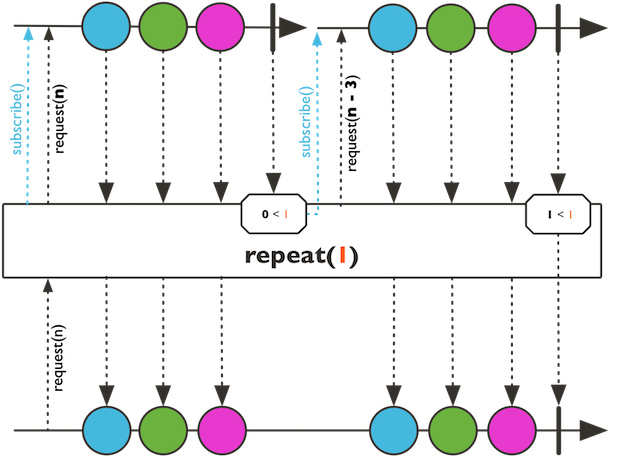
- Parameters:
numRepeat- the number of times to re-subscribe on onComplete- Returns:
- a
Fluxthat repeats on onComplete, up to the specified number of repetitions
-
repeat
public final Flux<T> repeat(long numRepeat, BooleanSupplier predicate)
Repeatedly subscribe to the source if the predicate returns true after completion of the previous subscription. A specified maximum of repeat will limit the number of re-subscribe.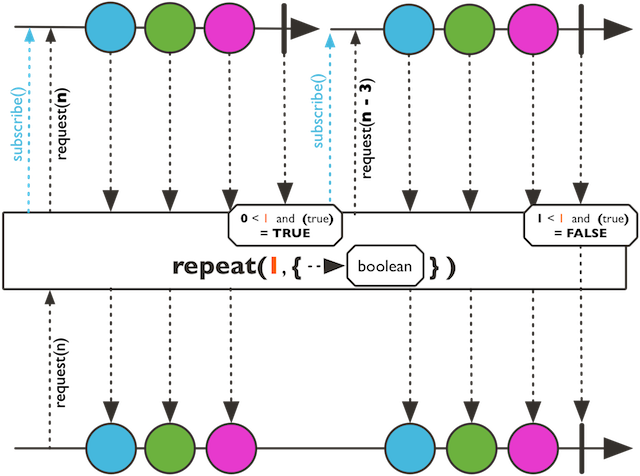
- Parameters:
numRepeat- the number of times to re-subscribe on completepredicate- the boolean to evaluate on onComplete- Returns:
- a
Fluxthat repeats on onComplete while the predicate matches, up to the specified number of repetitions
-
repeatWhen
public final Flux<T> repeatWhen(Function<Flux<Long>,? extends Publisher<?>> repeatFactory)
Repeatedly subscribe to thisFluxwhen a companion sequence emits elements in response to the flux completion signal. Any terminal signal from the companion sequence will terminate the resultingFluxwith the same signal immediately.If the companion sequence signals when this
Fluxis active, the repeat attempt is suppressed.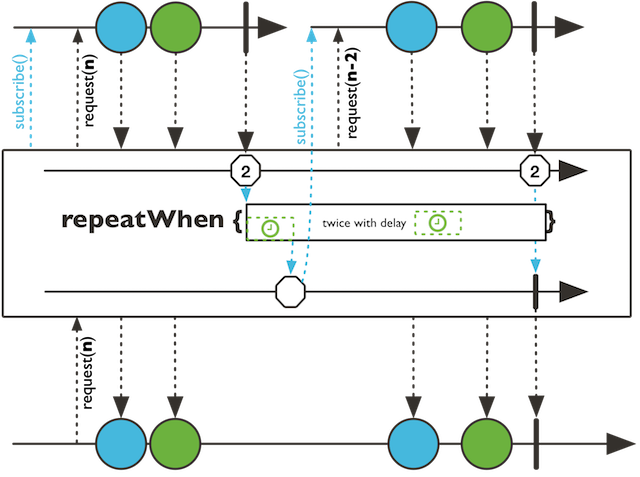
Note that if the companion
Publishercreated by therepeatFactoryemitsContextas trigger objects, theseContextwill REPLACE the operator's own Context. Please be careful there: replacing the Context means that some keys you don't own could be removed, breaking libraries that depend on them. As a result, the recommended approach is to always create such aContexttrigger by starting from the original Context (ensuring the trigger contains all the keys from the original, unless you absolutely know you want to remove one of these keys):.repeatWhen(emittedEachAttempt -> emittedEachAttempt .flatMap(e -> Mono.subscriberContext().map(ctx -> Tuples.of(e, ctx))) .flatMap(t2 -> { long lastEmitted = t2.getT1(); Context ctx = t2.getT2(); int rl = ctx.getOrDefault("repeatsLeft", 0); if (rl > 0) { // /!\ THE ctx.put HERE IS THE ESSENTIAL PART /!\ return Mono.just(ctx.put("repeatsLeft", rl - 1) .put("emitted", lastEmitted)); } else { return Mono.error(new IllegalStateException("repeats exhausted")); } }) ) - Parameters:
repeatFactory- theFunctionthat returns the associatedPublishercompanion, given aFluxthat signals each onComplete as aLongrepresenting the number of source elements emitted in the latest attempt.- Returns:
- a
Fluxthat repeats on onComplete when the companionPublisherproduces an onNext signal
-
replay
public final ConnectableFlux<T> replay()
Turn thisFluxinto a hot source and cache last emitted signals for furtherSubscriber. Will retain an unbounded amount of onNext signals. Completion and Error will also be replayed.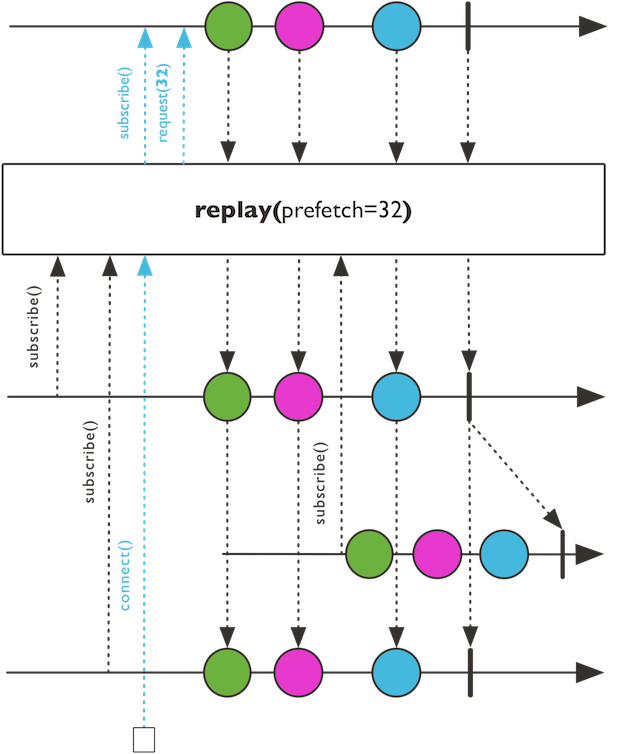
- Returns:
- a replaying
ConnectableFlux
-
replay
public final ConnectableFlux<T> replay(int history)
Turn thisFluxinto a connectable hot source and cache last emitted signals for furtherSubscriber. Will retain up to the given history size onNext signals. Completion and Error will also be replayed.Note that
cache(0)will only cache the terminal signal without expiration.
- Parameters:
history- number of events retained in history excluding complete and error- Returns:
- a replaying
ConnectableFlux
-
replay
public final ConnectableFlux<T> replay(Duration ttl)
Turn thisFluxinto a connectable hot source and cache last emitted signals for furtherSubscriber. Will retain each onNext up to the given per-item expiry timeout.Completion and Error will also be replayed until
ttltriggers in which case the nextSubscriberwill start over a new subscription
- Parameters:
ttl- Per-item and post termination timeout duration- Returns:
- a replaying
ConnectableFlux
-
replay
public final ConnectableFlux<T> replay(int history, Duration ttl)
Turn thisFluxinto a connectable hot source and cache last emitted signals for furtherSubscriber. Will retain up to the given history size onNext signals with a per-item ttl.Completion and Error will also be replayed until
ttltriggers in which case the nextSubscriberwill start over a new subscription
- Parameters:
history- number of events retained in history excluding complete and errorttl- Per-item and post termination timeout duration- Returns:
- a replaying
ConnectableFlux
-
replay
public final ConnectableFlux<T> replay(Duration ttl, Scheduler timer)
Turn thisFluxinto a connectable hot source and cache last emitted signals for furtherSubscriber. Will retain onNext signal for up to the givenDurationwith a per-item ttl.Completion and Error will also be replayed until
ttltriggers in which case the nextSubscriberwill start over a new subscription
- Parameters:
ttl- Per-item and post termination timeout durationtimer- a time-capableSchedulerinstance to read current time from- Returns:
- a replaying
ConnectableFlux
-
replay
public final ConnectableFlux<T> replay(int history, Duration ttl, Scheduler timer)
Turn thisFluxinto a connectable hot source and cache last emitted signals for furtherSubscriber. Will retain up to the given history size onNext signals with a per-item ttl.Completion and Error will also be replayed until
ttltriggers in which case the nextSubscriberwill start over a new subscription
- Parameters:
history- number of events retained in history excluding complete and errorttl- Per-item and post termination timeout durationtimer- aSchedulerinstance to read current time from- Returns:
- a replaying
ConnectableFlux
-
retry
public final Flux<T> retry()
Re-subscribes to thisFluxsequence if it signals any error, indefinitely.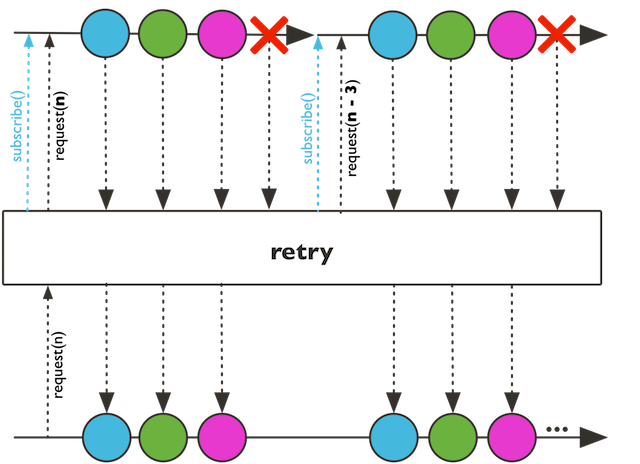
- Returns:
- a
Fluxthat retries on onError
-
retry
public final Flux<T> retry(long numRetries)
Re-subscribes to thisFluxsequence if it signals any error, for a fixed number of times.Note that passing Long.MAX_VALUE is treated as infinite retry.
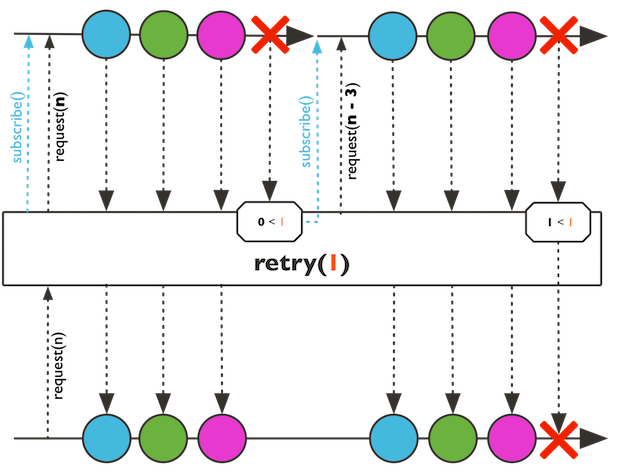
- Parameters:
numRetries- the number of times to tolerate an error- Returns:
- a
Fluxthat retries on onError up to the specified number of retry attempts.
-
retry
public final Flux<T> retry(Predicate<? super Throwable> retryMatcher)
Re-subscribes to thisFluxsequence if it signals any error that matches the givenPredicate, otherwise push the error downstream.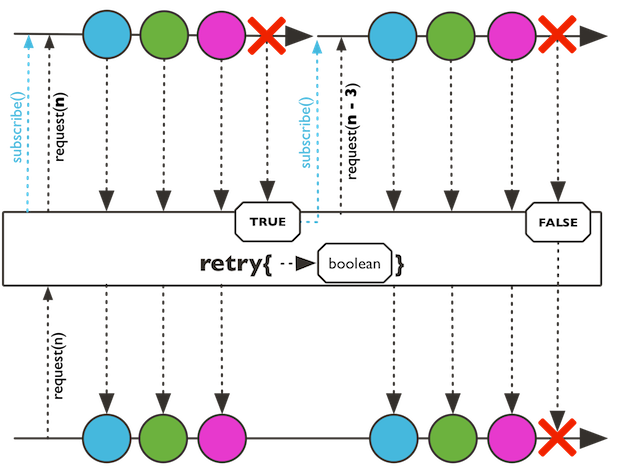
- Parameters:
retryMatcher- the predicate to evaluate if retry should occur based on a given error signal- Returns:
- a
Fluxthat retries on onError if the predicates matches.
-
retry
public final Flux<T> retry(long numRetries, Predicate<? super Throwable> retryMatcher)
Re-subscribes to thisFluxsequence up to the specified number of retries if it signals any error that match the givenPredicate, otherwise push the error downstream.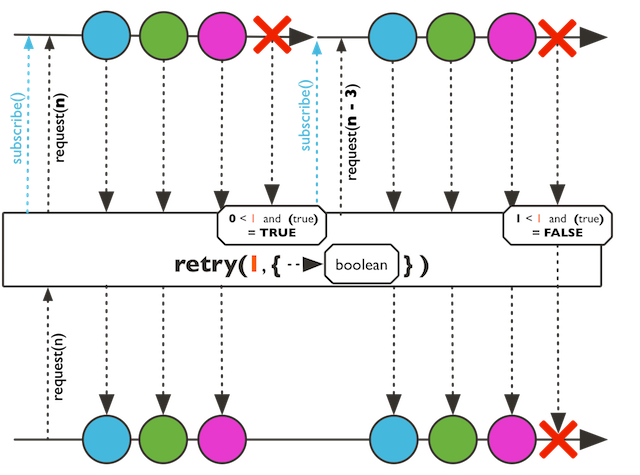
- Parameters:
numRetries- the number of times to tolerate an errorretryMatcher- the predicate to evaluate if retry should occur based on a given error signal- Returns:
- a
Fluxthat retries on onError up to the specified number of retry attempts, only if the predicate matches.
-
retryWhen
public final Flux<T> retryWhen(Function<Flux<Throwable>,? extends Publisher<?>> whenFactory)
Retries thisFluxwhen a companion sequence signals an item in response to thisFluxerror signalIf the companion sequence signals when the
Fluxis active, the retry attempt is suppressed and any terminal signal will terminate theFluxsource with the same signal immediately.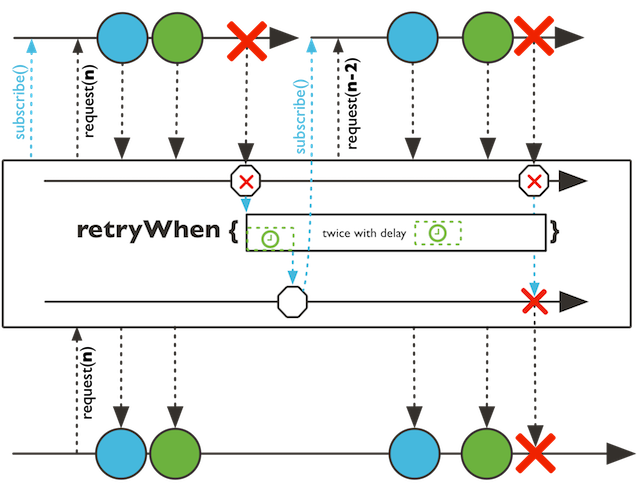
Note that if the companion
Publishercreated by thewhenFactoryemitsContextas trigger objects, theseContextwill REPLACE the operator's own Context. Please be careful there: replacing the Context means that some keys you don't own could be removed, breaking libraries that depend on them. As a result, the recommended approach is to always create such aContexttrigger by starting from the original Context (ensuring the trigger contains all the keys from the original, unless you absolutely know you want to remove one of these keys):.retryWhen(errorCurrentAttempt -> errorCurrentAttempt .flatMap(e -> Mono.subscriberContext().map(ctx -> Tuples.of(e, ctx))) .flatMap(t2 -> { Throwable lastError = t2.getT1(); Context ctx = t2.getT2(); int rl = ctx.getOrDefault("retriesLeft", 0); if (rl > 0) { // /!\ THE ctx.put HERE IS THE ESSENTIAL PART /!\ return Mono.just(ctx.put("retriesLeft", rl - 1) .put("lastError", lastError)); } else { return Mono.error(new IllegalStateException("retries exhausted", lastError)); } }) )
-
sample
public final Flux<T> sample(Duration timespan)
Sample thisFluxby periodically emitting an item corresponding to thatFluxlatest emitted value within the periodical time window. Note that if some elements are emitted quicker than the timespan just before source completion, the last of these elements will be emitted along with the onComplete signal.
- Parameters:
timespan- the duration of the window after which to emit the latest observed item- Returns:
- a
Fluxsampled to the last item seen over each periodic window
-
sample
public final <U> Flux<T> sample(Publisher<U> sampler)
Sample thisFluxby emitting an item corresponding to thatFluxlatest emitted value whenever a companion samplerPublishersignals a value.Termination of either
Publisherwill result in termination for theSubscriberas well. Note that if some elements are emitted just before source completion and before a last sampler can trigger, the last of these elements will be emitted along with the onComplete signal.Both
Publisherwill run in unbounded mode because the backpressure would interfere with the sampling precision.
-
sampleFirst
public final Flux<T> sampleFirst(Duration timespan)
Repeatedly take a value from thisFluxthen skip the values that follow within a given duration.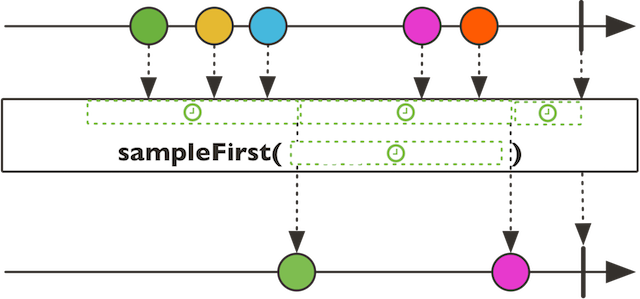
- Parameters:
timespan- the duration during which to skip values after each sample- Returns:
- a
Fluxsampled to the first item of each duration-based window
-
sampleFirst
public final <U> Flux<T> sampleFirst(Function<? super T,? extends Publisher<U>> samplerFactory)
-
sampleTimeout
public final <U> Flux<T> sampleTimeout(Function<? super T,? extends Publisher<U>> throttlerFactory)
Emit the latest value from thisFluxonly if there were no new values emitted during the window defined by a companionPublisherderived from that particular value.Note that this means that the last value in the sequence is always emitted.
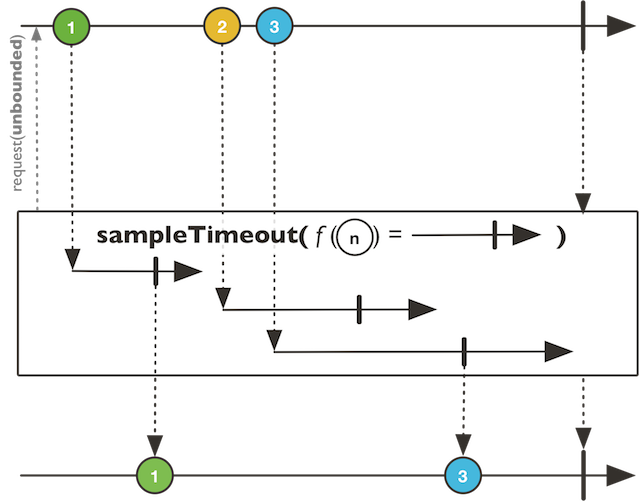
- Type Parameters:
U- the companion reified type- Parameters:
throttlerFactory- supply a companion samplerPublisherwhich signals the end of the window during which no new emission should occur. If it is the case, the original value triggering the window is emitted.- Returns:
- a
Fluxsampled to items not followed by any other item within a window defined by a companionPublisher
-
sampleTimeout
public final <U> Flux<T> sampleTimeout(Function<? super T,? extends Publisher<U>> throttlerFactory, int maxConcurrency)
Emit the latest value from thisFluxonly if there were no new values emitted during the window defined by a companionPublisherderived from that particular value.The provided maxConcurrency will keep a bounded maximum of concurrent timeouts and drop any new items until at least one timeout terminates.
Note that this means that the last value in the sequence is always emitted.

- Type Parameters:
U- the throttling type- Parameters:
throttlerFactory- supply a companion samplerPublisherwhich signals the end of the window during which no new emission should occur. If it is the case, the original value triggering the window is emitted.maxConcurrency- the maximum number of concurrent timeouts- Returns:
- a
Fluxsampled to items not followed by any other item within a window defined by a companionPublisher
-
scan
public final Flux<T> scan(BiFunction<T,T,T> accumulator)
Reduce thisFluxvalues with an accumulatorBiFunctionand also emit the intermediate results of this function.Unlike
scan(Object, BiFunction), this operator doesn't take an initial value but treats the firstFluxvalue as initial value.
The accumulation works as follows:result[0] = source[0] result[1] = accumulator(result[0], source[1]) result[2] = accumulator(result[1], source[2]) result[3] = accumulator(result[2], source[3]) ...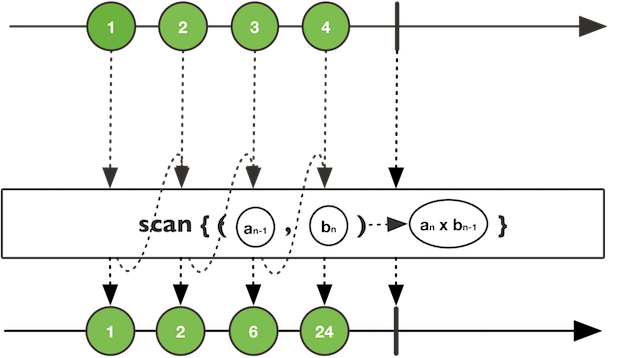
- Parameters:
accumulator- the accumulatingBiFunction- Returns:
- an accumulating
Flux
-
scan
public final <A> Flux<A> scan(A initial, BiFunction<A,? super T,A> accumulator)
Reduce thisFluxvalues with an accumulatorBiFunctionand also emit the intermediate results of this function.The accumulation works as follows:
result[0] = initialValue; result[1] = accumulator(result[0], source[0]) result[2] = accumulator(result[1], source[1]) result[3] = accumulator(result[2], source[2]) ...
- Type Parameters:
A- the accumulated type- Parameters:
initial- the initial leftmost argument to pass to the reduce functionaccumulator- the accumulatingBiFunction- Returns:
- an accumulating
Fluxstarting with initial state
-
scanWith
public final <A> Flux<A> scanWith(Supplier<A> initial, BiFunction<A,? super T,A> accumulator)
Reduce thisFluxvalues with the help of an accumulatorBiFunctionand also emits the intermediate results. A seed value is lazily provided by aSupplierinvoked for eachSubscriber.The accumulation works as follows:
result[0] = initialValue; result[1] = accumulator(result[0], source[0]) result[2] = accumulator(result[1], source[1]) result[3] = accumulator(result[2], source[2]) ...
- Type Parameters:
A- the accumulated type- Parameters:
initial- the supplier providing the seed, the leftmost parameter initially passed to the reduce functionaccumulator- the accumulatingBiFunction- Returns:
- an accumulating
Fluxstarting with initial state
-
share
public final Flux<T> share()
Returns a newFluxthat multicasts (shares) the originalFlux. As long as there is at least oneSubscriberthisFluxwill be subscribed and emitting data. When all subscribers have cancelled it will cancel the sourceFlux.This is an alias for
publish().ConnectableFlux.refCount().
-
single
public final Mono<T> single()
Expect and emit a single item from thisFluxsource or signalNoSuchElementExceptionfor an empty source, orIndexOutOfBoundsExceptionfor a source with more than one element.
- Returns:
- a
Monowith the single item or an error signal
-
single
public final Mono<T> single(T defaultValue)
Expect and emit a single item from thisFluxsource and emit a default value for an empty source, but signal anIndexOutOfBoundsExceptionfor a source with more than one element.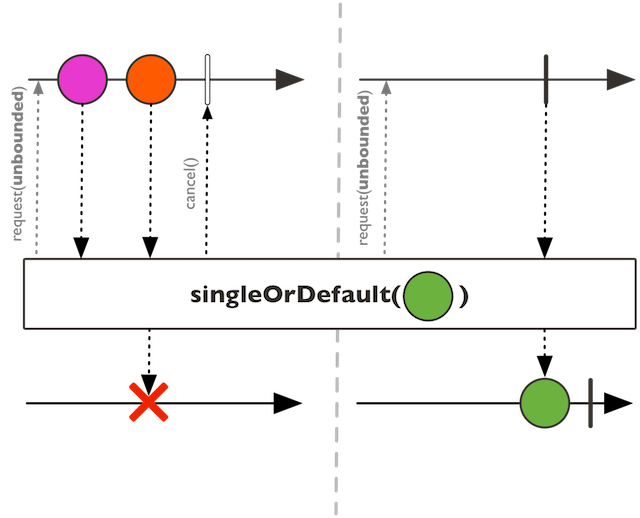
-
singleOrEmpty
public final Mono<T> singleOrEmpty()
Expect and emit a single item from thisFluxsource, and accept an empty source but signal anIndexOutOfBoundsExceptionfor a source with more than one element.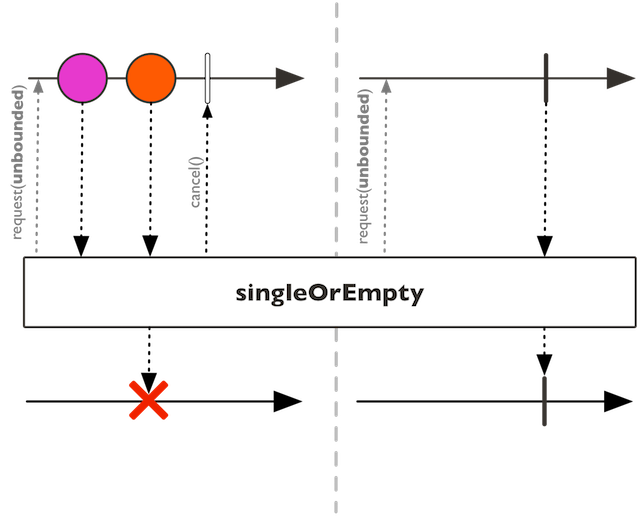
- Returns:
- a
Monowith the expected single item, no item or an error
-
skip
public final Flux<T> skip(long skipped)
Skip the specified number of elements from the beginning of thisFluxthen emit the remaining elements.
- Parameters:
skipped- the number of elements to drop- Returns:
- a dropping
Fluxwith the specified number of elements skipped at the beginning
-
skip
public final Flux<T> skip(Duration timespan)
Skip elements from thisFluxemitted within the specified initial duration.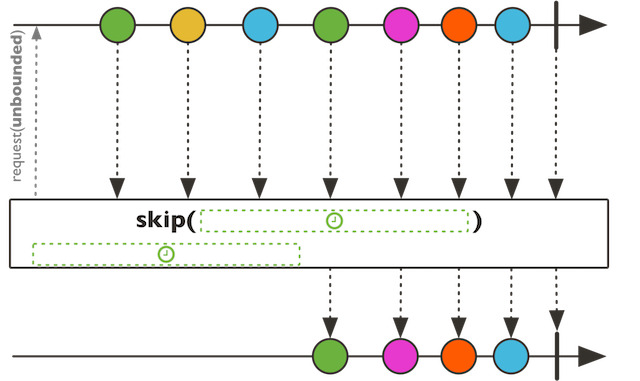
- Parameters:
timespan- the initial time window during which to drop elements- Returns:
- a
Fluxdropping at the beginning until the end of the given duration
-
skipLast
public final Flux<T> skipLast(int n)
Skip a specified number of elements at the end of thisFluxsequence.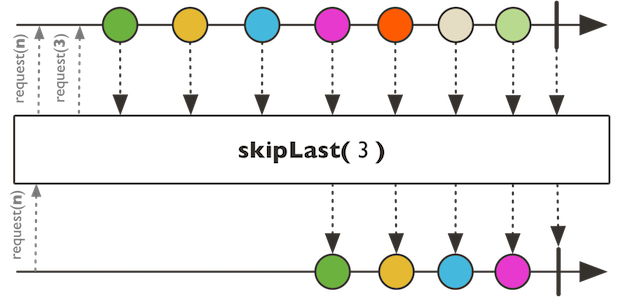
- Parameters:
n- the number of elements to drop before completion- Returns:
- a
Fluxdropping the specified number of elements at the end of the sequence
-
sort
public final Flux<T> sort()
Sort elements from thisFluxby collecting and sorting them in the background then emitting the sorted sequence once this sequence completes. Each item emitted by theFluxmust implementComparablewith respect to all other items in the sequence.Note that calling
sortwith long, non-terminating or infinite sources might causeOutOfMemoryError. Use sequence splitting likewindow(int)to sort batches in that case.- Returns:
- a sorted
Flux - Throws:
ClassCastException- if any item emitted by theFluxdoes not implementComparablewith respect to all other items emitted by theFlux
-
sort
public final Flux<T> sort(Comparator<? super T> sortFunction)
Sort elements from thisFluxusing aComparatorfunction, by collecting and sorting elements in the background then emitting the sorted sequence once this sequence completes.Note that calling
sortwith long, non-terminating or infinite sources might causeOutOfMemoryError
-
startWith
@SafeVarargs public final Flux<T> startWith(T... values)
Prepend the given values before thisFluxsequence.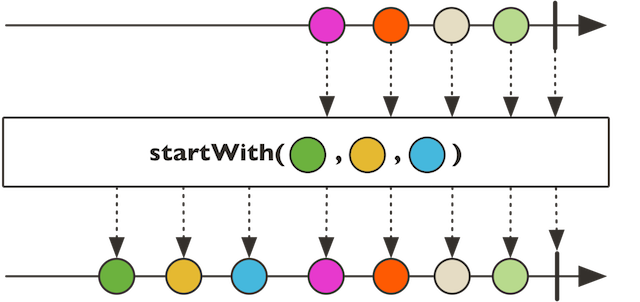
-
subscribe
public final Disposable subscribe()
Subscribe to thisFluxand request unbounded demand.This version doesn't specify any consumption behavior for the events from the chain, especially no error handling, so other variants should usually be preferred.
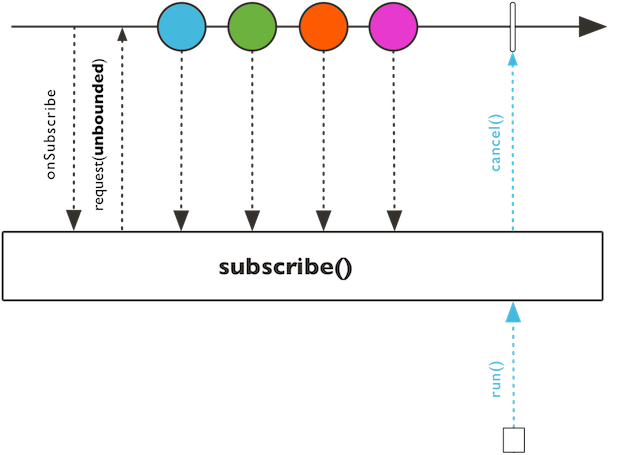
- Returns:
- a new
Disposablethat can be used to cancel the underlyingSubscription
-
subscribe
public final Disposable subscribe(Consumer<? super T> consumer)
Subscribe aConsumerto thisFluxthat will consume all the elements in the sequence. It will request an unbounded demand (Long.MAX_VALUE).For a passive version that observe and forward incoming data see
doOnNext(java.util.function.Consumer).For a version that gives you more control over backpressure and the request, see
subscribe(Subscriber)with aBaseSubscriber.Keep in mind that since the sequence can be asynchronous, this will immediately return control to the calling thread. This can give the impression the consumer is not invoked when executing in a main thread or a unit test for instance.

- Parameters:
consumer- the consumer to invoke on each value (onNext signal)- Returns:
- a new
Disposablethat can be used to cancel the underlyingSubscription
-
subscribe
public final Disposable subscribe(@Nullable Consumer<? super T> consumer, Consumer<? super Throwable> errorConsumer)
Subscribe to thisFluxwith aConsumerthat will consume all the elements in the sequence, as well as aConsumerthat will handle errors. The subscription will request an unbounded demand (Long.MAX_VALUE).For a passive version that observe and forward incoming data see
doOnNext(java.util.function.Consumer)anddoOnError(java.util.function.Consumer).For a version that gives you more control over backpressure and the request, see
subscribe(Subscriber)with aBaseSubscriber.Keep in mind that since the sequence can be asynchronous, this will immediately return control to the calling thread. This can give the impression the consumers are not invoked when executing in a main thread or a unit test for instance.

- Parameters:
consumer- the consumer to invoke on each next signalerrorConsumer- the consumer to invoke on error signal- Returns:
- a new
Disposablethat can be used to cancel the underlyingSubscription
-
subscribe
public final Disposable subscribe(@Nullable Consumer<? super T> consumer, @Nullable Consumer<? super Throwable> errorConsumer, @Nullable Runnable completeConsumer)
SubscribeConsumerto thisFluxthat will respectively consume all the elements in the sequence, handle errors and react to completion. The subscription will request unbounded demand (Long.MAX_VALUE).For a passive version that observe and forward incoming data see
doOnNext(java.util.function.Consumer),doOnError(java.util.function.Consumer)anddoOnComplete(Runnable).For a version that gives you more control over backpressure and the request, see
subscribe(Subscriber)with aBaseSubscriber.Keep in mind that since the sequence can be asynchronous, this will immediately return control to the calling thread. This can give the impression the consumer is not invoked when executing in a main thread or a unit test for instance.
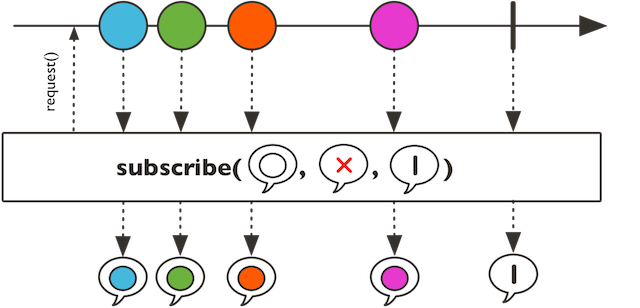
- Parameters:
consumer- the consumer to invoke on each valueerrorConsumer- the consumer to invoke on error signalcompleteConsumer- the consumer to invoke on complete signal- Returns:
- a new
Disposablethat can be used to cancel the underlyingSubscription
-
subscribe
public final Disposable subscribe(@Nullable Consumer<? super T> consumer, @Nullable Consumer<? super Throwable> errorConsumer, @Nullable Runnable completeConsumer, @Nullable Consumer<? super Subscription> subscriptionConsumer)
SubscribeConsumerto thisFluxthat will respectively consume all the elements in the sequence, handle errors, react to completion, and request upon subscription. It will let the providedsubscriptionConsumerrequest the adequate amount of data, or request unbounded demandLong.MAX_VALUEif no such consumer is provided.For a passive version that observe and forward incoming data see
doOnNext(java.util.function.Consumer),doOnError(java.util.function.Consumer),doOnComplete(Runnable)anddoOnSubscribe(Consumer).For a version that gives you more control over backpressure and the request, see
subscribe(Subscriber)with aBaseSubscriber.Keep in mind that since the sequence can be asynchronous, this will immediately return control to the calling thread. This can give the impression the consumer is not invoked when executing in a main thread or a unit test for instance.

- Parameters:
consumer- the consumer to invoke on each valueerrorConsumer- the consumer to invoke on error signalcompleteConsumer- the consumer to invoke on complete signalsubscriptionConsumer- the consumer to invoke on subscribe signal, to be used for the initialrequest, or null for max request- Returns:
- a new
Disposablethat can be used to cancel the underlyingSubscription
-
subscribe
public final void subscribe(Subscriber<? super T> actual)
-
subscribe
public abstract void subscribe(CoreSubscriber<? super T> actual)
An internalPublisher.subscribe(Subscriber)that will bypassHooks.onLastOperator(Function)pointcut.In addition to behave as expected by
Publisher.subscribe(Subscriber)in a controlled manner, it supports direct subscribe-timeContextpassing.- Parameters:
actual- theSubscriberinterested into the published sequence- See Also:
subscribe(Subscriber)
-
subscriberContext
public final Flux<T> subscriberContext(Context mergeContext)
Enrich a potentially empty downstreamContextby adding all values from the givenContext, producing a newContextthat is propagated upstream.The
Contextpropagation happens once per subscription (not on each onNext): it is done during thesubscribe(Subscriber)phase, which runs from the last operator of a chain towards the first.So this operator enriches a
Contextcoming from under it in the chain (downstream, by default an empty one) and passes the new enrichedContextto operators above it in the chain (upstream, by way of them usingFlux#subscribe(Subscriber,Context)).
-
subscriberContext
public final Flux<T> subscriberContext(Function<Context,Context> doOnContext)
Enrich a potentially empty downstreamContextby applying aFunctionto it, producing a newContextthat is propagated upstream.The
Contextpropagation happens once per subscription (not on each onNext): it is done during thesubscribe(Subscriber)phase, which runs from the last operator of a chain towards the first.So this operator enriches a
Contextcoming from under it in the chain (downstream, by default an empty one) and passes the new enrichedContextto operators above it in the chain (upstream, by way of them usingFlux#subscribe(Subscriber,Context)).
-
subscribeOn
public final Flux<T> subscribeOn(Scheduler scheduler)
Run subscribe, onSubscribe and request on a specifiedScheduler'sScheduler.Worker. As such, placing this operator anywhere in the chain will also impact the execution context of onNext/onError/onComplete signals from the beginning of the chain up to the next occurrence of apublishOn.Note that if you are using an eager or blocking
create(Consumer, FluxSink.OverflowStrategy)as the source, it can lead to deadlocks due to requests piling up behind the emitter. In such case, you should callsubscribeOn(scheduler, false)instead.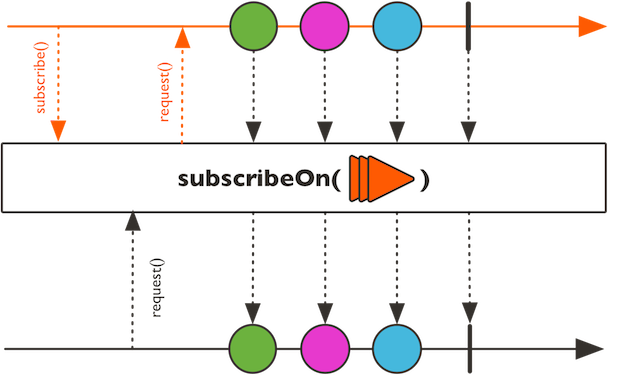
Typically used for slow publisher e.g., blocking IO, fast consumer(s) scenarios.
flux.subscribeOn(Schedulers.single()).subscribe()Note that
Scheduler.Worker.schedule(Runnable)raisingRejectedExecutionExceptionon lateSubscription.request(long)will be propagated to the request caller.- Parameters:
scheduler- aSchedulerproviding theScheduler.Workerwhere to subscribe- Returns:
- a
Fluxrequesting asynchronously - See Also:
publishOn(Scheduler),subscribeOn(Scheduler, boolean)
-
subscribeOn
public final Flux<T> subscribeOn(Scheduler scheduler, boolean requestOnSeparateThread)
Run subscribe and onSubscribe on a specifiedScheduler'sScheduler.Worker. Request will be run on that worker too depending on therequestOnSeparateThreadparameter (which defaults to true in thesubscribeOn(Scheduler)version). As such, placing this operator anywhere in the chain will also impact the execution context of onNext/onError/onComplete signals from the beginning of the chain up to the next occurrence of apublishOn.Note that if you are using an eager or blocking
create(Consumer, FluxSink.OverflowStrategy)as the source, it can lead to deadlocks due to requests piling up behind the emitter. Thus this operator has arequestOnSeparateThreadparameter, which should be set tofalsein this case.
Typically used for slow publisher e.g., blocking IO, fast consumer(s) scenarios.
flux.subscribeOn(Schedulers.single()).subscribe()Note that
Scheduler.Worker.schedule(Runnable)raisingRejectedExecutionExceptionon lateSubscription.request(long)will be propagated to the request caller.- Parameters:
scheduler- aSchedulerproviding theScheduler.Workerwhere to subscriberequestOnSeparateThread- whether or not to also perform requests on the worker.trueto behave likesubscribeOn(Scheduler)- Returns:
- a
Fluxrequesting asynchronously - See Also:
publishOn(Scheduler),subscribeOn(Scheduler)
-
subscribeWith
public final <E extends Subscriber<? super T>> E subscribeWith(E subscriber)
Subscribe the givenSubscriberto thisFluxand return saidSubscriber(eg. aFluxProcessor).
If you need more control over backpressure and the request, use aflux.subscribeWith(WorkQueueProcessor.create()).subscribe()BaseSubscriber.- Type Parameters:
E- the reified type from the input/output subscriber- Parameters:
subscriber- theSubscriberto subscribe with and return- Returns:
- the passed
Subscriber
-
switchIfEmpty
public final Flux<T> switchIfEmpty(Publisher<? extends T> alternate)
Switch to an alternativePublisherif this sequence is completed without any data.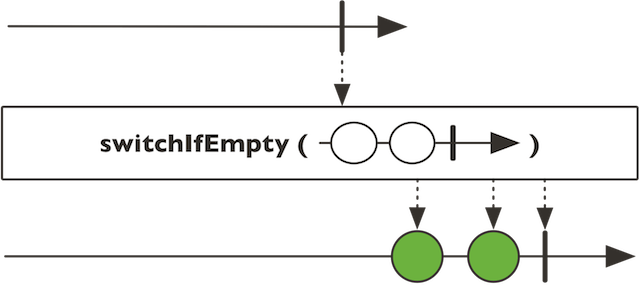
-
switchMap
public final <V> Flux<V> switchMap(Function<? super T,Publisher<? extends V>> fn, int prefetch)
-
tag
public final Flux<T> tag(String key, String value)
Tag this flux with a key/value pair. These can be retrieved as aSetof all tags throughout the publisher chain by usingScannable.tags()(as traversed byScannable.parents()).- Parameters:
key- a tag keyvalue- a tag value- Returns:
- the same sequence, but bearing tags
-
take
public final Flux<T> take(long n)
Take only the first N values from thisFlux, if available.
If N is zero, the resulting
Fluxcompletes as soon as thisFluxsignals its first value (which is not not relayed, though).Note that this operator doesn't manipulate the backpressure requested amount. Rather, it merely lets requests from downstream propagate as is and cancels once N elements have been emitted. As a result, the source could produce a lot of extraneous elements in the meantime. If that behavior is undesirable and you do not own the request from downstream (e.g. prefetching operators), consider using
limitRequest(long)instead.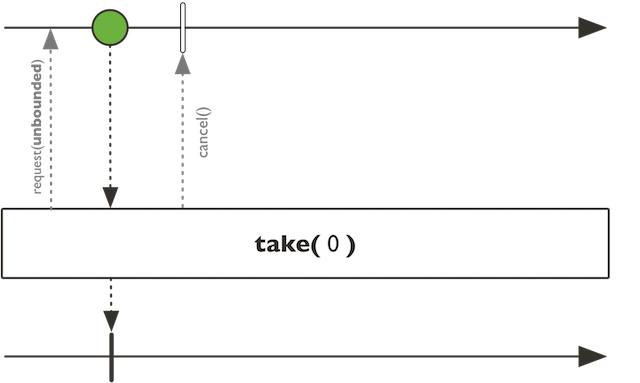
- Parameters:
n- the number of items to emit from thisFlux- Returns:
- a
Fluxlimited to size N - See Also:
limitRequest(long)
-
takeLast
public final Flux<T> takeLast(int n)
Emit the last N values thisFluxemitted before its completion.
-
takeUntil
public final Flux<T> takeUntil(Predicate<? super T> predicate)
Relay values from thisFluxuntil the givenPredicatematches. This includes the matching data (unliketakeWhile(java.util.function.Predicate<? super T>)).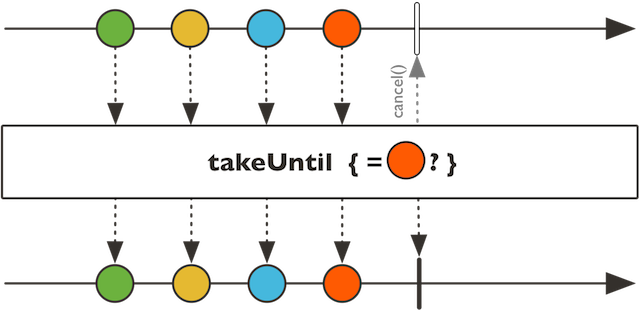
-
takeWhile
public final Flux<T> takeWhile(Predicate<? super T> continuePredicate)
Relay values from thisFluxwhile a predicate returns TRUE for the values (checked before each value is delivered). This only includes the matching data (unliketakeUntil(java.util.function.Predicate<? super T>)).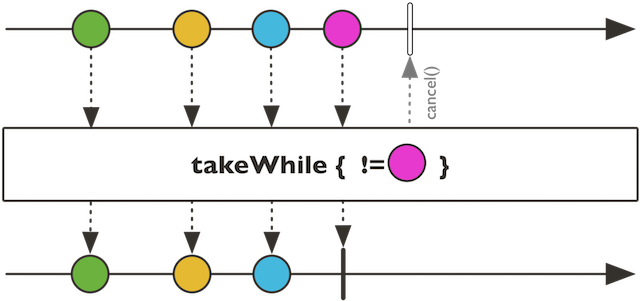
-
then
public final Mono<Void> then()
Return aMono<Void>that completes when thisFluxcompletes. This will actively ignore the sequence and only replay completion or error signals.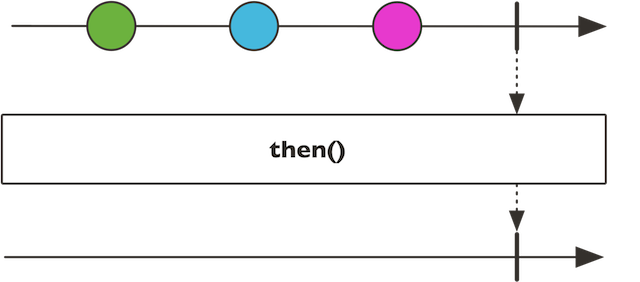
-
thenEmpty
public final Mono<Void> thenEmpty(Publisher<Void> other)
Return aMono<Void>that waits for thisFluxto complete then for a suppliedPublisher<Void>to also complete. The second completion signal is replayed, or any error signal that occurs instead.
-
timeout
public final Flux<T> timeout(Duration timeout)
Propagate aTimeoutExceptionas soon as no item is emitted within the givenDurationfrom the previous emission (or the subscription for the first item).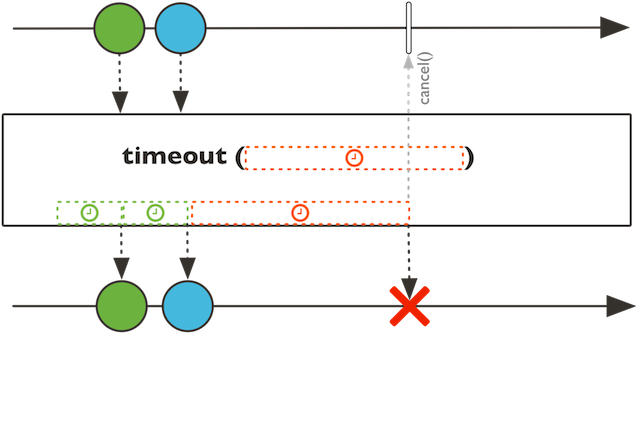
-
timeout
public final Flux<T> timeout(Duration timeout, @Nullable Publisher<? extends T> fallback)
Switch to a fallbackFluxas soon as no item is emitted within the givenDurationfrom the previous emission (or the subscription for the first item).If the given
Publisheris null, signal aTimeoutExceptioninstead.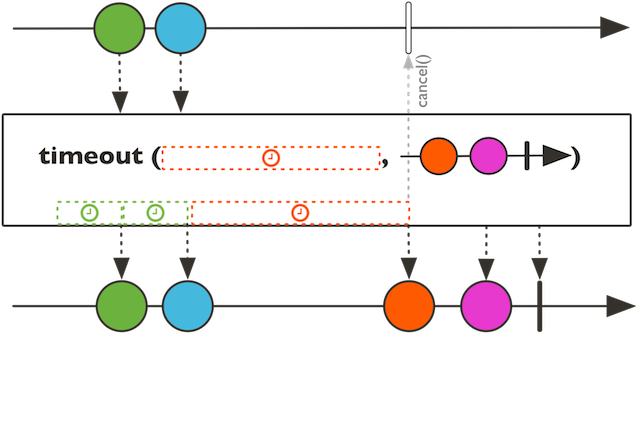
-
timeout
public final Flux<T> timeout(Duration timeout, Scheduler timer)
Propagate aTimeoutExceptionas soon as no item is emitted within the givenDurationfrom the previous emission (or the subscription for the first item), as measured by the specifiedScheduler.
-
timeout
public final Flux<T> timeout(Duration timeout, @Nullable Publisher<? extends T> fallback, Scheduler timer)
Switch to a fallbackFluxas soon as no item is emitted within the givenDurationfrom the previous emission (or the subscription for the first item), as measured on the specifiedScheduler.If the given
Publisheris null, signal aTimeoutExceptioninstead.
-
timeout
public final <U> Flux<T> timeout(Publisher<U> firstTimeout)
Signal aTimeoutExceptionin case the first item from thisFluxhas not been emitted before the givenPublisheremits.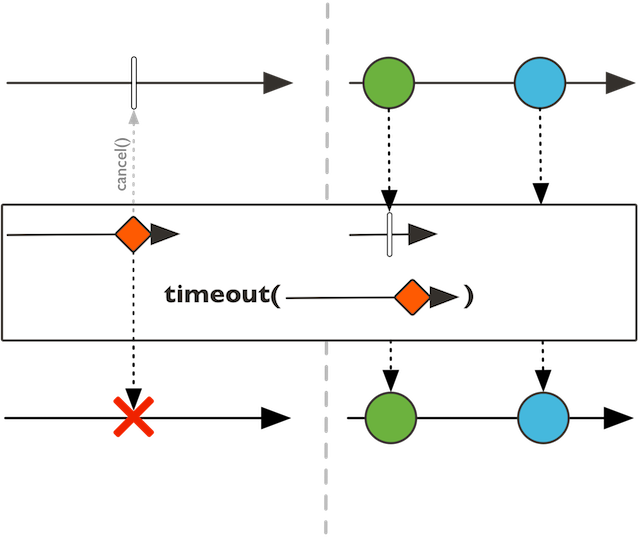
-
timeout
public final <U,V> Flux<T> timeout(Publisher<U> firstTimeout, Function<? super T,? extends Publisher<V>> nextTimeoutFactory)
Signal aTimeoutExceptionin case the first item from thisFluxhas not been emitted before thefirstTimeoutPublisheremits, and whenever each subsequent elements is not emitted before aPublishergenerated from the latest element signals.
- Type Parameters:
U- the type of the elements of the first timeout PublisherV- the type of the elements of the subsequent timeout Publishers- Parameters:
firstTimeout- the timeoutPublisherthat must not emit before the first signal from thisFluxnextTimeoutFactory- the timeoutPublisherfactory for each next item- Returns:
- a
Fluxthat can time out if each element does not come before a signal from a per-item companionPublisher
-
timeout
public final <U,V> Flux<T> timeout(Publisher<U> firstTimeout, Function<? super T,? extends Publisher<V>> nextTimeoutFactory, Publisher<? extends T> fallback)
Switch to a fallbackPublisherin case the first item from thisFluxhas not been emitted before thefirstTimeoutPublisheremits, and whenever each subsequent elements is not emitted before aPublishergenerated from the latest element signals.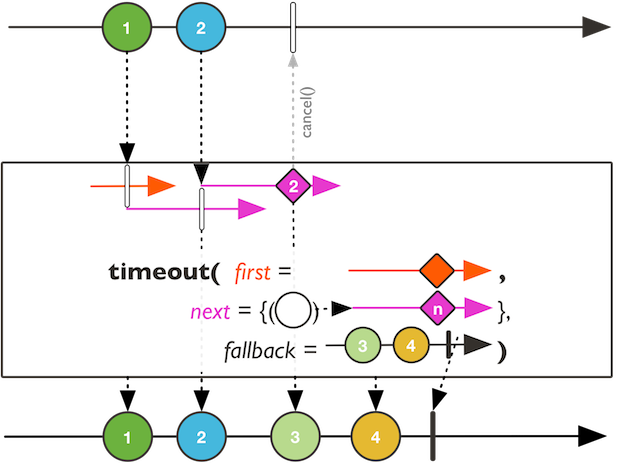
- Type Parameters:
U- the type of the elements of the first timeout PublisherV- the type of the elements of the subsequent timeout Publishers- Parameters:
firstTimeout- the timeoutPublisherthat must not emit before the first signal from thisFluxnextTimeoutFactory- the timeoutPublisherfactory for each next itemfallback- the fallbackPublisherto subscribe when a timeout occurs- Returns:
- a
Fluxthat can time out if each element does not come before a signal from a per-item companionPublisher
-
timestamp
public final Flux<Tuple2<Long,T>> timestamp()
Emit aTuple2pair of T1 the current clock time in millis (as aLongmeasured by theparallelScheduler) and T2 the emitted data (as aT), for each item from thisFlux.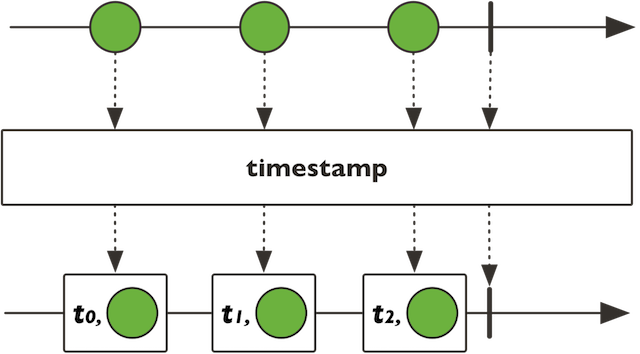
- Returns:
- a timestamped
Flux
-
toIterable
public final Iterable<T> toIterable(int batchSize, @Nullable Supplier<Queue<T>> queueProvider)
-
toStream
public final Stream<T> toStream()
- Returns:
- a
Streamof unknown size with onClose attached toSubscription.cancel()
-
toStream
public final Stream<T> toStream(int batchSize)
- Parameters:
batchSize- the bounded capacity to prefetch from thisFluxorInteger.MAX_VALUEfor unbounded demand
- Returns:
- a
Streamof unknown size with onClose attached toSubscription.cancel()
-
transform
public final <V> Flux<V> transform(Function<? super Flux<T>,? extends Publisher<V>> transformer)
Transform thisFluxin order to generate a targetFlux. Unlikecompose(Function), the provided function is executed as part of assembly.Function<Flux, Flux> applySchedulers = flux -> flux.subscribeOn(Schedulers.elastic()) .publishOn(Schedulers.parallel()); flux.transform(applySchedulers).map(v -> v * v).subscribe();- Type Parameters:
V- the item type in the returnedFlux- Parameters:
transformer- theFunctionto immediately map thisFluxinto a targetFluxinstance.- Returns:
- a new
Flux - See Also:
for deferred composition of {@link Flux} for each {@link Subscriber},for a loose conversion to an arbitrary type
-
window
public final Flux<Flux<T>> window(Duration timespan, Duration timeshift)
Split thisFluxsequence into multipleFluxwindows that open for a giventimespanDuration, after which it closes with onComplete. Each window is opened at a regulartimeShiftinterval, starting from the first item. Both durations are measured on theparallelScheduler.When timespan < timeshift : dropping windows
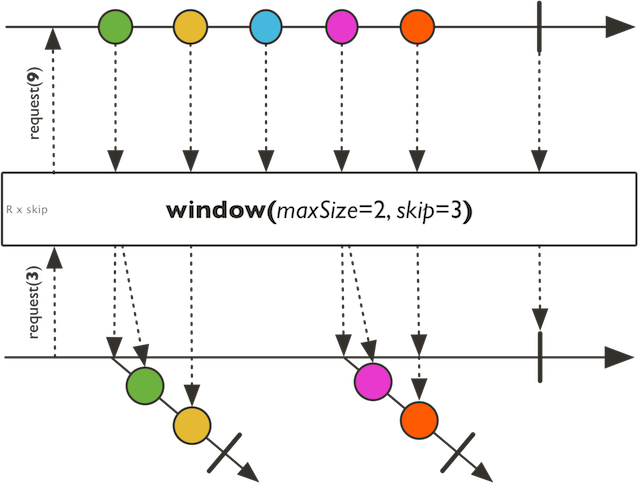
When timespan > timeshift : overlapping windows
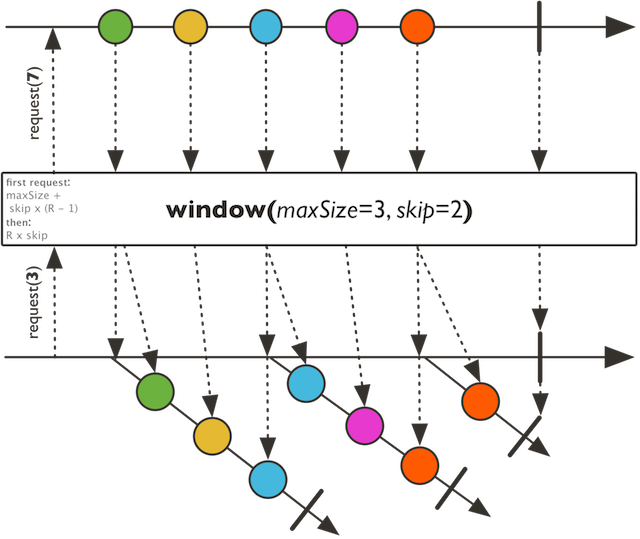
When timespan == timeshift : exact windows
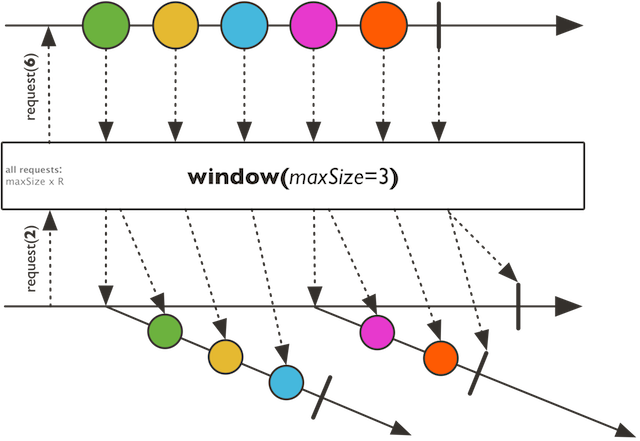
-
window
public final Flux<Flux<T>> window(Duration timespan, Duration timeshift, Scheduler timer)
Split thisFluxsequence into multipleFluxwindows that open for a giventimespanDuration, after which it closes with onComplete. Each window is opened at a regulartimeShiftinterval, starting from the first item. Both durations are measured on the providedScheduler.When timespan < timeshift : dropping windows

When timespan > timeshift : overlapping windows

When timeshift == timeshift : exact windows

-
windowTimeout
public final Flux<Flux<T>> windowTimeout(int maxSize, Duration timespan, Scheduler timer)
-
windowUntil
public final Flux<Flux<T>> windowUntil(Predicate<T> boundaryTrigger, boolean cutBefore)
Split thisFluxsequence into multipleFluxwindows delimited by the given predicate. A new window is opened each time the predicate returns true.If
cutBeforeis true, the old window will onComplete and the triggering element will be emitted in the new window. Note it can mean that an empty window is sometimes emitted, eg. if the first element in the sequence immediately matches the predicate.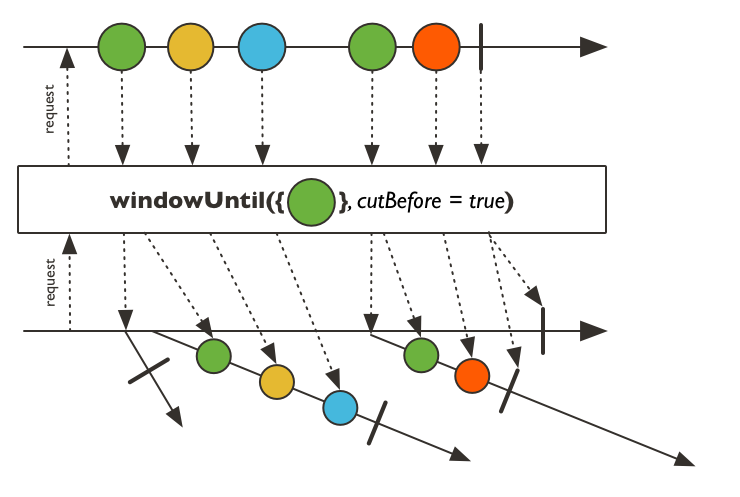
Otherwise, the triggering element will be emitted in the old window before it does onComplete, similar to
windowUntil(Predicate).
-
windowUntil
public final Flux<Flux<T>> windowUntil(Predicate<T> boundaryTrigger, boolean cutBefore, int prefetch)
Split thisFluxsequence into multipleFluxwindows delimited by the given predicate and using a prefetch. A new window is opened each time the predicate returns true.If
cutBeforeis true, the old window will onComplete and the triggering element will be emitted in the new window. Note it can mean that an empty window is sometimes emitted, eg. if the first element in the sequence immediately matches the predicate.
Otherwise, the triggering element will be emitted in the old window before it does onComplete, similar to
windowUntil(Predicate).
- Parameters:
boundaryTrigger- a predicate that triggers the next window when it becomes true.cutBefore- push to true to include the triggering element in the new window rather than the old.prefetch- the request size to use for thisFlux.- Returns:
- a
FluxofFluxwindows, bounded depending on the predicate.
-
windowWhile
public final Flux<Flux<T>> windowWhile(Predicate<T> inclusionPredicate)
Split thisFluxsequence into multipleFluxwindows that stay open while a given predicate matches the source elements. Once the predicate returns false, the window closes with an onComplete and the triggering element is discarded.Note that for a sequence starting with a separator, or having several subsequent separators anywhere in the sequence, each occurrence will lead to an empty window.
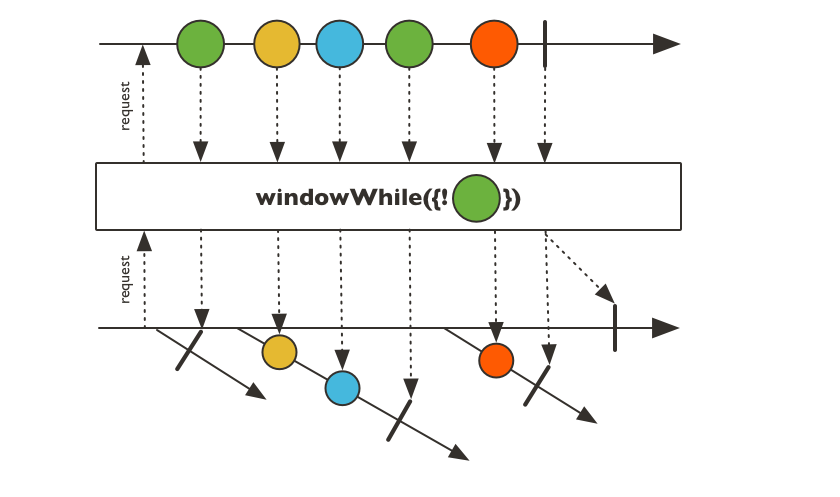
-
windowWhile
public final Flux<Flux<T>> windowWhile(Predicate<T> inclusionPredicate, int prefetch)
Split thisFluxsequence into multipleFluxwindows that stay open while a given predicate matches the source elements. Once the predicate returns false, the window closes with an onComplete and the triggering element is discarded.Note that for a sequence starting with a separator, or having several subsequent separators anywhere in the sequence, each occurrence will lead to an empty window.

-
windowWhen
public final <U,V> Flux<Flux<T>> windowWhen(Publisher<U> bucketOpening, Function<? super U,? extends Publisher<V>> closeSelector)
Split thisFluxsequence into potentially overlapping windows controlled by items of a startPublisherand endPublisherderived from the start values.When Open signal is strictly not overlapping Close signal : dropping windows
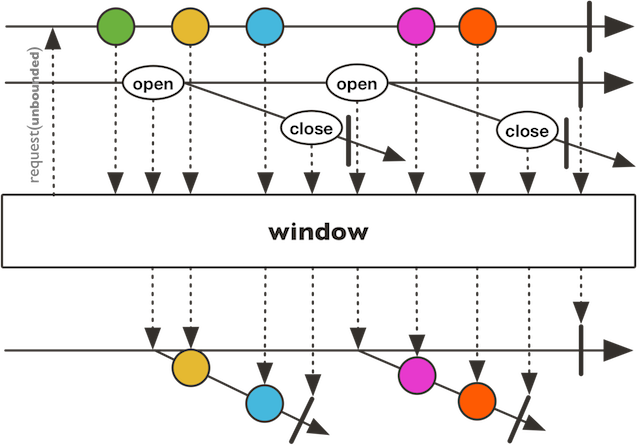
When Open signal is strictly more frequent than Close signal : overlapping windows
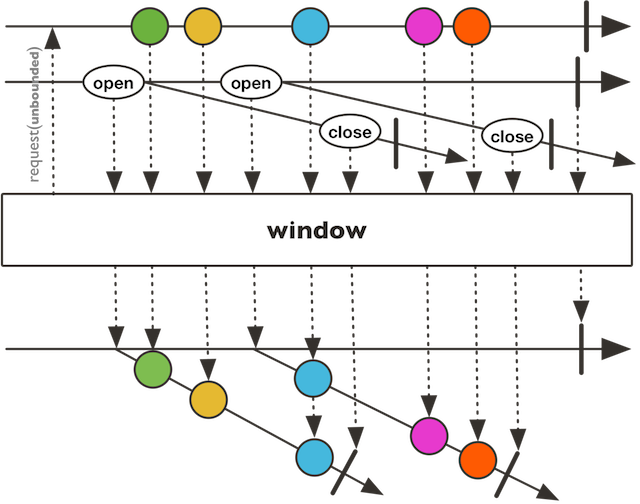
When Open signal is exactly coordinated with Close signal : exact windows

- Type Parameters:
U- the type of the sequence opening windowsV- the type of the sequence closing windows opened by the bucketOpening Publisher's elements- Parameters:
bucketOpening- aPublisherthat opens a new window when it emits any itemcloseSelector- aFunctiongiven an opening signal and returning aPublisherthat will close the window when emitting- Returns:
- a
FluxofFluxwindows opened by signals from a firstPublisherand lasting until a selected secondPublisheremits
-
withLatestFrom
public final <U,R> Flux<R> withLatestFrom(Publisher<? extends U> other, BiFunction<? super T,? super U,? extends R> resultSelector)
Combine the most recently emitted values from both thisFluxand anotherPublisherthrough aBiFunctionand emits the result.The operator will drop values from this
Fluxuntil the otherPublisherproduces any value.If the other
Publishercompletes without any value, the sequence is completed.
- Type Parameters:
U- the otherPublishersequence typeR- the result type- Parameters:
other- thePublisherto combine withresultSelector- the bi-function called with each pair of source and other elements that should return a single value to be emitted- Returns:
- a combined
Fluxgated by anotherPublisher
-
zipWith
public final <T2> Flux<Tuple2<T,T2>> zipWith(Publisher<? extends T2> source2)
Zip thisFluxwith anotherPublishersource, that is to say wait for both to emit one element and combine these elements once into aTuple2. The operator will continue doing so until any of the sources completes. Errors will immediately be forwarded. This "Step-Merge" processing is especially useful in Scatter-Gather scenarios.
-
zipWith
public final <T2,V> Flux<V> zipWith(Publisher<? extends T2> source2, BiFunction<? super T,? super T2,? extends V> combinator)
Zip thisFluxwith anotherPublishersource, that is to say wait for both to emit one element and combine these elements using acombinatorBiFunctionThe operator will continue doing so until any of the sources completes. Errors will immediately be forwarded. This "Step-Merge" processing is especially useful in Scatter-Gather scenarios.
- Type Parameters:
T2- type of the value from source2V- The produced output after transformation by the combinator- Parameters:
source2- The second sourcePublisherto zip with thisFlux.combinator- The aggregate function that will receive a unique value from each source and return the value to signal downstream- Returns:
- a zipped
Flux
-
zipWith
public final <T2,V> Flux<V> zipWith(Publisher<? extends T2> source2, int prefetch, BiFunction<? super T,? super T2,? extends V> combinator)
Zip thisFluxwith anotherPublishersource, that is to say wait for both to emit one element and combine these elements using acombinatorBiFunctionThe operator will continue doing so until any of the sources completes. Errors will immediately be forwarded. This "Step-Merge" processing is especially useful in Scatter-Gather scenarios.
- Type Parameters:
T2- type of the value from source2V- The produced output after transformation by the combinator- Parameters:
source2- The second sourcePublisherto zip with thisFlux.prefetch- the request size to use for thisFluxand the otherPublishercombinator- The aggregate function that will receive a unique value from each source and return the value to signal downstream- Returns:
- a zipped
Flux
-
zipWith
public final <T2> Flux<Tuple2<T,T2>> zipWith(Publisher<? extends T2> source2, int prefetch)
Zip thisFluxwith anotherPublishersource, that is to say wait for both to emit one element and combine these elements once into aTuple2. The operator will continue doing so until any of the sources completes. Errors will immediately be forwarded. This "Step-Merge" processing is especially useful in Scatter-Gather scenarios.
-
zipWithIterable
public final <T2> Flux<Tuple2<T,T2>> zipWithIterable(Iterable<? extends T2> iterable)
-
zipWithIterable
public final <T2,V> Flux<V> zipWithIterable(Iterable<? extends T2> iterable, BiFunction<? super T,? super T2,? extends V> zipper)
Zip elements from thisFluxwith the content of anIterable, that is to say combine one element from each, pairwise, using the given zipperBiFunction.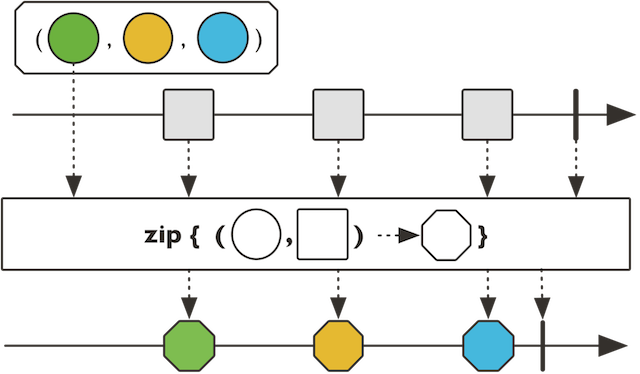
- Type Parameters:
T2- the value type of the other iterable sequenceV- the result type- Parameters:
iterable- theIterableto zip withzipper- theBiFunctionpair combinator- Returns:
- a zipped
Flux
-
onAssembly
protected static <T> Flux<T> onAssembly(Flux<T> source)
To be used by custom operators: invokes assemblyHookspointcut given aFlux, potentially returning a newFlux. This is for example useful to activate cross-cutting concerns at assembly time, eg. a generalizedcheckpoint().- Type Parameters:
T- the value type- Parameters:
source- the source to apply assembly hooks onto- Returns:
- the source, potentially wrapped with assembly time cross-cutting behavior
-
onLastAssembly
protected static <T> Flux<T> onLastAssembly(Flux<T> source)
To be used by custom operators: invokes assemblyHookspointcut given aFlux, potentially returning a newFlux. This is for example useful to activate cross-cutting concerns at assembly time, eg. a generalizedcheckpoint().- Type Parameters:
T- the value type- Parameters:
source- the source to apply assembly hooks onto- Returns:
- the source, potentially wrapped with assembly time cross-cutting behavior
-
onAssembly
protected static <T> ConnectableFlux<T> onAssembly(ConnectableFlux<T> source)
To be used by custom operators: invokes assemblyHookspointcut given aConnectableFlux, potentially returning a newConnectableFlux. This is for example useful to activate cross-cutting concerns at assembly time, eg. a generalizedcheckpoint().- Type Parameters:
T- the value type- Parameters:
source- the source to apply assembly hooks onto- Returns:
- the source, potentially wrapped with assembly time cross-cutting behavior
-
-
